

13 Market Research Tools: Best in Class for 2023

Free Website Traffic Checker
Discover your competitors' strengths and leverage them to achieve your own success
Most market research tools are designed to make it quicker and easier to find relevant data . Whatever the market, product, or purpose, the right research tools can do just that.
But, let’s be honest, some do it far better than others.
Whether you’re an enterprise firm with complex needs and a budget to suit or a smaller business needing free market research tools, read on to discover which online tools for market research are hot right now.
Note: The top market research tools list has been collated using review platforms like G2 , along with direct feedback I collected from over 500 business leaders in June, 2o22.
#1 Best overall market research tool: Similarweb Digital Research Intelligence
Most-loved feature: The Benchmarking tool
We might be a little biased, but this really is the fastest way to see how you measure up against competitors in any sector or location. Analyze market leaders and rising stars to unpack and track their digital success instantly.
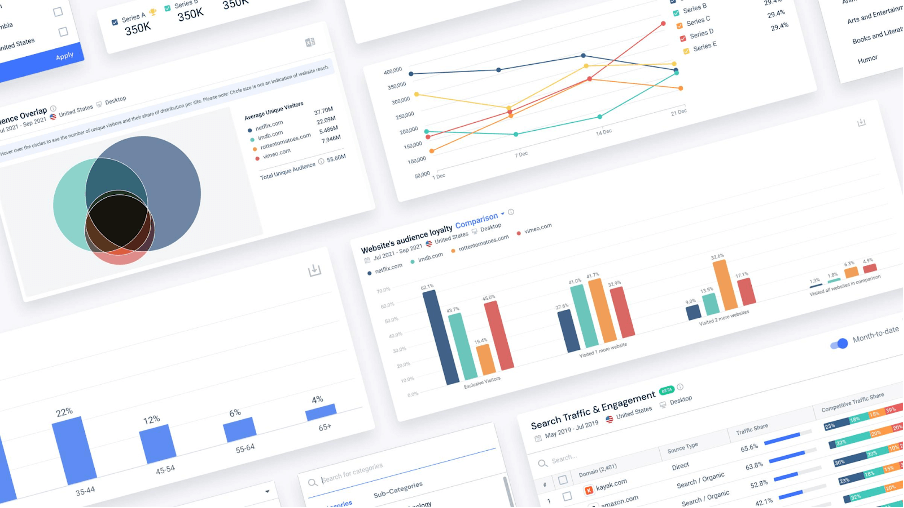
Quick Explainer
Similarweb Research Intelligence is a single source of truth for the online world. Giving any business the ability to quickly analyze the online aspects of any industry or market in an instant. It displays critical insights in a way that makes it easy to view trends, competitive performance, audience insights, growth opportunities, and more. It’s the only market research analysis tool that brings together data from desktop, mobile web, and apps to provide a complete view of the digital landscape.
Key abilities
- Competitive benchmarking
- Market research
- Company research tool
- Audience analysis
- Consumer journey tracker
- Mobile app intelligence
Freemium Version: Yes, there is a lite version of the product that provides limited data for a single user, and a single location.
Free Trial: Yes, there’s a 7-day trial available. Try it out here .
Ongoing Subscription: Yes, you can pay monthly or annually for a subscription. Different levels are available, and each package is tailored. Review pricing and plans for Similarweb here.
Like what you’ve seen so far?
See our market-leading digital research tool in action in this quick 2-minute clip.
#2 Best free market research tool: Think with Google
Most-loved feature: Find my Audience
A way to discover new audiences on YouTube based on things like habits, interests, and intended plans to purchase.
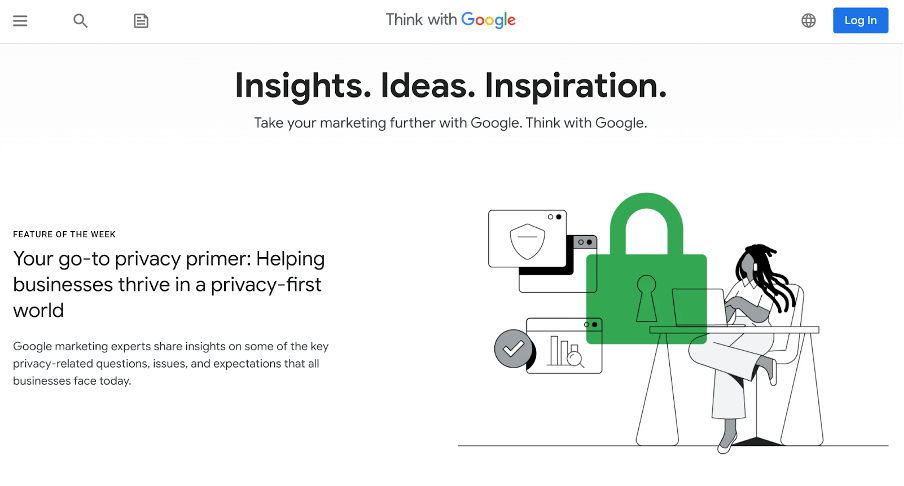
Think with Google is a suite of digital research tools that curate resources from a huge pool of data across the web. It presents them as insights that aren’t typically available elsewhere. It’s a unique way to view trends, insights, and stats. Data isn’t offered in real-time but serves more as a library of figures and facts that take the form of articles, videos, interviews, case studies, and more. In addition to being a place people can go for forward-looking perspectives and data, there are several tools designed to help marketers.
Key functions
- High-level insights into most local or national markets
- Behind the scenes look at cross-platform digital campaigns
- Consumer insights
- Deck-ready stats (not in real-time)
- A range of tools to inform marketing objectives and actions
Freemium Version: The entire suite of market intelligence tools is free.
Free Trial: As a free market research tool, no trial is needed.
Ongoing Subscription: You can subscribe to a newsletter, but not the product.
#3 Best digital research tool for content and FAQ development: Answer the Public
Most-loved feature: Search listening alerts
A pro feature that sends you weekly emails that indicate how search behaviors shift over time. It takes the specific phrase or keywords you’re tracking in the platform and updates you weekly.
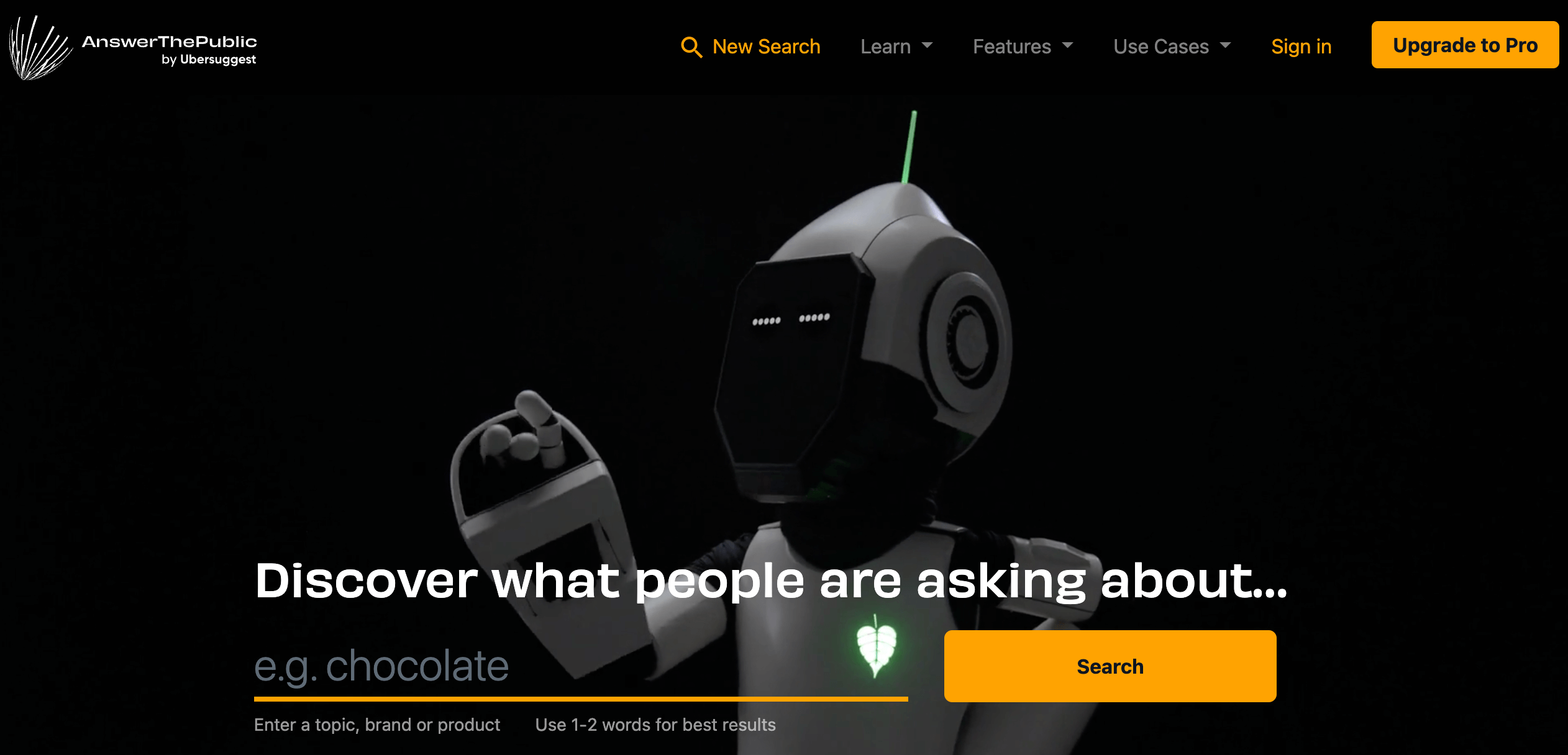
Quick Explainer
Discover the questions people are asking online about key terms, products, or services. It’s designed to help content teams and website owners develop new content ideas, and relevant FAQs that are based on the types of queries people ask online.
- Track important keywords and phrases
- Get weekly emails about changes in search behavior
- Enter any keyword to uncover relevant questions or search terms
- Folders to help organize your research
Freemium Version: Yes. You get a limited number (3) of searches per day.
Free Trial: No.
Ongoing Subscription: Yes. You can pay monthly or annually for this service. Pay-monthly fees are a flat rate of $99. Discounts are offered for yearly subscriptions.
#4 Best tool for market research surveys: SurveyMonkey
Most-loved feature: Question bank
A library of hundreds of questions, pre-written by survey methodologists.

As far as market research surveys go, it’s the leading online research tool for surveys worldwide. With plans to suit the individual through to the enterprise, it’s a feature-rich, easy-to-use platform that encompasses creation, collection, and analysis under one roof. Surveys are optimized for any device and integrate with platforms like Zoom, Salesforce, Marketo, and more.
Key functions
- Create and send unlimited surveys, quizzes, and polls
- Pop-up online surveys
- Mobile app access to create, send and analyze surveys on-the-go
- Team collaboration function (unlocked with a team plan)
- Survey builder
- Customization and branded surveys (available with advantage or premier plans only)
Freemium Version: Yes
Free Trial: Occasionally, free trials are offered for premium plans.
Ongoing Subscription: Yes, you can pay annually or monthly. There are three different plans to choose from, ranging from $25 to $129 per month.
Helpful: Check out our blog and see 18 different ways to use market research surveys .
#5 Best online research tool for marketplaces: Similarweb Shopper Intelligence
Most-loved feature: Cross-shopping analysis
Cross-shopping analysis shows you how loyal a segment of customers is to a brand, along with what other brands they browsed or bought from. Uncover competitors and discover new partnership opportunities; these are game-changing insights if you sell on any marketplace.
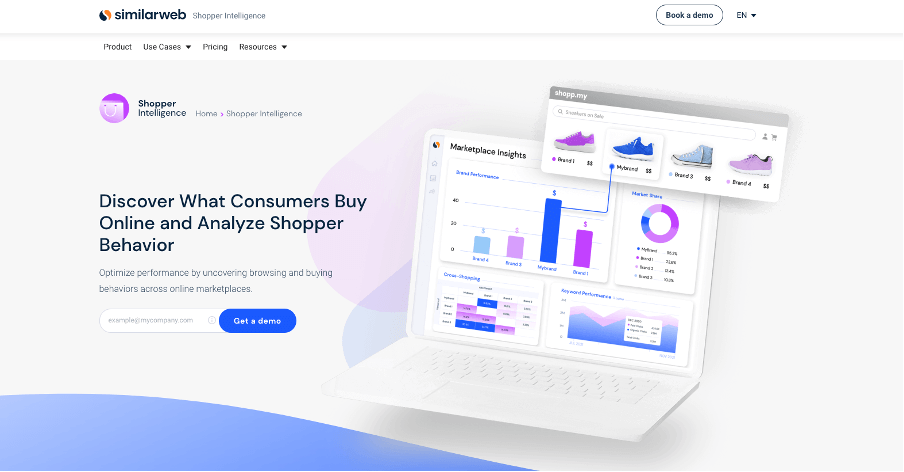
Similarweb Shopper Intelligence is a type of online market research tool that helps you uncover and analyze browsing and buying behavior across marketplaces. Using its data, businesses can track category, product, and brand performance with ease. It helps ecommerce organizations to detect potential threats, unearth new product or category opportunities, discover new potential partnerships, and optimize search strategy and performance.
- Monitor consumer demand for any product, brand, or category
- Retail search strategy optimization
- Consumer behavior insights
- Track cross-shopping, loyalty, and purchase frequency
- Analyze brand awareness
Note: This solution uses a unique data methodology via multiple networks and partnerships. At the time of writing, there is no other consumer behavior insights tool for market research that offers this quality of data for marketplaces.
Freemium Version: No.
Free Trial: Yes. There is usually a 7-day trial available here .
Ongoing Subscription: The price is determined by things like the number of categories and/or domains you want to access. Each quote is customized to a client’s specific needs.
Want to know a little more?
Watch this quick clip to see the best ecommerce digital market research tool in action.
#6 Best market research tool for brand tracking: Latana
Most-loved feature: MoE (margin of error) Readings
To deliver transparency on data confidence levels, Latana’s dashboard includes a feature that allows clients to toggle-on, or toggle-off, margin of error (MoE) readings on all data points. These are highlighted using a traffic-light system of confidence (red=low confidence, orange=medium confidence, and green=high confidence). This small feature makes a big impact — it helps clients to correctly interpret the data and to visibly see quality shortcomings.
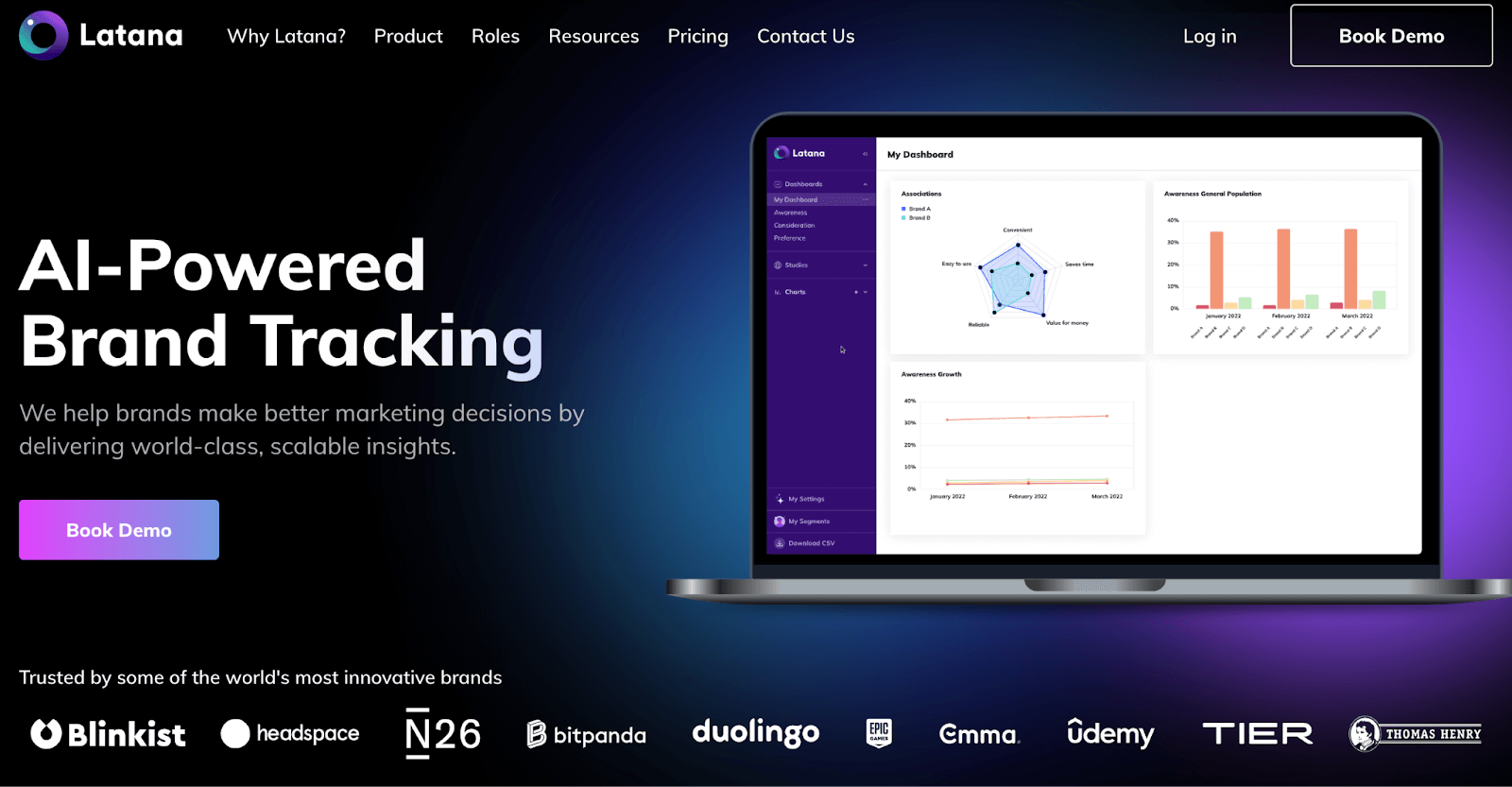
Latana is a B2C brand tracking tool that provides granular insights about online audiences. It helps organizations understand how key segments of consumers feel about brands and portrays relevant standings vs. industry rivals.
- Focus on niche consumer segments that matter to your business
- Uncover rival’s audience data and identify opportunities to grow
- Understand brand perception, and track how it changes over time
- Discover the most well-known brands in your industry
- Track rival’s brand awareness across gender, age income, location, and education
- Find out the main purchase drivers for your industry
- Infrastructure gives reach to over 6 billion smartphone users globally for representative brand opinions
I caught up with Latana’s CMO, Angeley Mullens. Here’s what she has to say about their offering.
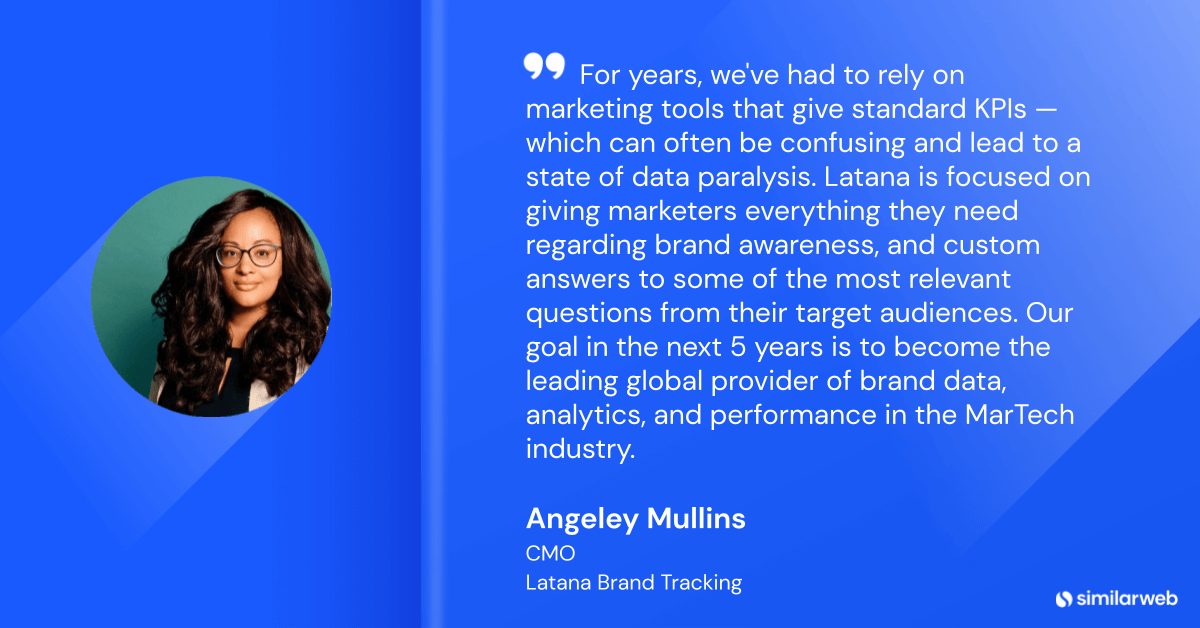
Ongoing Subscription: Pricing for Latana isn’t available online. All packages are tailored to individual brands and their specific needs.
Enjoy 360 Visibility 24/7
Get the data you need to adapt to market changes and industry trends in an instant.
#7 Best research tool for social media listening: Hootsuite
Most-loved feature: Multi-channel insights
It’s a legacy feature, but one which makes it the best online research tool for social listening and monitoring. Having the ability to easily schedule posts, ad campaigns, and handle responses for every social media channel from within a single platform is what makes this a market-leading digital research tool.
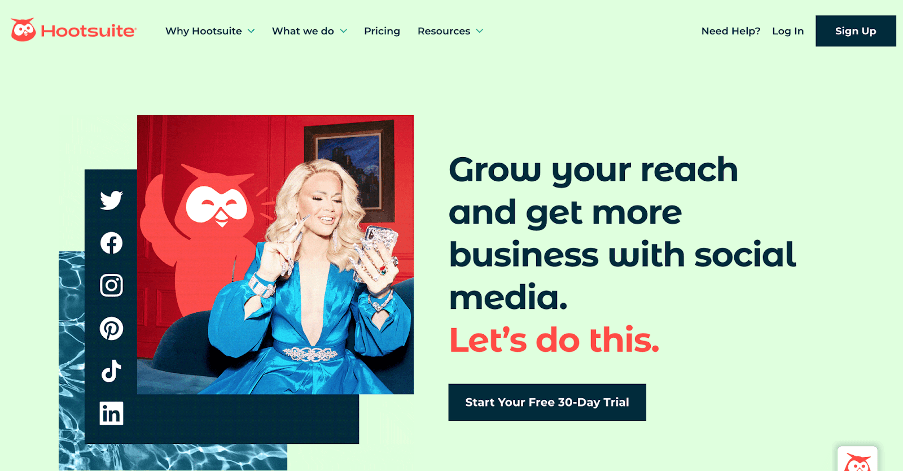
Hootsuite continues to claim the number 1 spot on G2’s list of digital research tools for social media monitoring . It’s a tool to help you manage all aspects of business social media, across multiple channels, in a single platform. As well as being able to manage your socials, it also keeps you up-to-date with the latest trends and activities of your rival’s social media channels.
- Publish and schedule social media posts
- Measure cross-platform results
- Message management
- Social media trend analysis
- Social media ad-campaign management
Freemium Version: Yes. You can get a free version that supports 2 social accounts and 1 user.
Free Trial: Yes. A 30-day free trial is available here .
Ongoing Subscription: There are four plans; professional, team, business, and enterprise; ranging from $49-$739.
#8 Best digital research tool for prospecting: Similarweb Sales Intelligence
Most-loved feature: Insights generator tool
The insights generator shows you unique facts for your prospects and accounts; with complete visibility into their digital strategy and performance. It’s ideal for refining sales and marketing efforts while staying focused on growth.
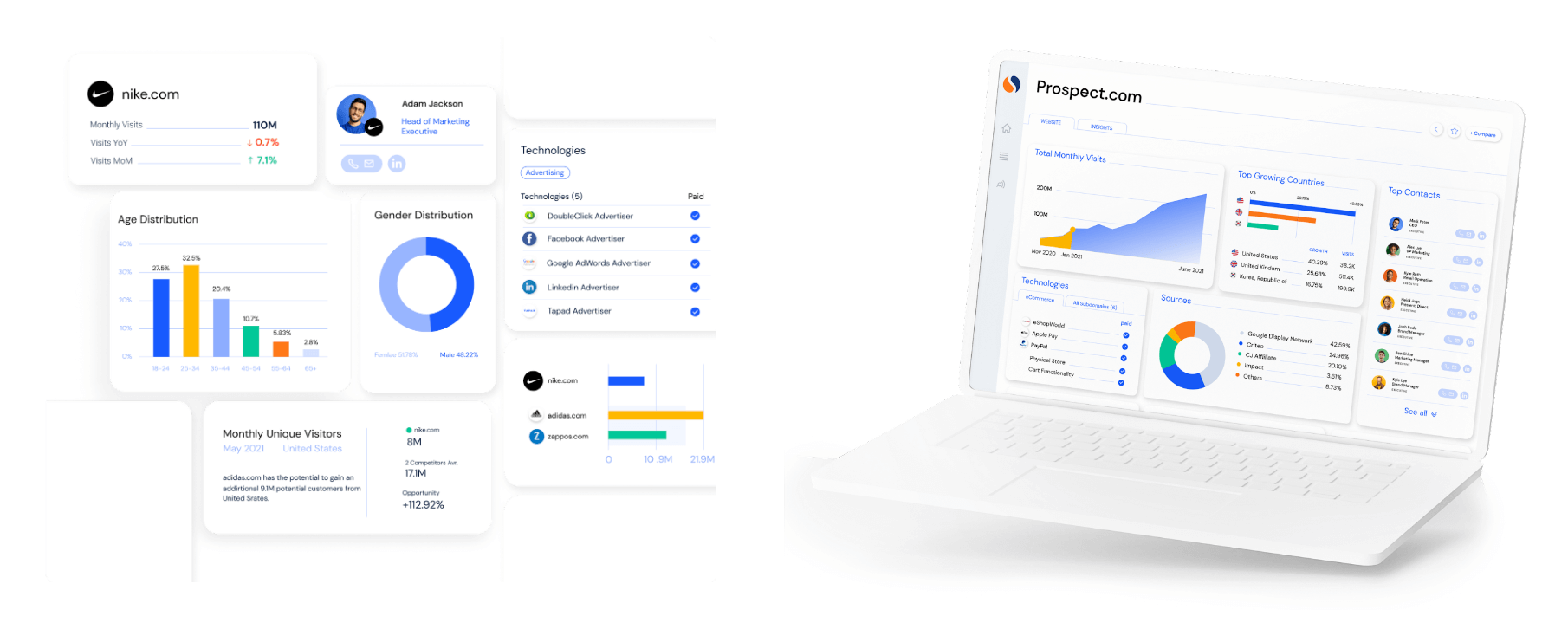
Similarweb Sales Intelligence helps organizations find viable prospects by showing you who to reach out to, when to do it, and how to capture their attention. The lead generator tool helps you find the right prospects, and key insights help create engaging outreach emails. For sales departments, ecommerce and mar-tech sectors, this type of digital research tool can take prospecting and engagement to a completely new level; along with revenue and growth.
Key functions:
- Lead generation and enrichment
- Digital insights for 100M+ ecommerce websites, publishers, and advertisers
- Fraud detection
- Sales engagement
- SFDC integration
Free Trial: Yes, if you would like a free trial, please request that here.
Ongoing Subscription: Prices for this digital market research tool varies depending on the package and options chosen. Grab a live demo of the product and get a tailored quote here .
Insightful : If you’re looking at market research tools for the ecommerce industry, bookmark our Ecommerce Trends and Predictions for 2023 to read later.
#9 Best market research analysis tool for data visualization: Tableau
Most-loved feature : Connects to almost any data source

As a clear market leader, and a no-brainer for larger organizations with business intelligence analytics and teams. Tableau leads the way in online research tools for data visualization . It connects to a huge range of data sources and pulls information into a highly-appealing dashboard that is designed to make it easier and faster to explore and manage data . It takes data from platforms like Similarweb, then combines it with other data sources before presenting crisp, clear, insights that have the power to shape strategies and drive key transformations.
- Lightning-fast analytics
- Smart dashboards for richer insights
- Live connection to almost any data source, with automatic updates
- Drag-and-drop style UI: easy to use
Freemium Version: No. However, students and teachers get a year’s free access to the platform.
Free Trial: Yes. You can subscribe to a free 30-day trial.
Ongoing Subscription: Most plans are offered annually, with prices ranging from $15 per month upwards. The price depends on whether you use their hosted or on-premise versions, the number of users, and the inclusion of specific plugins.
#10 Best market research tool for UX testing: Loop11
Most-loved feature: Online usability testing
This feature analyzes the usability of a website with users performing live tasks on a site. It helps you understand user behavior, and shows how and why a website is used.
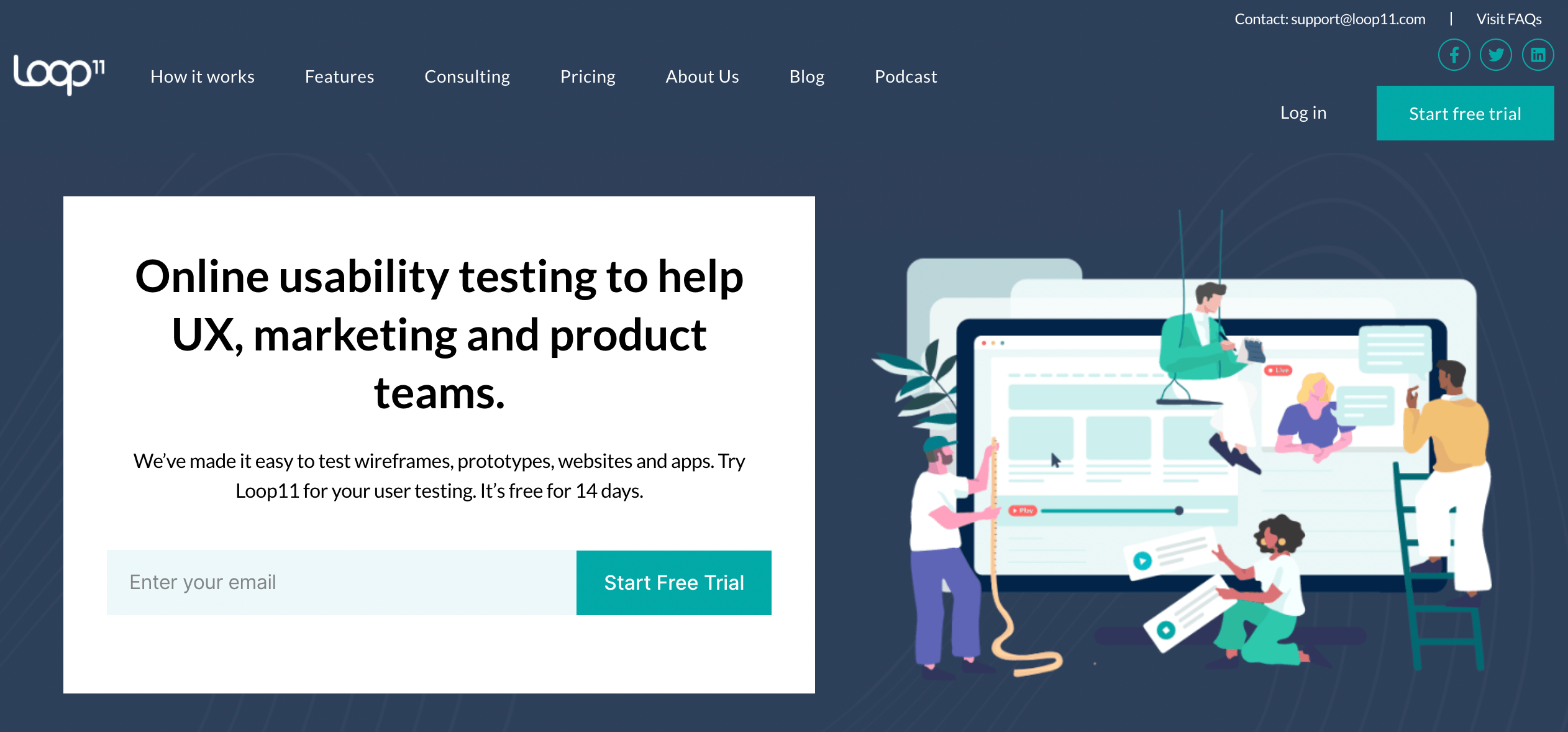
Loop11 is a market research tool that provides usability testing to help organizations build better websites and products. It comes with a pack of useful features that provide both moderated and unmoderated testing, helping businesses to find the right audience to test prototypes and products. It’s designed to help you see how appealing a product is to a particular audience, determine their preferences, then build these insights into a design.
- Ability to test across multiple devices, including tablet, mobile, or desktop
- User-friendly test builder that requires no coding
- Easy-to-add surveys that collect psychographic and demographic data
- Provides useful metrics like time on task, task completion rates, and NPS
- Mapping of customer journeys during a test period
Free Trial: Yes, a 14-day trial is available here .
Ongoing Subscription: All plans come with the option to pay monthly or annually. Prices range from $199-$599 per month.
#11 Best research tool for measuring customer experience: Temper
Most-loved feature: Rating stream
See real-time feedback as customers respond to questions via website or email channels. The stream provides a detailed view of ratings, comments, locations, referrers, email addresses, and more.
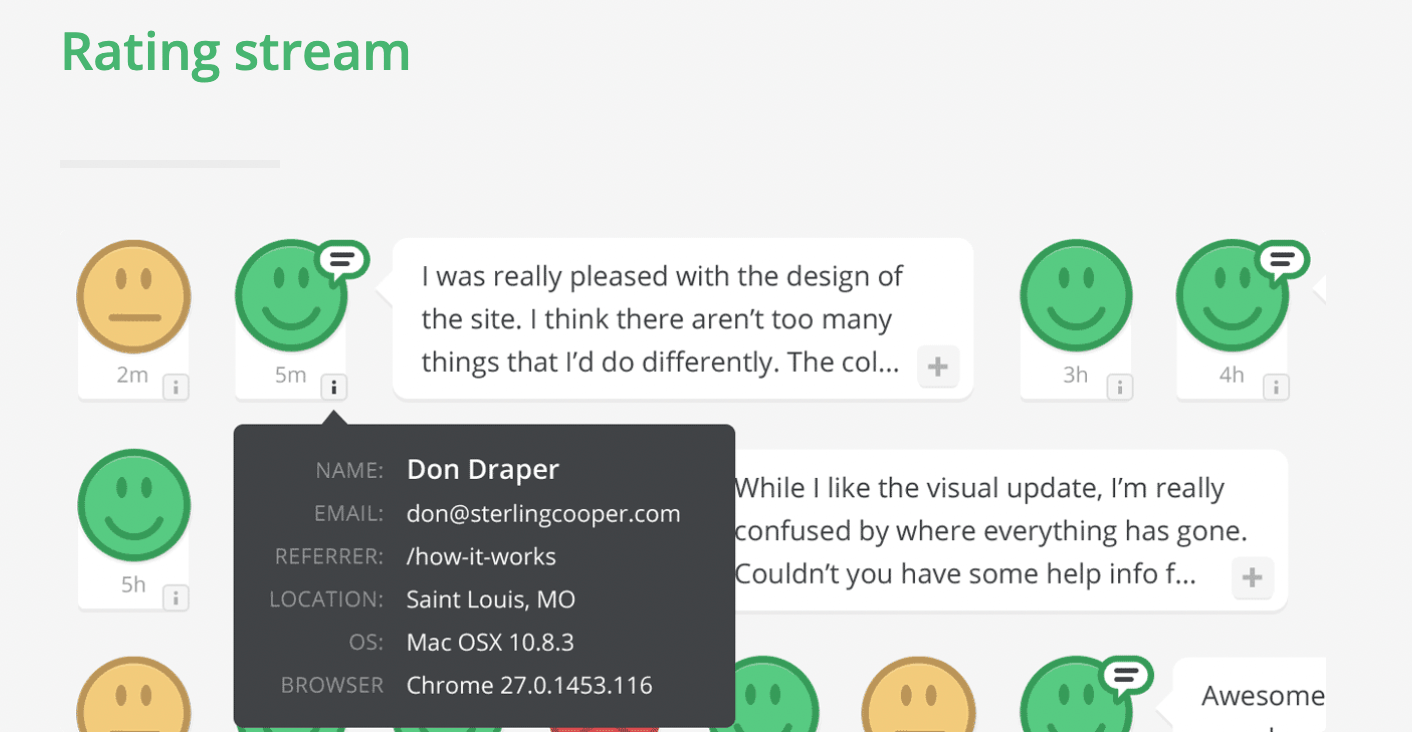
Temper allows any company to find out how customers feel about their product at all times. It directly provides first-party data to a business, preventing the need to design and distribute complex surveys. It can be placed as a widget on the site or in emails, and questions are asked to gain real-time feedback from visitors and customers alike.
- Easily deploy questions across website and email channels
- Quickly spot poor experiences to identify problematic areas of a business or product
- The rating graph gives you a real-time view of results for any question asked
- Public rating wall shows how you’re performing, instilling confidence and trust
- Ratings come with open text fields to give additional context to responses
- Referrer data gives you the ability to segment feedback and relative performance
- Tracking variables let you send data with ratings, such as order numbers, user IDs, etc.
- User targeting lets you determine who sees questions and how often they see them
Freemium Version: There is no freemium version. However, their hobby plan gives you a slimmed-down version of the product and costs $12 per month.
Ongoing Subscription: Four plans are available, ranging from hobbyist to enterprise. The lowest pricing tier starts at $12 monthly, and their top-tier solution costs $199 monthly. All plans are pay-monthly, with a 60-day money-back guarantee.
#12 Best online market research tool for focus groups: Remesh
Most-loved feature: Common topics
In just a few clicks, you can view the themes and topics that are most common with your focus group across an entire session. It groups similar responses, specific phrases, and interesting responses in seconds.
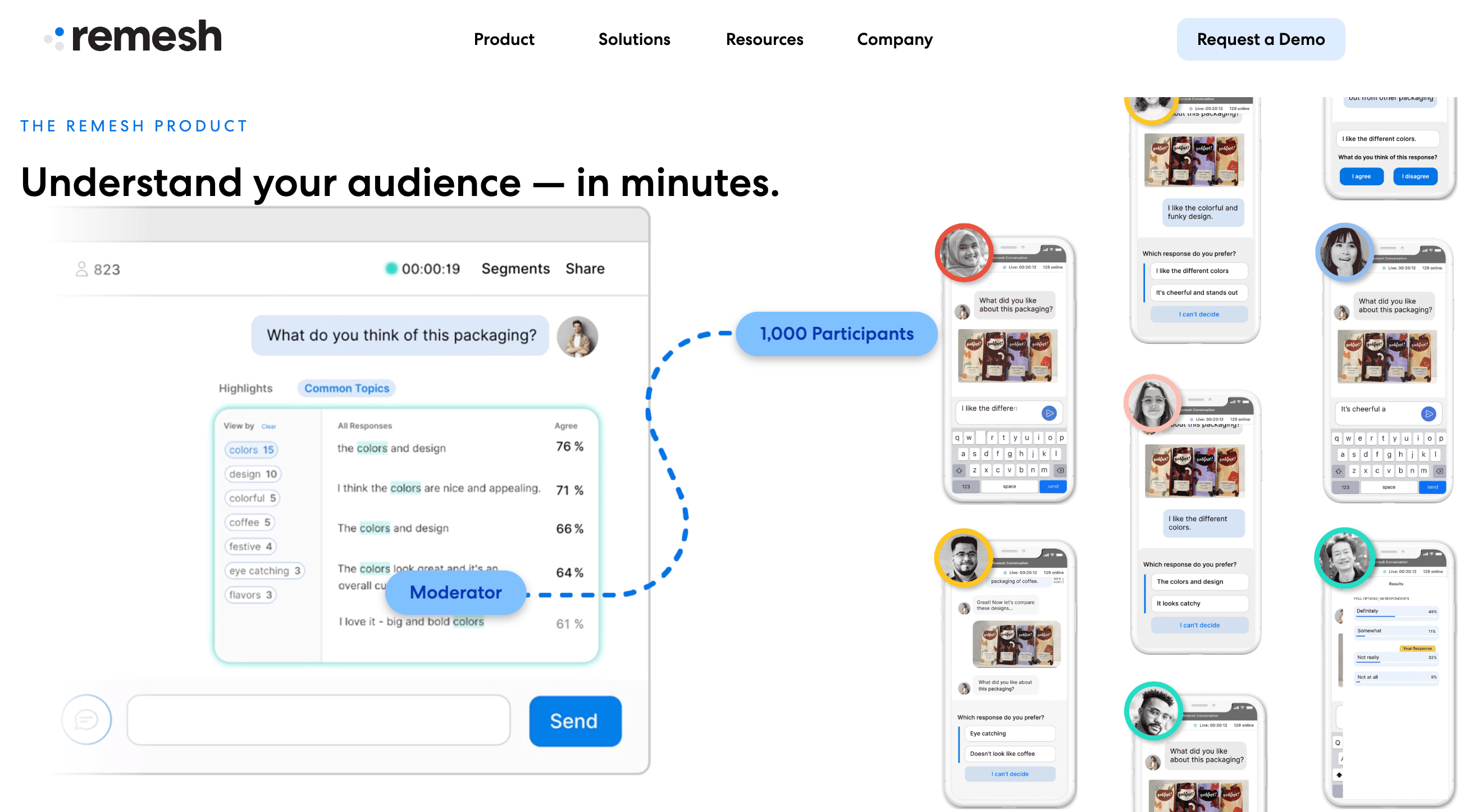
Remesh facilitates live, qualitative conversations with focus groups of up to 1000 people at a time. Replicating the focus group format online delivers powerful segmentation and dynamic capabilities that speed up your time to insight and let you hold a real-time conversation at scale.
- Launch a live conversation with up to 1000 people at a time
- Organize and analyze responses in an instant
- Segment your audience based on demographic and response data
- Share visuals and text-based content with the group to get instant feedback
- The algorithm analyzes open-ended responses in real-time
Freemium Version: No
Free Trial: Yes. However, you must first book a demo with a member of their team.
Ongoing Subscription: Remesh provides custom pricing plans that can only be obtained once you’ve taken a demonstration of their platform with a member of their team.
#13 Top collaboration and documentation tool for market research: BIT.AI
Most-loved feature: Content library + smart search
While it sounds quite basic; in essence, this tool for market research professionals makes it quicker and easier to keep track, share, and store key data. Forget trawling through emails, slack, and g-docs to find files; the smart search feature helps you locate files in an instant.

A dynamic platform that helps researchers collaborate, track, share, and manage research data in a single place. This is one of the best online market research tools for those who need a place to bring together resources like websites, PDFs, articles, images, infographics, blogs, reports, videos, etc. it’s low-cost and connects to some of the most widely used tools. Being able to share multidimensional data with others, or simply keeping track of secondary market research in a single place makes it a firm favorite.
- Over 100 integrations with applications like Tableau, Miro, G-docs, Onedrive, and more
- Real-time editing and live collaboration
- Content Library
- Smart search
- Supports a huge range of content and file types
Freemium Version: Yes. Available for teams of up to 5 collaborators.
Free Trial: Yes, a free trial is available here .
Ongoing Subscription: A range of packages are available, costing between $8-$20 monthly.
Best market research tools for startups
There is another often-forgotten set of tools used for market research that are ideal for startups. If you’ve got zero budget and a little time on your hands, you can do most types of desk research for free. Sources include:
- Company reports, case studies, and whitepapers
- Research and trade associations
- Media coverage
- Internal sales or usage reports
- Academic or scientific journals
- Government and non-government agencies
- Public library records
- Competitor websites
- Educational institutions
Helpful: Check out this article about how to do market research for a startup .
Wrapping up….
With cost and time key considerations for anyone looking at tools for market research, it’s vital to choose wisely. While free market research tools are all good and well, they won’t always serve you when you’re on a deadline or require key insights on a specific competitor, market, or product.
Similarweb helps companies win in the digital world. Whatever the market, goal, or business size, its solutions are designed to help organizations understand their market and compete and beat rivals.
Take it for a test run today. Trial any Similarweb solution free for the first 7-days using this link .
Need to know more about the ROI of Similarweb?
What are the best market research tools for secondary research?
The internet is probably the best tool for market research there is. It’s a goldmine of secondary market research data. But beware of data validity and check your information is coming from a trusted source.
What are the best market research tools for surveys?
Survey monkey is considered the best online market research tool for surveys, but key players like Typeform and Zoho follow closely behind. Budget and features usually determine the right tool for your needs.
What are the best free market research tools?
The best free tools for market research include: Answer the Public, Think with Google, Similarweb lite, SurveyMonkey’s basic plan, and Hootsuite’s free plan.
What are the best market research tools for qualitative research?
Qualitative research includes things like focus groups, open-ended surveys, case studies, and observation research. As such, the best tool for online research like this would be something like BIT.ai’s documentation and collaboration tool. Another useful tool for qualitative market research would be an online survey provider, like SurveyMonkey, Typeform, or Google Forms.
What are the best market research tools for quantitative research?
As this type of research is focused more on numbers, the best quantitative market research tools include things like Similarweb Digital Research Intelligence and Tableau. Each performs a different function but works together to collect, analyze, and present data in the most useful way possible.

by Liz March
Digital Research Specialist
Liz March has 15 years of experience in content creation. She enjoys the outdoors, F1, and reading, and is pursuing a BSc in Environmental Science.
Related Posts

Importance of Market Research: 9 Reasons Why It’s Crucial for Your Business

Audience Segmentation: Definition, Importance & Types

Geographic Segmentation: Definition, Pros & Cons, Examples, and More
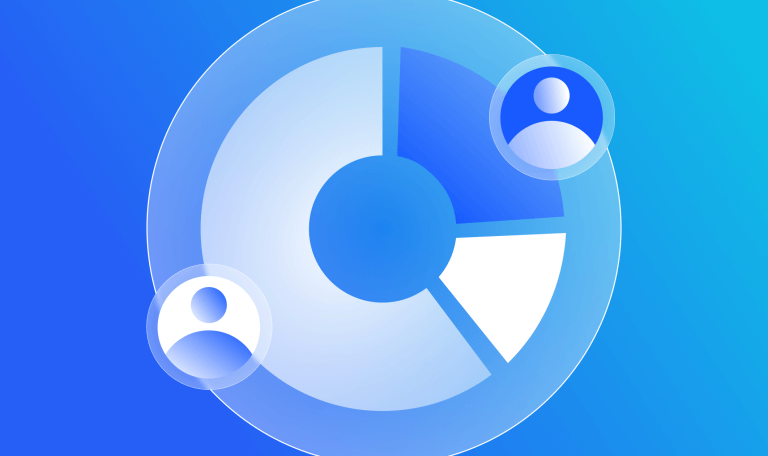
Demographic Segmentation: The Key To Transforming Your Marketing Strategy

Unlocking Consumer Behavior: What Makes Your Customers Tick?
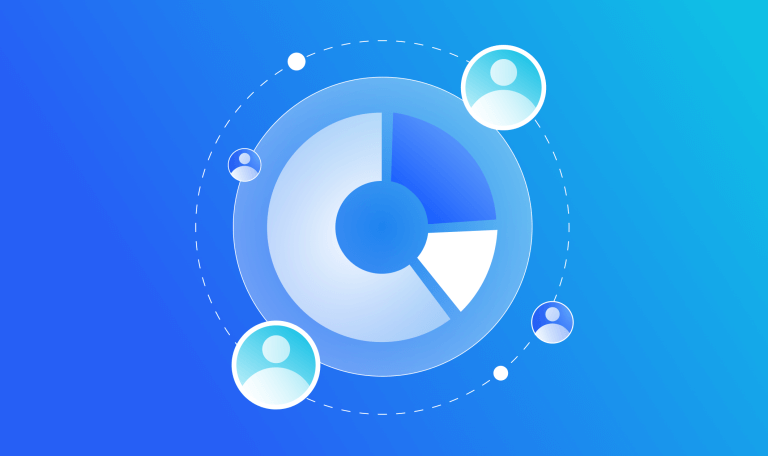
Customer Segmentation: Expert Tips on Understanding Your Audience
Wondering what similarweb can do for your business.
Give it a try or talk to our insights team — don’t worry, it’s free!
15 Best market research tools in 2024
Last updated
3 April 2024
Reviewed by
Whether you're launching a new product or service, looking to increase customer engagement, or boosting brand loyalty, it’s always necessary to turn to data and insights to understand what’s going on. This research can give a picture of current and potential customers in the marketplace and help validate an action you want to take to increase sales.
Fortunately, we’ve done the hard work to find some of the best research tools to use in 2023. Let’s explore!
Market analysis template
Save time, highlight crucial insights, and drive strategic decision-making
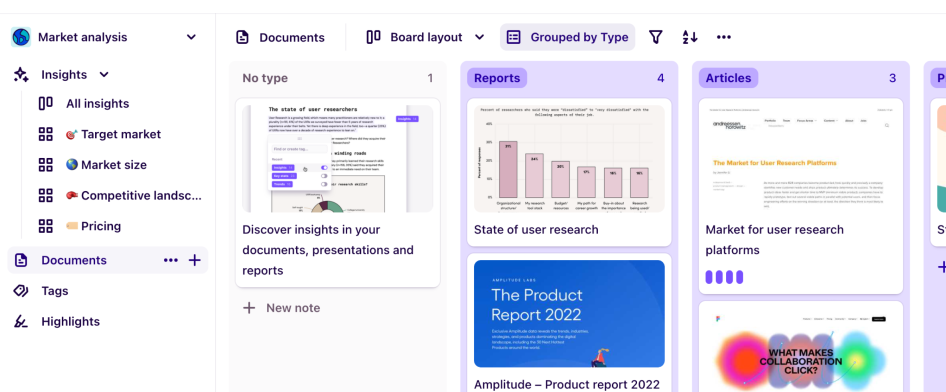
- What are market research tools?
Market research tools are designed to simplify the process of gathering, storing, and understanding data and information.
They can help a team to clearly identify a market for their product or service, as well as gain key feedback from current and potential customers .
A broad range of market research tools is useful at various stages of the research process. Some tools help speed up the process of gathering data. Others are helpful once you’ve collected data, as they allow you to easily view and manage information and then draw valuable insights.
Ultimately, market research tools can help make the research process easier and more straightforward.
- Why are market research tools important for business?
The right market research tools in a business can streamline the research phases while helping to ensure a new product or service succeeds.
There are a range of ways market research tools can help businesses. These include:
Reducing manual processes . Manual research tasks can be highly time-consuming for teams. Tools can reduce the time it takes to complete research tasks, helping move projects forwards.
Increased accuracy . With large amounts of data, it’s easy for people to make mistakes. The wrong insights, after all, can prove highly damaging for a business. However, the right tool can improve the accuracy of data collected, ensuring that you base your decision-making on facts.
Removes bias . When teams rely too heavily on assumptions, they miss the chance to discover what users are really thinking and feeling. By relying more on market research tools, you reduce bias from team members and gain clarity on what the research is showing.
Faster data collection . Collecting data can take a long time and involve multiple team members. With the use of tools, there’s the chance to automate many tasks, making the process much faster and simpler.
Better accessibility . Outsourcing market research to independent firms can be time-consuming and costly. However, a business might not have the resources to conduct, collate, and draw meaningful insights from research. Market research tools better enable businesses to conduct research without person power—making the process accessible even to a small business.
- Types of market research tools
Market research tools are becoming increasingly common. Choosing the right tool(s) will depend largely on your needs, goals, and overall business strategy.
Before deciding, it’s helpful to consider the different types of tools and how they might help your research.
The most common types of research tools include:
Customer relationship management (CRM) software
CRM tools record key customer data to help build a picture of customer engagement and loyalty. This is very useful as a deep understanding of your customers is essential when releasing new products , services, and features.
Survey tools
Surveys are one of the most common research techniques, as they help a business team deeply understand what customers want and need. Survey tools can hasten the process of gathering data, increase the chances of completion, and improve accuracy.
Data analysis software
Data tools can help you efficiently collect and store data. They’re also helpful for analyzing that data and quickly gaining valuable insights from a vast range of sources.
Social media monitoring
Social tools help businesses to draw insights about social campaigns and statistics to drive interest online. They can also analyze trends and allows teams to understand their current and potential customers better.
Competitive intelligence tools
Competitor tools help a team to understand what their competitors are doing. By analyzing competitors' profits, sales, trends, and customers, you gain a better chance to understand market needs and wants, giving you the opportunity to offer something new and innovative.
Business intelligence tools
To help businesses plan more accurately, business intelligence tools help with forecasting, goal setting, and business strategies.
- The best market research platforms and tools for accurate analysis
Below are some of the best market research tools in 2023.
Accurate market and consumer data should drive business decisions—not assumptions made by teams.
That’s where Statista can help. Statista is an online platform focused on consumer and market data. With access to data from 150+ countries and regions, their market insights help stakeholders to forecast growth, revenue, sales, and more.
You can also find trending statistics, current popular topics, and expert research, which can all build a deep understanding of your market.
Statista offers their starter plan at $39 per month, though they do have a free introduction plan to allow users to get to know the platform first.
SurveyMonkey
Surveys are an important market research tool. They give your customers, or potential customers, a chance to make their voices heard. Those insights are ones a business can act upon to make improvements and release better products or services.
SurveyMonkey enables business teams to quickly create and send surveys, quizzes, and polls through email, web links, or embedded forms. From there, they can receive responses from key people, gain insights, and take action on feedback.
The platform has hundreds of templates to choose from, meaning that you don’t have to build a survey from scratch or need any design nous to get started.
SurveyMonkey also offers a free option, which caps surveys at ten questions. This is an attractive option for small businesses and teams wanting to start conducting surveys.
Google Trends
Curious about what people are or aren’t interested in at the moment? Jumping on trends and creating things that are wanted now is one important way to secure market share.
Google Trends is a tool that anyone from a journalist to a business founder or UX Specialist can benefit from. It visualizes what search terms people are using on the internet, almost in real time.
The tool has featured insights, a search engine option to see what’s currently popular, and the chance to dive deeper into data. You can also compare one topic to another to see the interest over time—with information dating back to 2004.
Regardless of what you’re developing, Google Trends is a tool every team releasing new products can benefit from. Even better, it’s a free tool, making it accessible to all.
Marketing revenue engine SpyFu helps businesses to understand and take the guesswork out of search engine optimization (SEO) and pay-per-click (PPC) marketing.
Through competitor analysis , rank tracking, and keyword research, SpyFu helps companies create content with better SEO. And with a Google Ads analyzer, ad templates, and competitor analysis, they can also boost success with marketed ads.
SpyFu also has competitor software that allows customers to see ranks, ads, backlinks, and keywords to better understand the competition. To help stakeholders to track and improve success, they also provide detailed reporting tools.
Basic plans for SpyFu start at $16 per month with options to upgrade for greater access.
Designed with public relations professionals and content marketers in mind, BuzzSumo enables users to see what’s in the news, find trends, track company mentions, and gain ideas for new content.
The tool helps people to discover popular content, uncover top stories from competitors, and see what their customers are interested in. It also allows stakeholders to quickly react to negative mentions, competitors' comments, or industry announcements.
With a huge library of data and content, BuzzSumo is a powerful tool popular with creatives and marketers alike.
The tool does come at a price, with a single-user plan costing $119 per month.
Think With Google
Think With Google provides key data and insight to help businesses understand shifts in beliefs, behaviors, and needs in geographic regions.
These consumer insights and market trends can provide interesting perspectives for the forecasting and planning of marketing strategies.
Using Think With Google can boost business ideas, drive business decisions, and help marketers succeed in a competitive marketplace. And similar to Google Trends, Think With Google is a free tool.
Completing a survey isn’t always a fun or desirable activity for a busy potential or current customer. Surveys take time to fill out, and many customers would prefer to get on with their day.
With that in mind, Typeform created people-friendly surveys, forms, and quizzes that are enjoyable to complete.
With dedicated designs that aren’t only aesthetically pleasing but simple to use, stakeholders can create something unique and appealing for consumers without the need for design work.
Typeform also has a video feature to allow more in-depth questions—something that can be very useful for some projects.
A basic plan with Typeform starts at $25 per month.
Semrush helps companies improve their SEO, PPC, competitor research, and content marketing.
It does this by offering SEO audits, actionable tips, traffic analysis, and a keyword research tool to drive successful marketing. It’s also a social media scheduling tool with post analysis to boost successful social marketing.
When it comes to competitor research, Semrush also provides competitor analysis through tracking and assessing other websites, visibility on competitor promotion strategies, and access to keyword and backlink gaps, which you can use to grow market share.
Semrush’s base plans start at $119.95 per month.
US Census Bureau
When developing new products and services, you want to get as much information about your target market as possible. What better way than looking at the Census Bureau data?
The Census data gives accurate and detailed information about the American public and economy, which is critical to understanding the potential market for a product or service. This sort of data gives you the ‘big picture’ of your customer base and is often the backbone or initial supporting data for your market research project . Participation in the US Census is mandatory, ensuring that you have access to a huge dataset of accurate information.
It does have some limitations. Given the Census is only taken every ten years, the information can become outdated quickly. Also, it may not be specific or detailed enough to relate to your particular project.
But given it’s free for all to access, it’s a great starting point for general research.
Competitor analysis is an essential part of any successful market research journey. Similarweb allows users to analyze any website or app to understand how competitors are positioning themselves in the market by measuring their digital traffic.
Insights include total visits, global rank, country rank, pages per visit, and bounce rate. Within the platform, you can also easily find similarly ranked sites to compare and contrast to your own.
Importantly, Similarweb provides traffic and engagement analysis with demographic information, other visited websites, and audience interests. This provides a vast amount of information to accurately compare your website and app with competitors, giving you a much clearer picture of what your customers are interested in and where you stand in the marketplace.
Similarweb offers plenty of free tools and business quotes for those interested in paid plans.
Business intelligence tool, Tableau, is designed to help companies gain helpful insights from data. Those insights can drive business decisions, generate accurate planning, and improve forecasting.
A visual analytics platform, the tool is useful for data management, visual storytelling, and collaboration between team members.
With a dedicated dashboard, providing a range of key analytics, discovering how your business is performing (and where it could do better) is straightforward. They also offer end-to-end data for a complete picture.
Individual plans with Tableau start at $70 per month.
Facebook Audience Insights
For some businesses, Facebook advertising drives campaigns, boosts sales, and grows customer engagement.
Facebook Audience Insights help business owners discover more than just what their competitors are doing. The tool provides aggregated information to show data from those who are already connected to the business and another set to provide information about those generally on Facebook. This key information can drive awareness of new customers and increase the chances of boosting interest and growing a customer base.
Specifically, Facebook Audience Insights provides demographic information, key interests, and lifestyle data to build a picture of your current and potential customers . Even better, the tool is free to use.
Question and answer platform, Quora, isn’t technically a research tool. Because it holds an incredible amount of information, it can help content marketers and product developers uncover key topics of interest.
This platform is also free for everyone to use.
BrandMentions
When wanting to increase brand loyalty and engagement—not only do you need an accurate tool to track that data—you also need to understand who’s talking about your business and where.
BrandMentions does just that. The tool helps businesses manage their brand reputation, acquire new customers, and retain current ones, all while engaging with customers and key influencers.
With BrandMentions, it’s simpler to accurately measure the success of campaigns, track social media mentions and performance, measure brand performance, and monitor hashtags.
Plans with BrandMentions start at $99 per month.
The list wouldn’t be complete without mentioning Dovetail. Dovetail ensures that you can store customer research , feedback, and insights in one streamlined place—all to empower your team with accurate decision-making.
Regardless of whether the user data came through a survey, a focus group, usability testing , or product feedback, Dovetail also enables you to analyze your market research data and generate insights that can help you understand your customer and competition.
The platform also has templates for anything from analyzing competitors to gaining feedback or running an employee engagement survey . Dovetail can help you complete research that’ll have a real impact.
Should you be using a customer insights hub?
Do you want to discover previous research faster?
Do you share your research findings with others?
Do you analyze research data?
Start for free today, add your research, and get to key insights faster
Editor’s picks
Last updated: 3 April 2024
Last updated: 30 April 2024
Last updated: 13 May 2024
Last updated: 22 July 2023
Last updated: 26 July 2024
Last updated: 22 August 2024
Last updated: 10 August 2024
Latest articles
Related topics, .css-je19u9{-webkit-align-items:flex-end;-webkit-box-align:flex-end;-ms-flex-align:flex-end;align-items:flex-end;display:-webkit-box;display:-webkit-flex;display:-ms-flexbox;display:flex;-webkit-flex-direction:row;-ms-flex-direction:row;flex-direction:row;-webkit-box-flex-wrap:wrap;-webkit-flex-wrap:wrap;-ms-flex-wrap:wrap;flex-wrap:wrap;-webkit-box-pack:center;-ms-flex-pack:center;-webkit-justify-content:center;justify-content:center;row-gap:0;text-align:center;max-width:671px;}@media (max-width: 1079px){.css-je19u9{max-width:400px;}.css-je19u9>span{white-space:pre;}}@media (max-width: 799px){.css-je19u9{max-width:400px;}.css-je19u9>span{white-space:pre;}} decide what to .css-1kiodld{max-height:56px;display:-webkit-box;display:-webkit-flex;display:-ms-flexbox;display:flex;-webkit-align-items:center;-webkit-box-align:center;-ms-flex-align:center;align-items:center;}@media (max-width: 1079px){.css-1kiodld{display:none;}} build next, decide what to build next, log in or sign up.
Get started for free
- Do Not Sell My Personal Info

- ⋅
- Digital Marketing
The 19 Best Market Research Tools Of 2024
Market research is a crucial component of any business strategy. Here are some of the best tools you can use in your market research efforts.

Building a successful business is no easy feat, especially in a world where consumers have more options – and distractions – than ever before.
That’s why market research is essential to any business marketing plan and marketing strategy .
Market research lets you learn more about our target consumers and their behavior, spot emerging trends, uncover important data, and make informed business decisions.
But with so many target consumers out there and so many places and methods to reach them, where should you start?
In this article, we’ll cover some of the best market research tools available to you across a variety of tactics and approaches.
Let’s get started.
1. SurveyMonkey
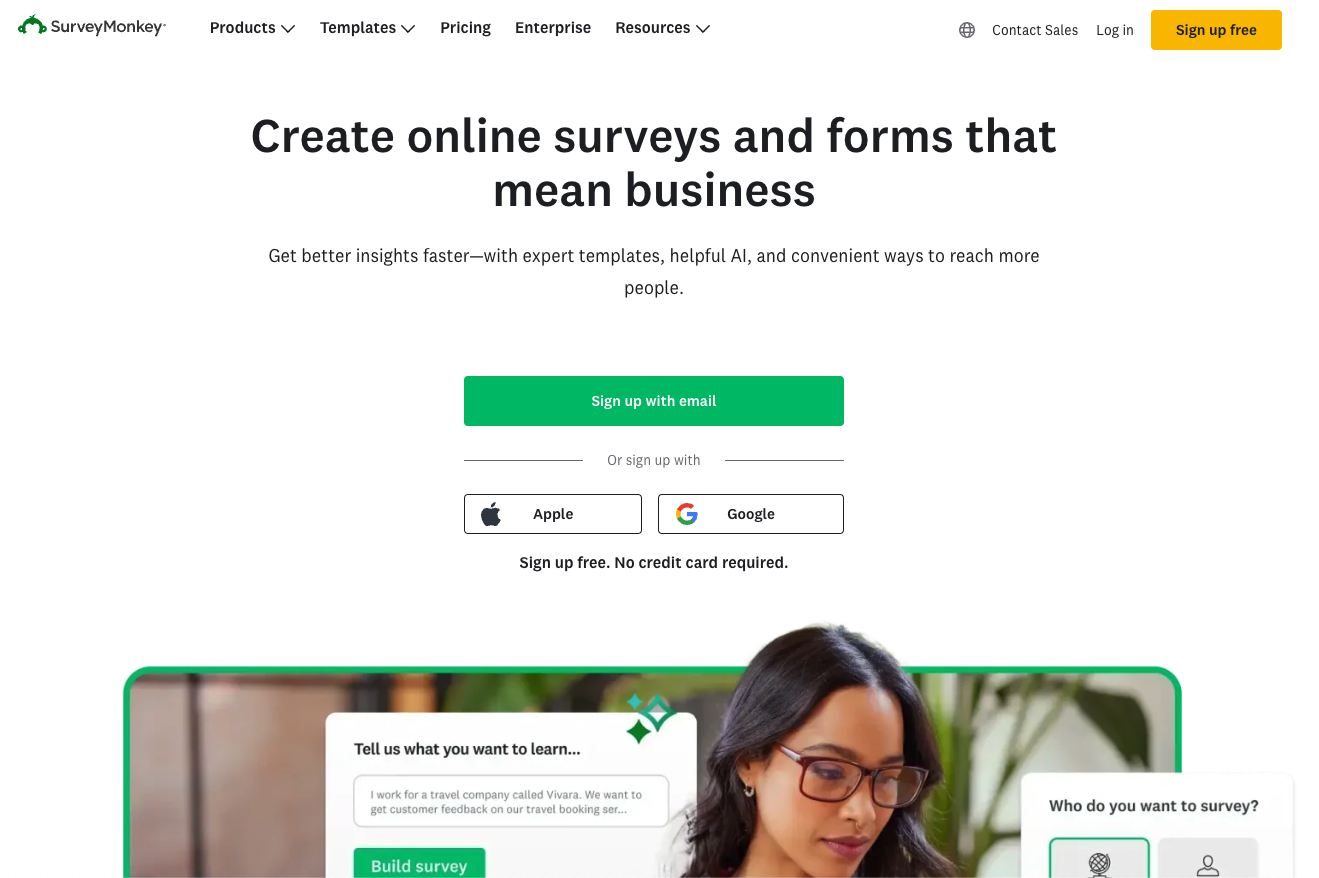
One of the more well-known survey tools, SurveyMonkey offers a broad list of features and capabilities for creating audience surveys.
Whether you want to create your own survey or choose from one of its 250+ expert-created templates, SurveyMonkey offers a user-friendly interface that enables you to customize your surveys to your needs.
It also offers a suite of helpful features, including AI-powered knowledge to help you pose the right questions, as well as built-in reporting and analytics.
- SurveyMonkey offers a free Basic tier with unlimited surveys featuring up to 10 questions and 25 responses per survey.
- Individual plans start at $1169/month with unlimited surveys and questions, and up to 15,000 responses per year.
- Team plans start at $920/user/month, starting at three users. This level also gives you unlimited surveys and questions, but offers 50,000 responses per year.
2. Typeform
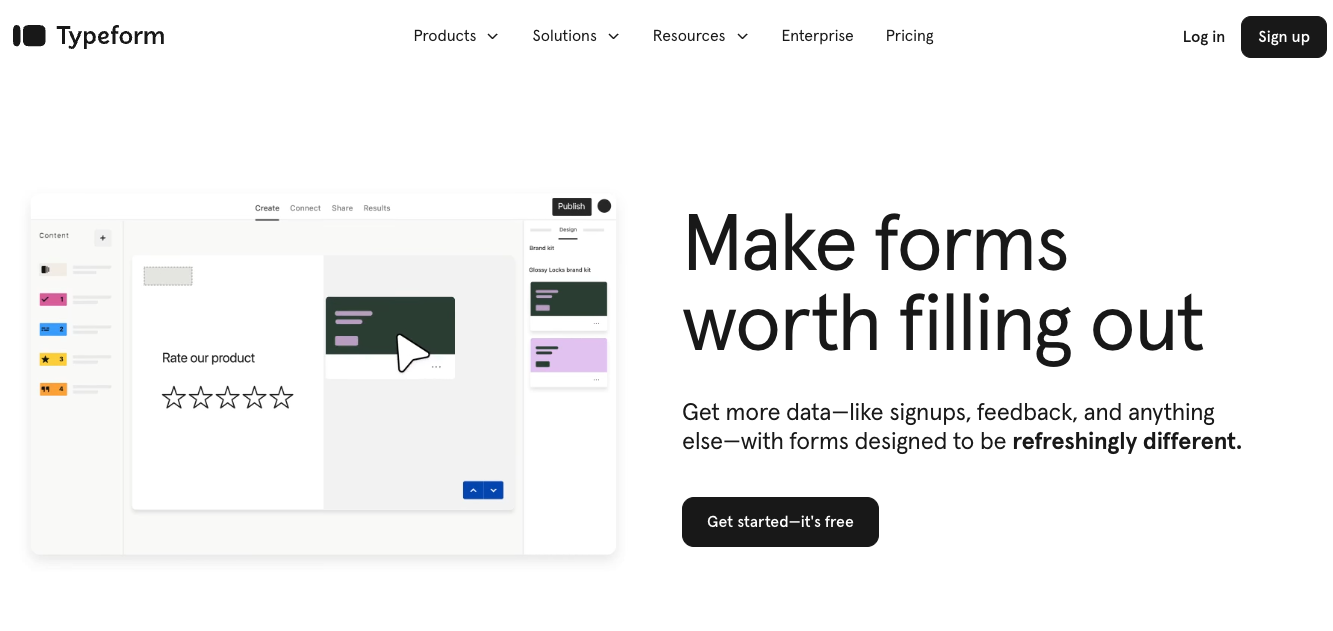
Typeform is an easy-to-use tool focused on helping users create intuitive and engaging forms, surveys, quizzes, polls, and more. Its selling point is the ability to create truly conversational, beautiful forms.
With Typeform, you can create slick surveys with customizable interactive elements, such as images and videos, that encourage your audience to take action. Its focus on interactivity makes it an appealing tool for market research.
Typeform offers plenty of useful features – from conditional logic to creating dynamic surveys – that adapt based on answers to real-time data analytics and integrations with tons of popular tools, from Slack to Google Analytics.
The company even offers a standalone video tool, VideoAsk, where users can create “video forms” to prompt responses.
- Typeform offers a Free plan with unlimited typeforms and 10 responses per month.
- Paid plans start at $25/month billed annually for Basic, $50/month billed annually for Plus, and $83/month billed annually for Business.
- The company also offers an Enterprise plan.
3. BuzzSumo
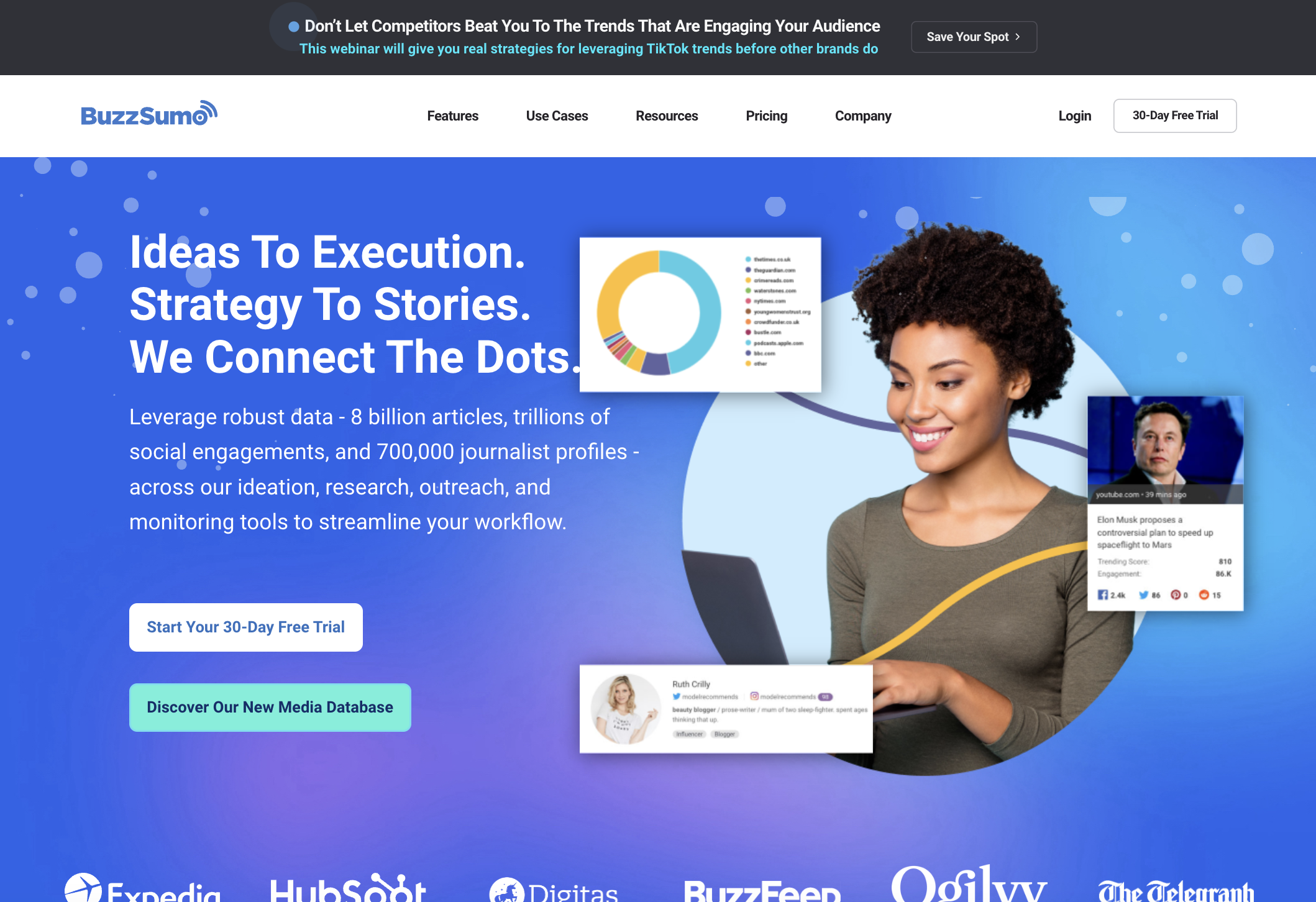
BuzzSumo is a content research and analysis tool that can help you gather some powerful market insights.
Regarding market research, BuzzSumo can help you understand the content landscape in your industry (and beyond), find out what’s resonating with your target consumers, identify influencers in your niche, and track how your content is performing vs. your competitors’.
The BuzzSumo tool analyzes articles (over 5 billion!) and social media posts across the internet to identify top-performing content. It allows you to comb through five years of data so that you can discover the right content ideas for your audience.
- 30-day free trial (no credit card required).
- Membership tiers start at $199/month billed yearly for Content Creation (individual) plan, $299/month billed yearly for PR & Comms plan, $499/month billed yearly for the Suite plan, and $999/month billed yearly for the Enterprise plan.
4. Qualaroo
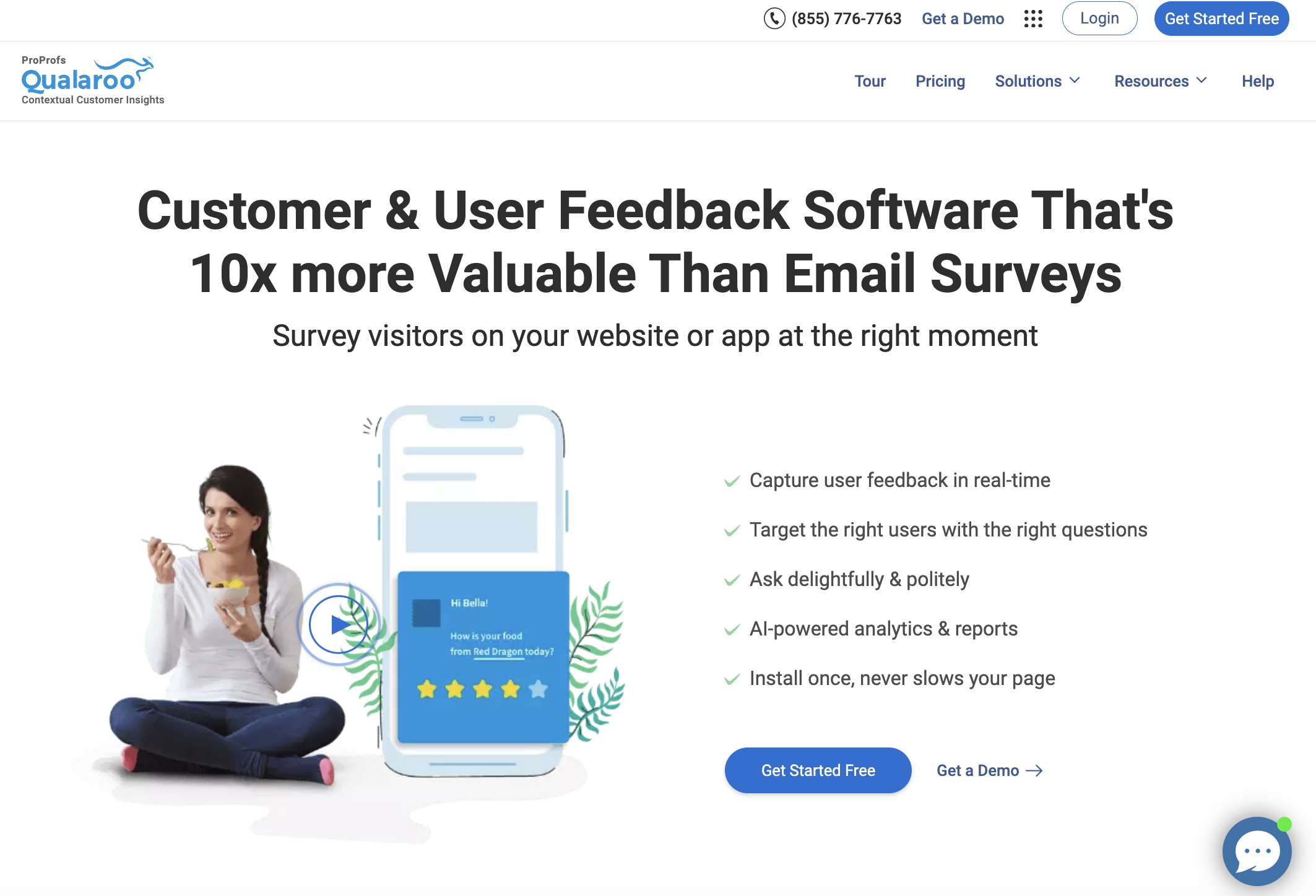
Want to capture user feedback and deepen your understanding of market trends? Qualaroo might be the tool for you.
Qualaroo is a customer and user feedback tool that claims to be “10X more valuable than email surveys.” Using Qualaroo, you can add a survey to a page on your website or integrate it into your product.
The tool uses behavioral triggering to show surveys or feedback prompts in response to specific user behavior, so you know you’re targeting the right people with the most relevant questions.
Qualaroo also offers visual customization so you can get the branding right, automatic language translation, a library of survey templates, audience targeting, and IBM Watson Sentiment Analysis to help you organize your results.
- 15-day free trial (no credit card required).
- Plans start at $69/month billed annually for Essentials, $149/month billed annually for Premium, and $299+/month billed annually for Business tier.
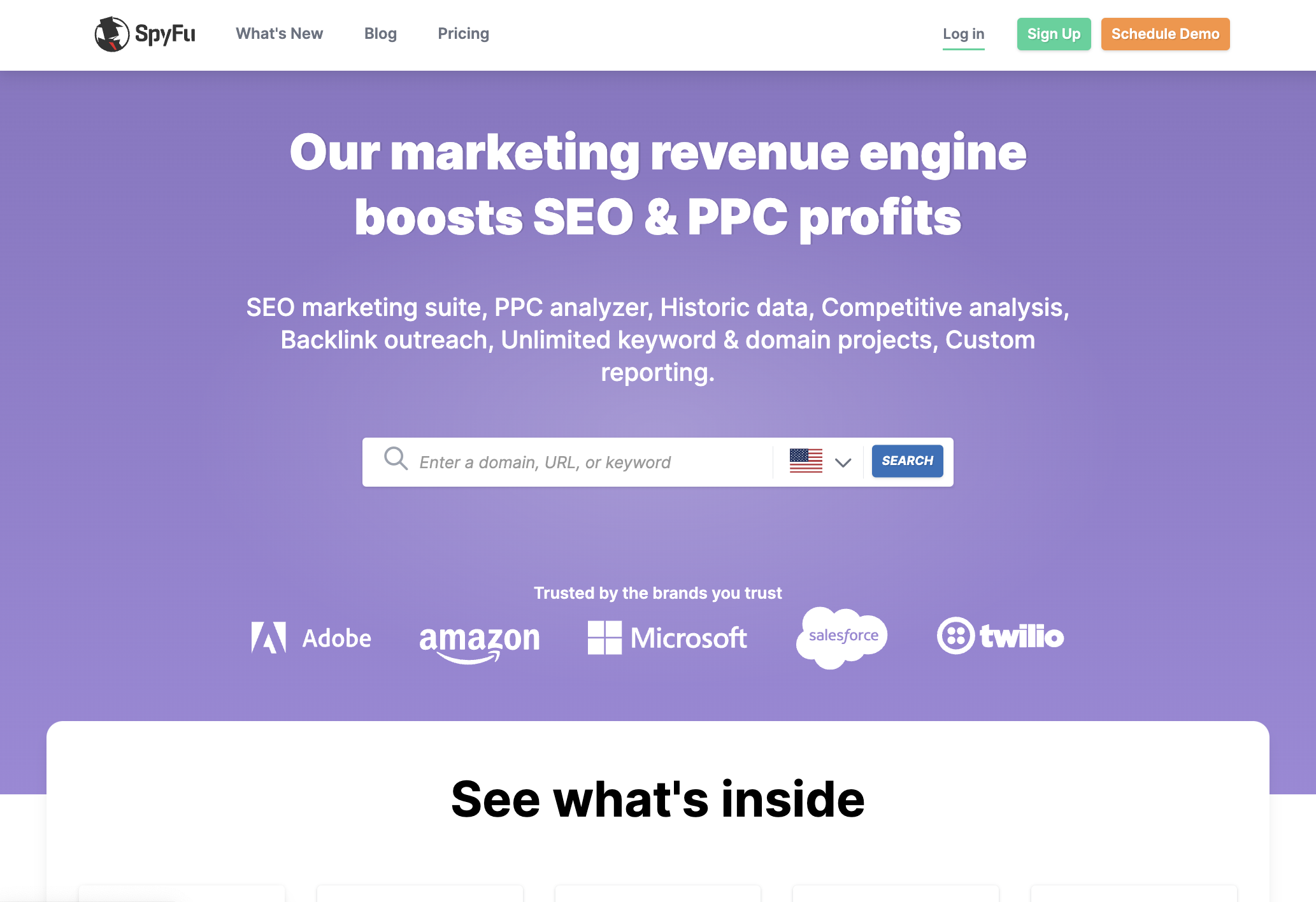
SpyFu is a great choice if you’re looking to conduct competitive analysis as part of your market research efforts.
It allows you to effectively “spy” on your competitors by viewing their marketing strategies, advertising history, what keywords they’ve bought on Google Ads, and more – which can help you find gaps in the market and optimize your own approach.
You can feed the SpyFu tool a URL, and it will instantly show you its results for SEO topics like organic keywords, top pages, backlink analysis, total traffic, competition, and more.
Not only can SpyFu help you gain an understanding of the SEO landscape for your industry and gain a competitive advantage, but it can also tell you how hard it might be to dominate a specific niche.
- SpyFu offers paid plans starting at $39/month for Basic, $79/month for Professional.
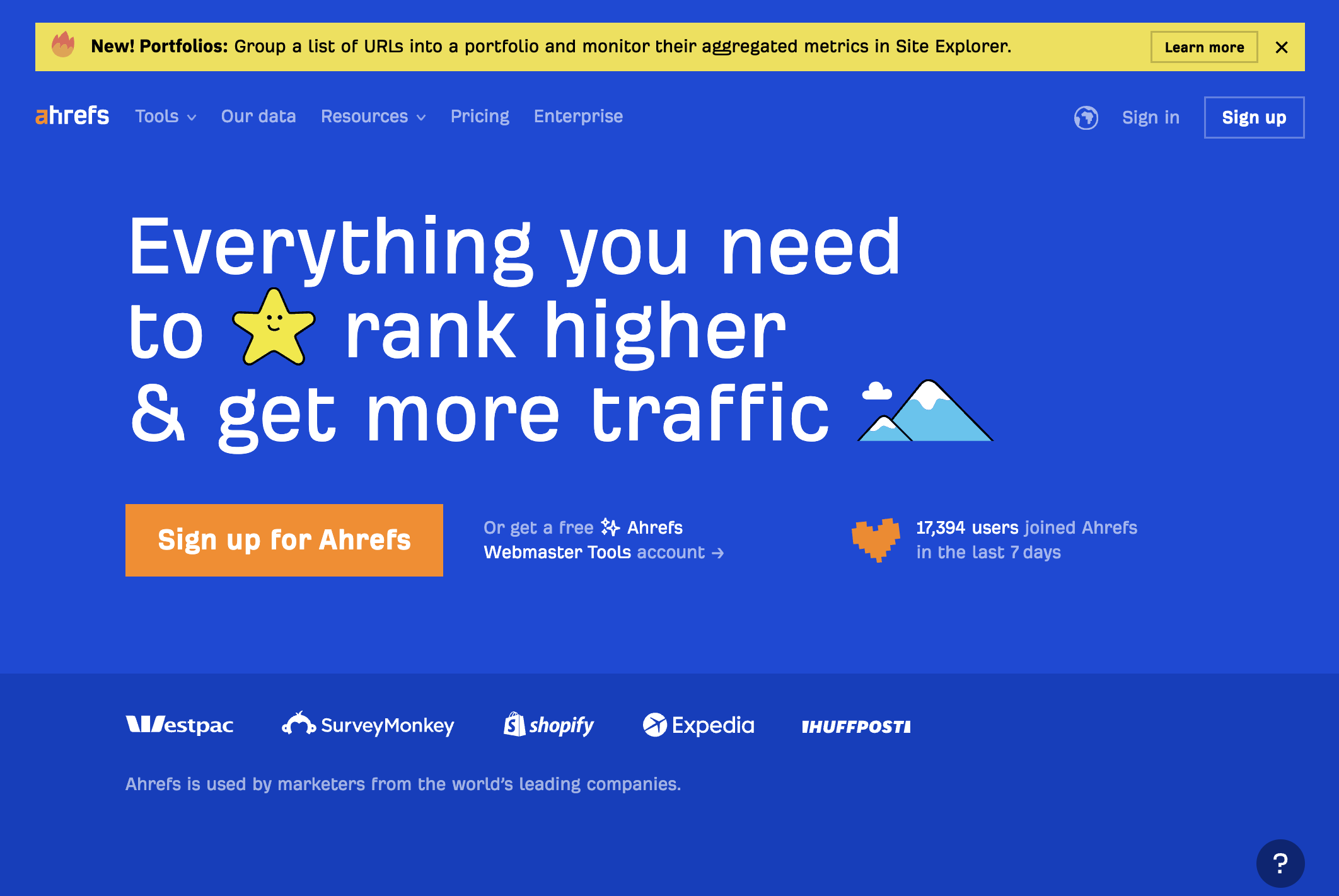
Another great tool for SEO and competitive analysis, Ahrefs is a popular choice of many marketers for good reason.
Using Ahrefs, you can learn more about the search landscape of your market, discover what keywords your customers are searching for, track your competitors, and analyze content in your industry to inform your own strategies.
With its keyword and content capabilities, Ahrefs will help you find gaps and opportunities in the market so that you can improve your content, your site, and your search visibility.
- Website owners can sign up for Ahrefs Webmaster Tools for free limited access to its Site Explorer and Site Audit tools.
- Paid plans start at $129/month for Lite, $249/month for Standard, $449/month for Advanced, and $14,990/month for Enterprise (billed annually).
7. Delve AI
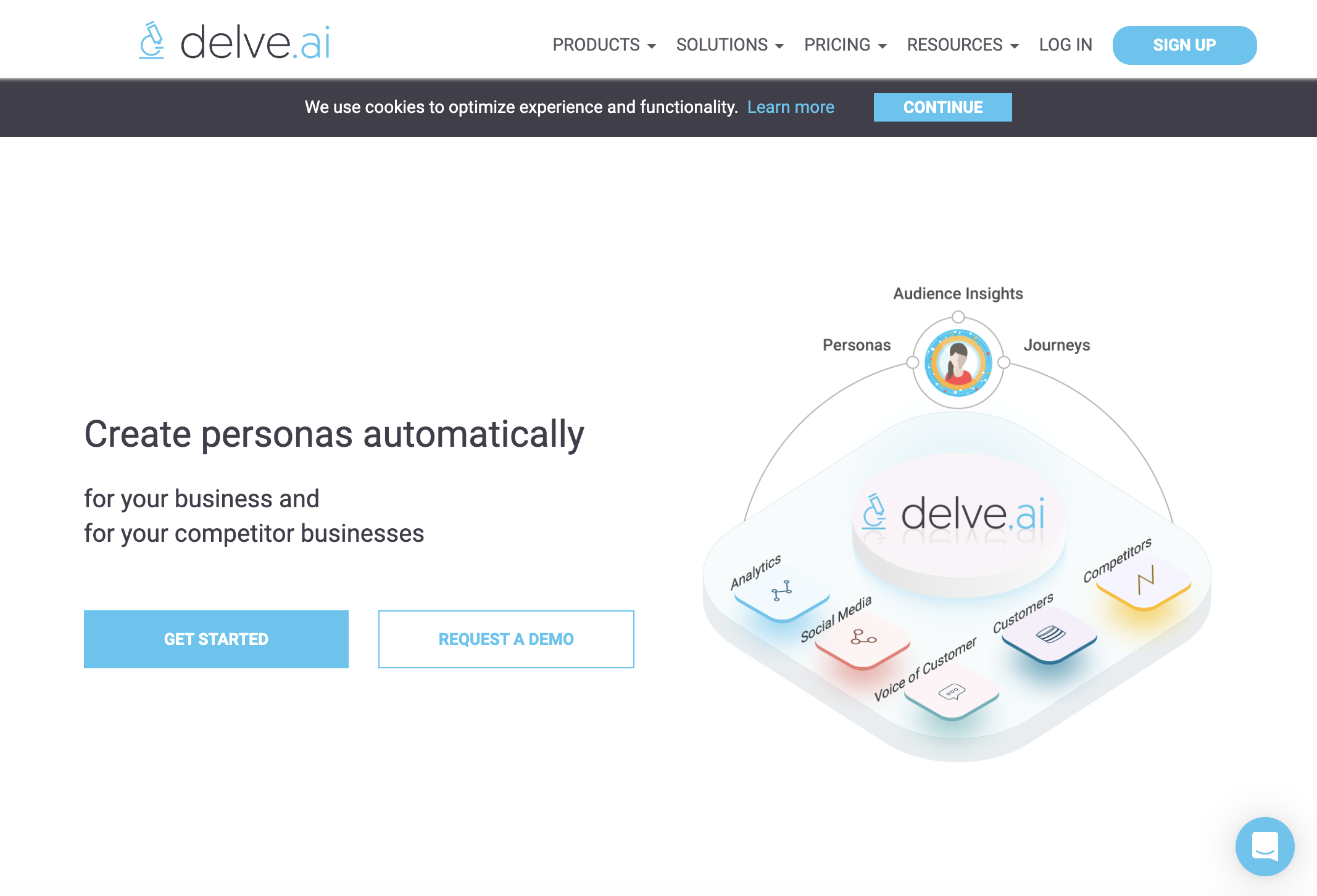
User personas are a crucial facet of an effective marketing strategy – and as such, developing them is a common step in any market research process.
Thanks to tools like Delve AI , it’s easier than ever to build user personas.
Delve AI offers a suite of persona-building tools based on your needs and the data available to you. Depending on what stage your business is in, you can generate:
- Competitor personas using Delve AI’s data.
- Social personas based on your social audience.
- Customer personas using your customer information.
- Live personas for your website based on Google Analytics data.
Beyond its multi-channel capabilities, Delve AI uses AI algorithms for accuracy in personas, offers behavioral insights, real-time updates to your personas, and more.
- The company offers a free Lite plan.
- Business plans start at $89/month for Standard, $199/month for the Growth tier, and $549/month for Pro (billed annually).
- Agency plans start at $209/month for Standard, $429/month for Growth, and $859/month for the Pro tier (billed annually).
8. Sprout Social
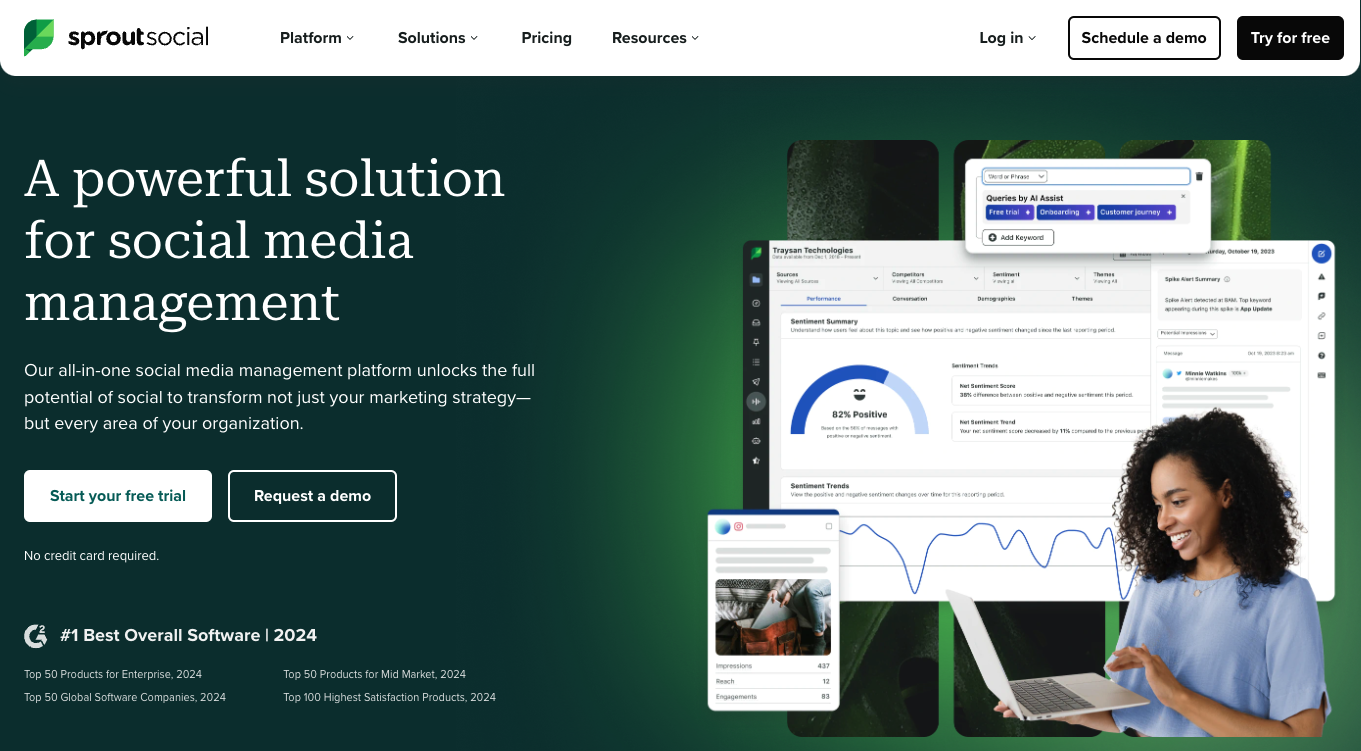
We don’t need to tell you about the importance of social media when it comes to connecting with your audience and driving business success. It can also play a major role where market research is concerned.
Sprout Social offers a robust suite of social media management features. Perhaps the most useful for market research are social listening features – which allow you to track market trends, industry keywords, and social conversations – and its competitor analysis capabilities.
It also provides insights into audience demographics, behavior, and interests, which you can use to inform your marketing approach.
- Free 30-day trial.
- Plans start at $199/month for Standard, $299/month for Professional, and $399/month for Advanced.
- Sprout Social also offers an Enterprise tier plan.
9. Google Trends
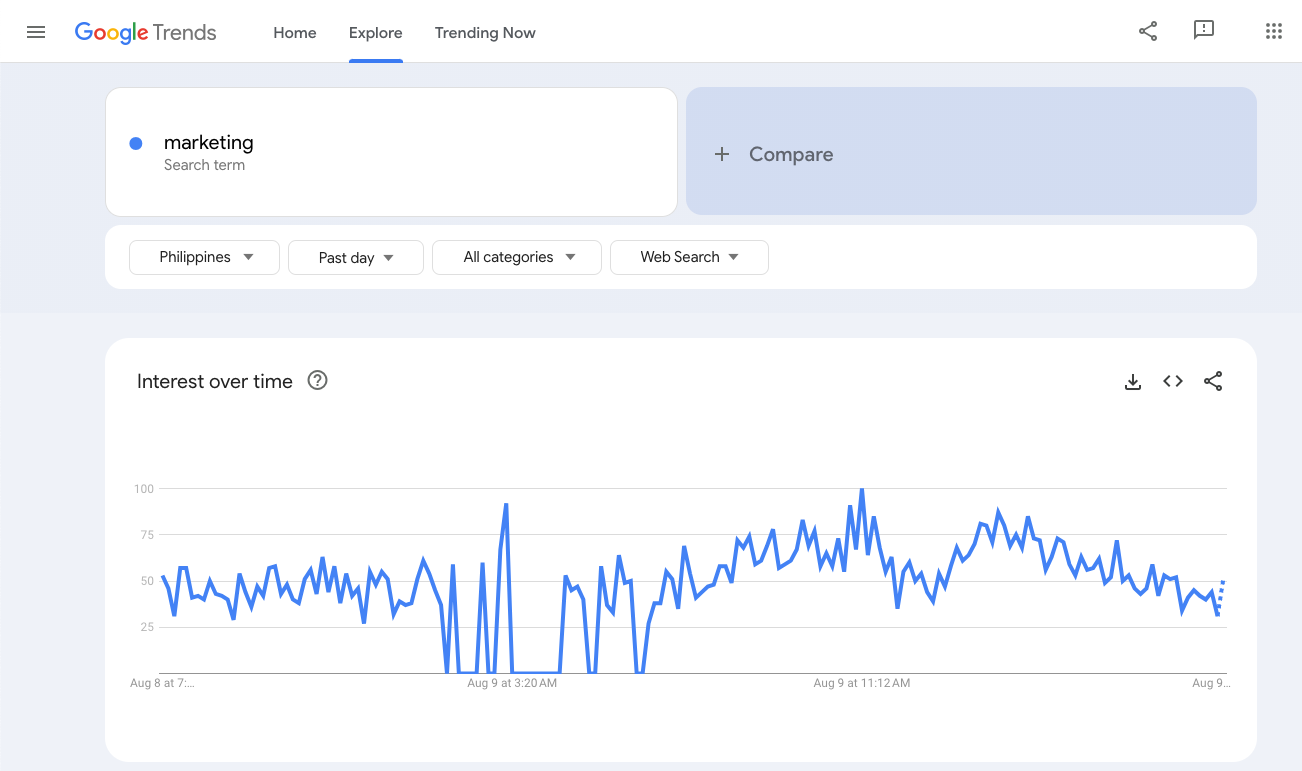
How can you supercharge your market research efforts? Look to search data.
Google Trends is an incredible tool that enables you to analyze real-time and historical search data to discover market trends, up-to-date consumer insights, and more.
By using this tool to access the latest information on how people search on Google, you can spot emerging interests and opportunity areas, and keep an eye on what consumers are most interested in.
It also offers location filtering so that you can see what’s trending in any given market.
10. Statista
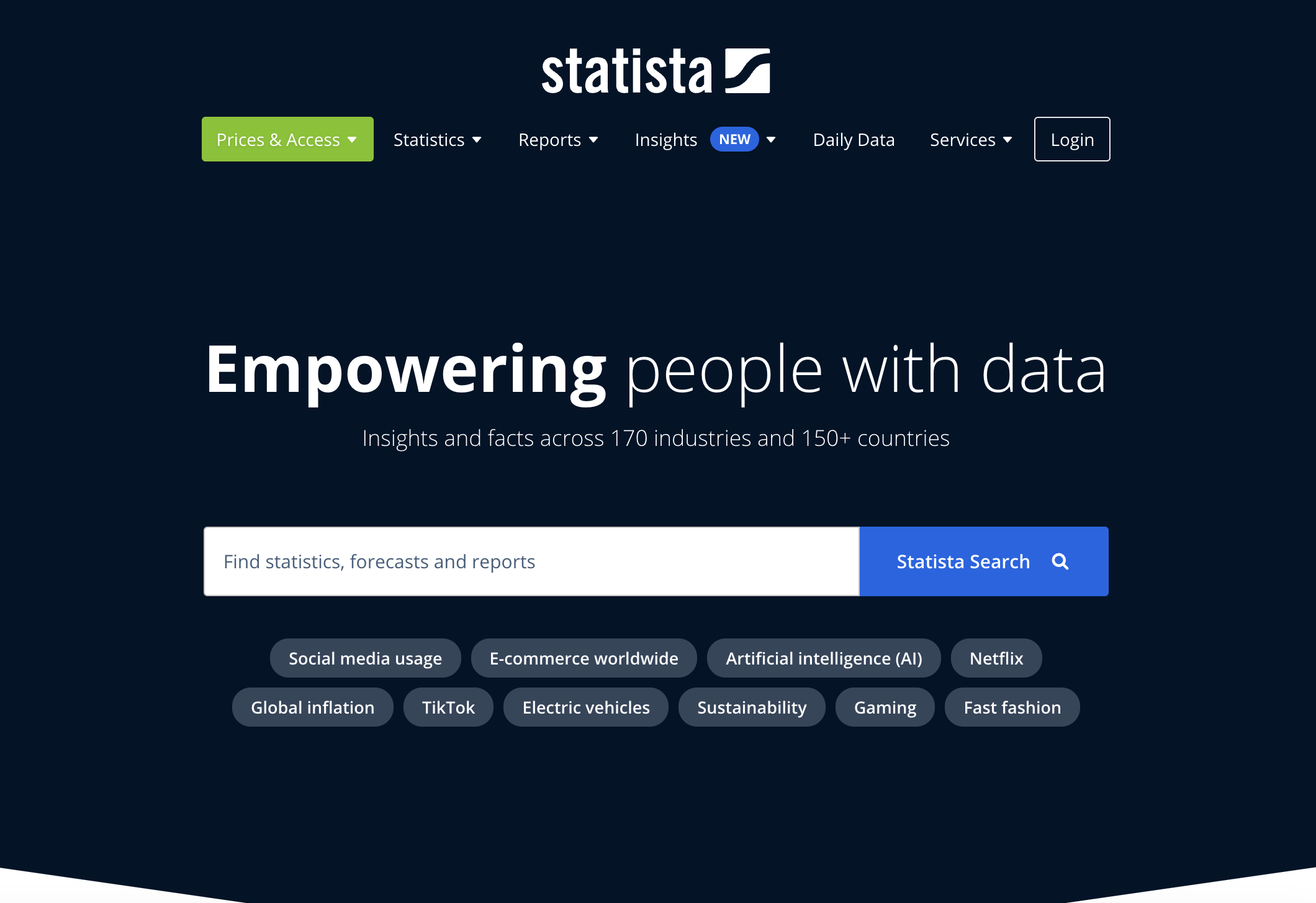
If you’re looking for data and statistics on pretty much anything in the world of business and marketing, you might want to check out Statista.
It’s a business intelligence platform that provides “statistics, reports, and insights on over 80,000 topics from 22,500 sources in 170 industries.” This means that if you’re looking for specific market research insights, Statista most likely has something to fit your needs.
From in-depth reports to data visualizations and industry forecasts, Statista can give you reliable insights into what’s happening in markets around the world, and highlight market and consumer trends.
- Free Basic account available.
- Paid accounts start at $149/month for Starter and $549/month for Personal (billed annually), $959 for Professional (billed annually) with more options available.
11. Qualtrics
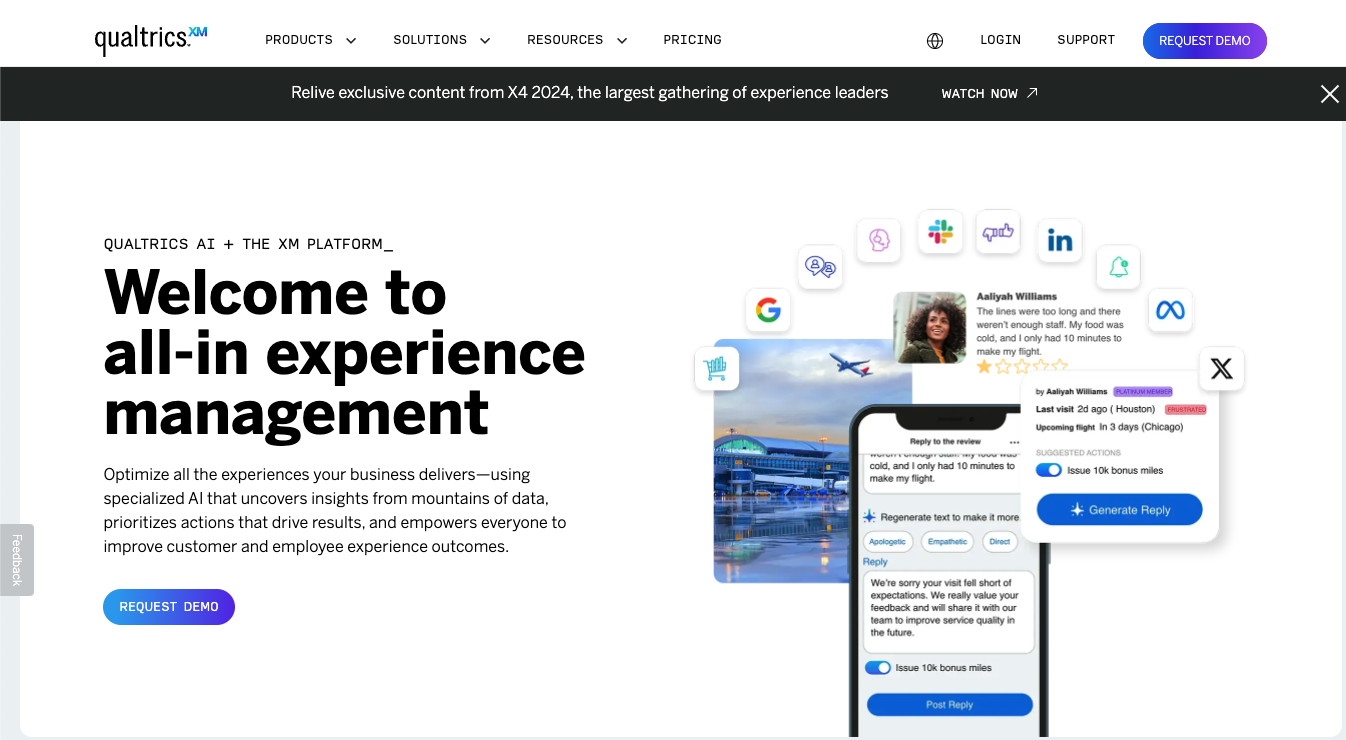
If you’re looking for something extremely robust, Qualtrics ’ market research platform is an all-in-one, AI-powered solution for your market research needs.
It offers a suite of features and capabilities, including:
- Panel Management : Enables you to create research panels from email lists, site visitors, social followers, and more.
- On-Demand Respondents : Companies can pay for access to survey respondents that match their target demographic.
- Product Development : Get access to early feedback on your new products and services from customers.
- Purchase Behavior : Explore data on what is fueling purchase decisions among your target customers.
While it requires a more dedicated investment, Qualtrics’ software is scalable and powerful. It comes with automation and integration with many other tools, and customers have access to a support team.
- Qualtrics offers a free survey maker tool with up to 500 responses.
- For pricing details, reach out to the Qualtrics team.
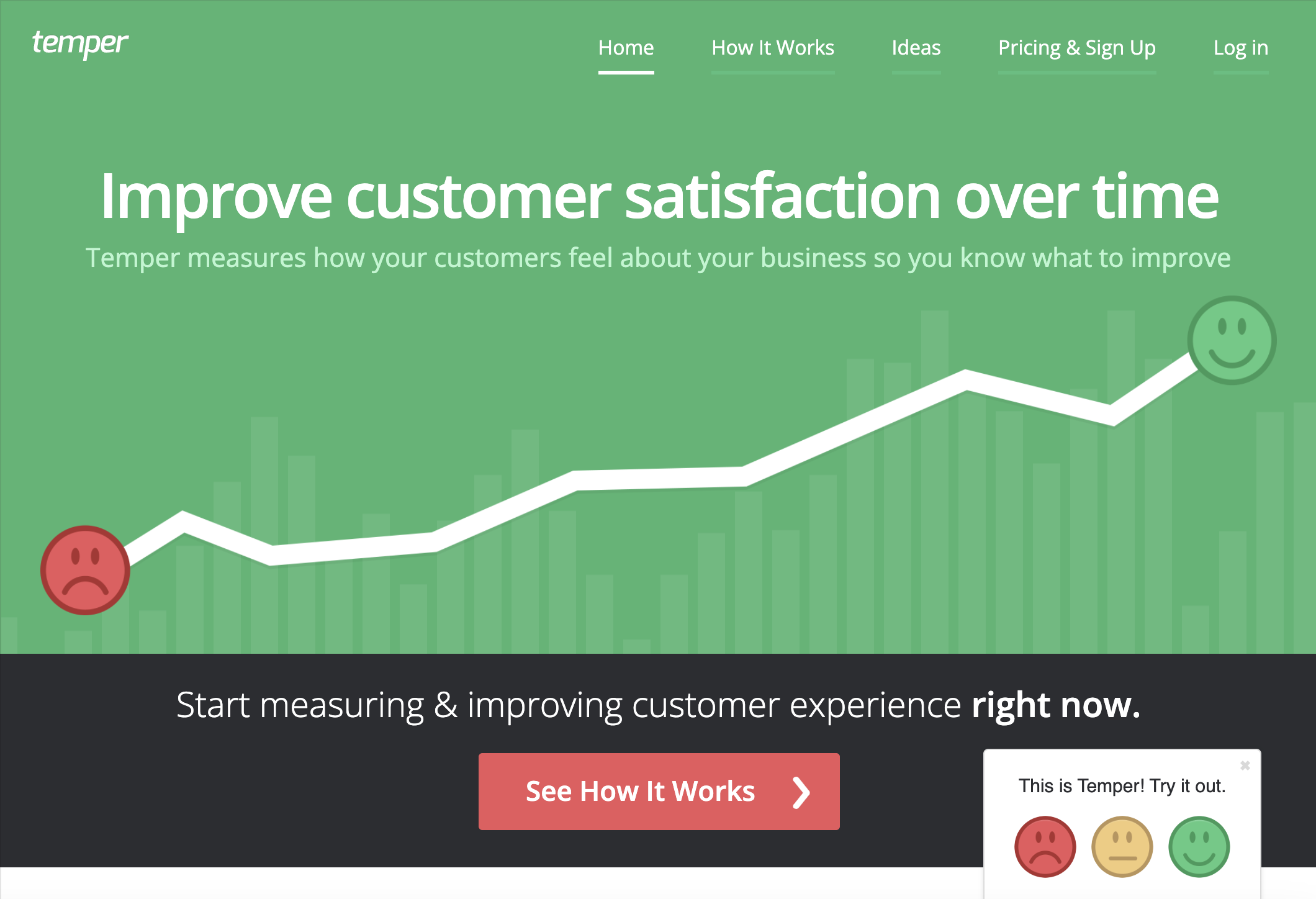
It’s important to stay on top of how your customers feel about your business, services, and products – and Temper provides a super simple way to do just that.
The concept is simple: Come up with a simple question you want to ask your question, and your customers can respond by clicking a smiley face that corresponds to how they feel.
You might want to ask your customers, “How do you feel about our new product?” or “Please rate your experience with our customer support team.” With just a little bit of code, you can place a Temper widget on your webpage, in a blog post, or in an email footer and get quick feedback on audience sentiment.
- Plans start at $12/month for Hobby tier, $49/month for Pro, $89/month for Business, and $199/month for White Label.
- Temper offers a 60-day risk-free, money-back guarantee.
You’ve likely heard of the question-and-answer site Quora , but have you considered its potential as a market research tool?
Quora is an online community where real people can go to ask questions about anything they’d like, and share their experiences and opinions with others via answers.
It offers a unique opportunity for brands to conduct market research within their specific industry or area by connecting with Quora’s diverse community of consumers, professionals, and others.
Try searching Quora for topics related to your business or niche, and look at what types of conversations are trending. Or, you could ask a question yourself!
It’s a great tool for engaging your audience , keeping an eye on your competitors, and even developing new ideas for content, product development, and more.
- Quora is free to use, though it also offers separate business solutions.
14. Crunchbase
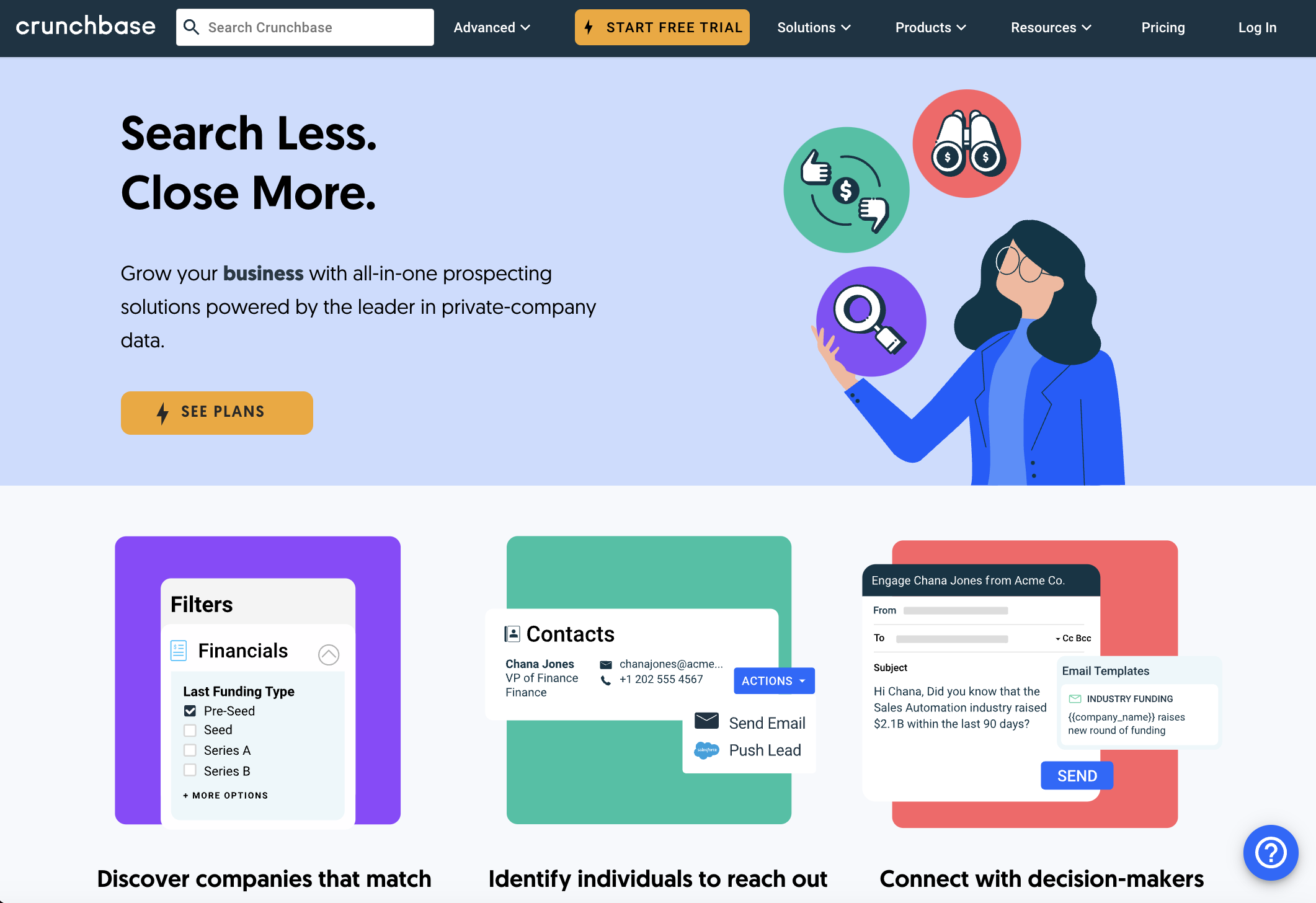
Crunchbase is a handy tool for getting a good picture of your industry landscape and how your competitors are faring.
It’s a database of companies that includes information like funding round data, investors, and financial information for each business. It also includes information such as employee headcount, leadership data, and more.
You can search Crunchbase by region or industry, allowing you to see how other companies in your niche are growing, and who is deciding to fund them. This can help you identify investment opportunities and market gaps, or even just gauge the overall health of your industry.
- Crunchbase offers a Free plan where you can preview profile pages at no cost.
- Paid options start at $99/month for Pro (billed annually).
- An Enterprise option is also available with custom billing.
15. Google Market Finder
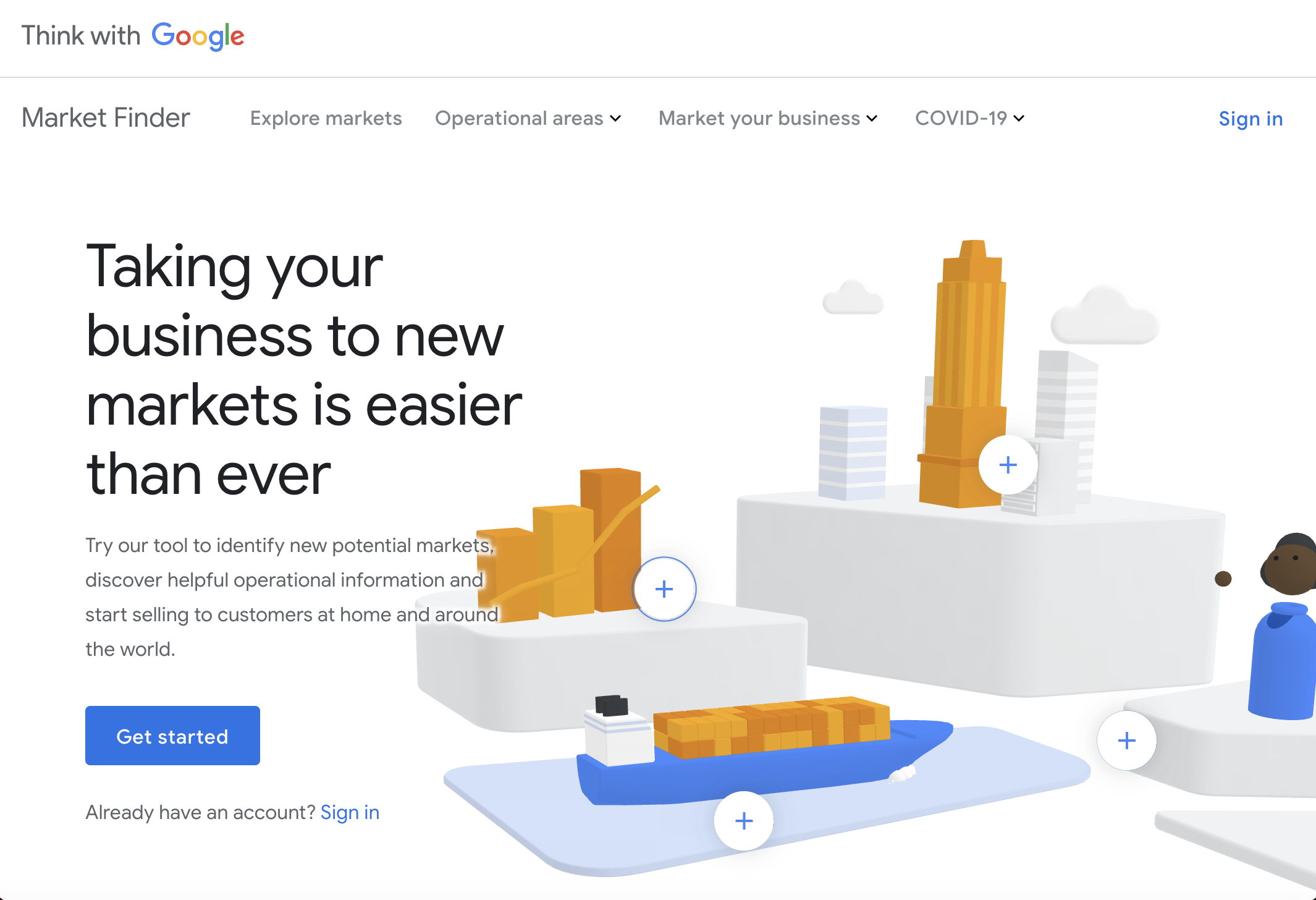
Another excellent market research tool from Google is Market Finder . This free, interactive tool is focused mostly on researching target markets – so you can use it to discover which markets might have the most potential for your company, monitor demand for your products or services, and more.
There are two primary features within Market Finder:
- Test your export readiness. By providing your company’s URL and completing a short quiz, the tool will grade your “readiness” to expand into new markets abroad.
- Dive into new markets. You can take another short quiz that will suggest new market recommendations based on the information you provide, as well as external data like search volume and Google Ads.
Market Finder can also integrate with your Google Analytics data for more accurate information.
16. Semrush
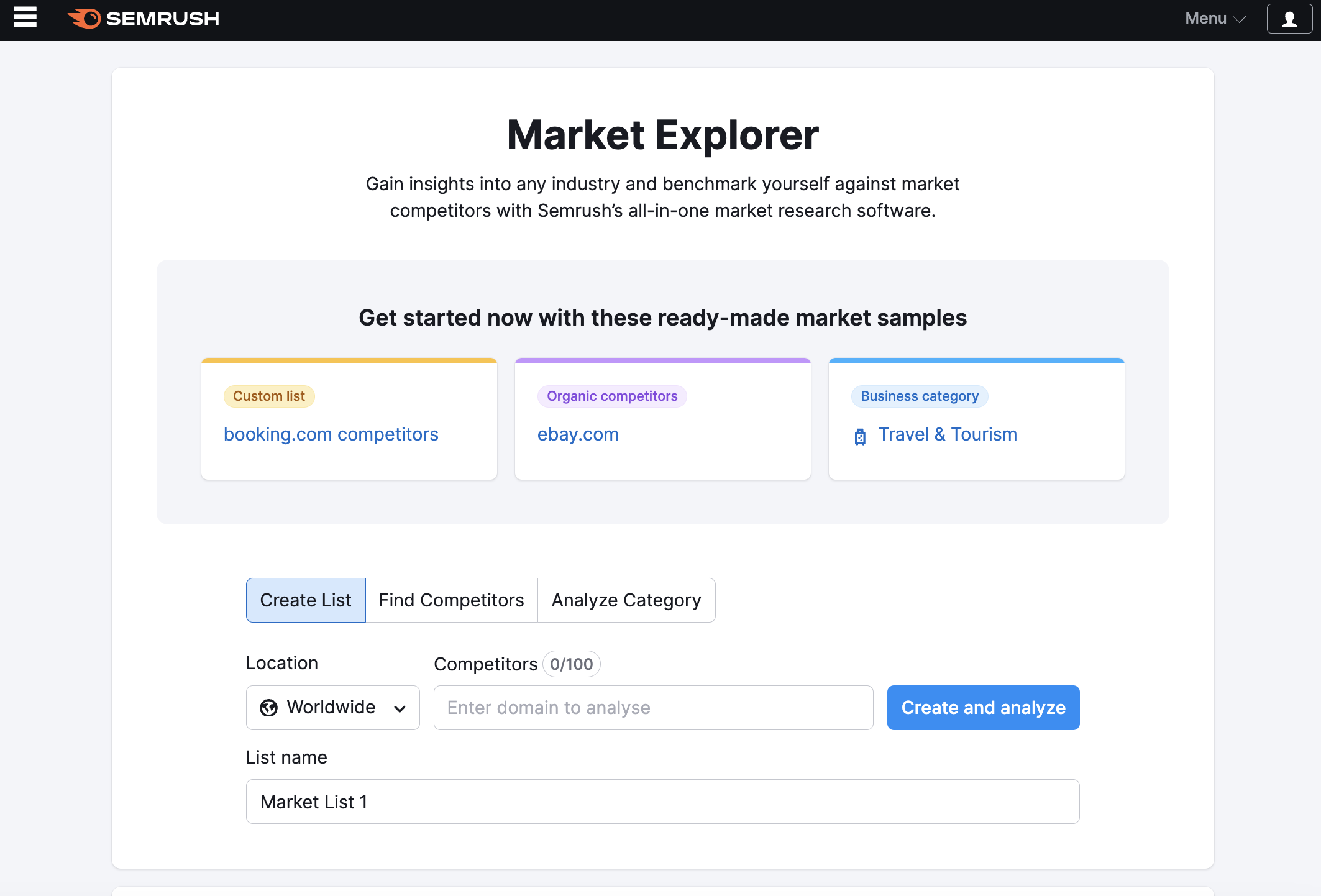
Semrush is a one-stop marketing tool that can be leveraged to gain incredibly useful market research insights.
The company offers features dedicated to this type of research, such as its Market Explorer tool, which enables you to get quick information on your specific industry, conduct an analysis of market share, and benchmark your business against your competitors. You can also use the tool to analyze the potential of a new niche or market region for your business.
You might also find Semrush’s traffic analytics tool useful, as it allows you to go deeper with competitive analysis and target consumer demographics.
- Semrush offers a free account with limited capabilities.
- Paid accounts start at $139.95/month for Pro, $249.95/month for Guru, and $499.95/month for Business (billed annually).
17. Pew Research Center
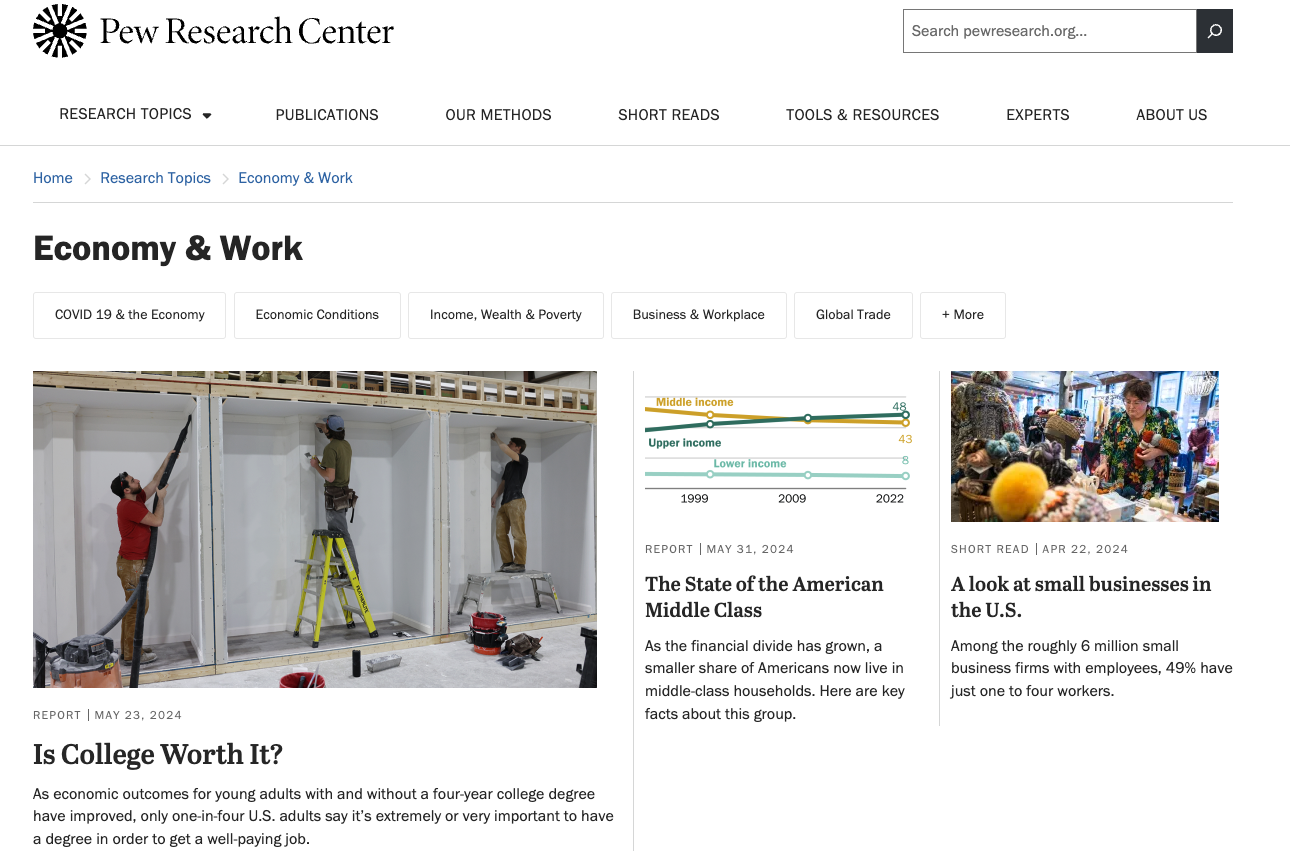
While not a traditional marketing tool, the Pew Research Center is a widely known and respected resource that can be super effective when it comes to market research.
The site hosts a robust catalog of reports, surveys, and research covering everything from tech and digital media to politics, cultural trends, and more. The data is unbiased and credible, offering a unique perspective into what today’s consumers think and feel on various topics.
You can use the Pew Research Center as a tool to further hone your market research efforts, providing you with insights into the attitudes and behaviors of your target consumer, as well as the various factors that are impacting their desires and purchasing decisions.
18. Exploding Topics
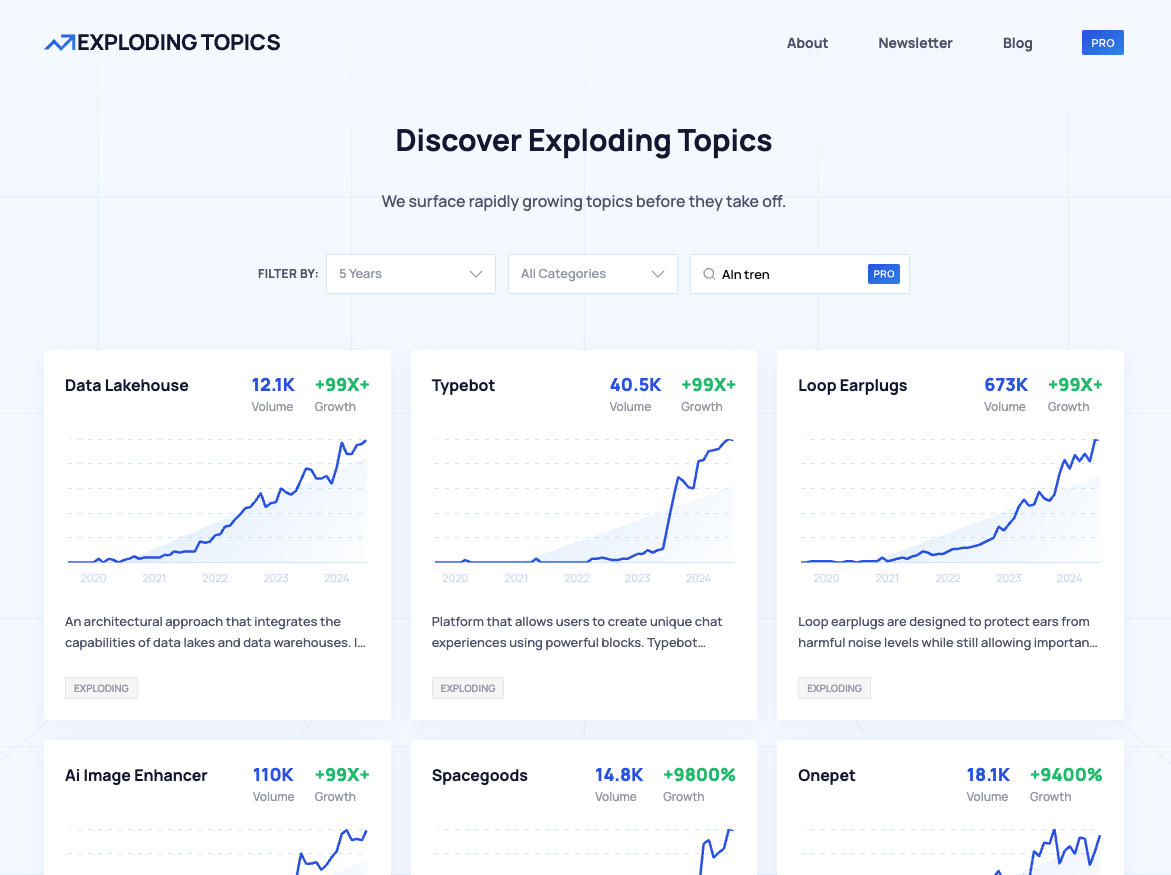
We all know the saying, “I liked it before it was popular” – well, with Exploding Topics , your business can be the one to say this.
Exploding Topics helps you spot trends before they become super popular by analyzing searches, mentions, and conversations across the web to identify products, topics, and industries that are on the rise.
You can use Exploding Topics as a resource to help you predict shifts in the market and consumer interests, which can inform everything from your product design and strategy to your marketing approach.
It’s a lot like Google Trends, with some key differences; it pulls in data from a variety of sources and is focused on highlighting emerging trends before they take off.
- Exploding Topics offers a free version of its Trend Database.
- Paid tiers begin at $39/month for Entrepreneur, $99/month for Investor, and $249/month for Business (billed annually).
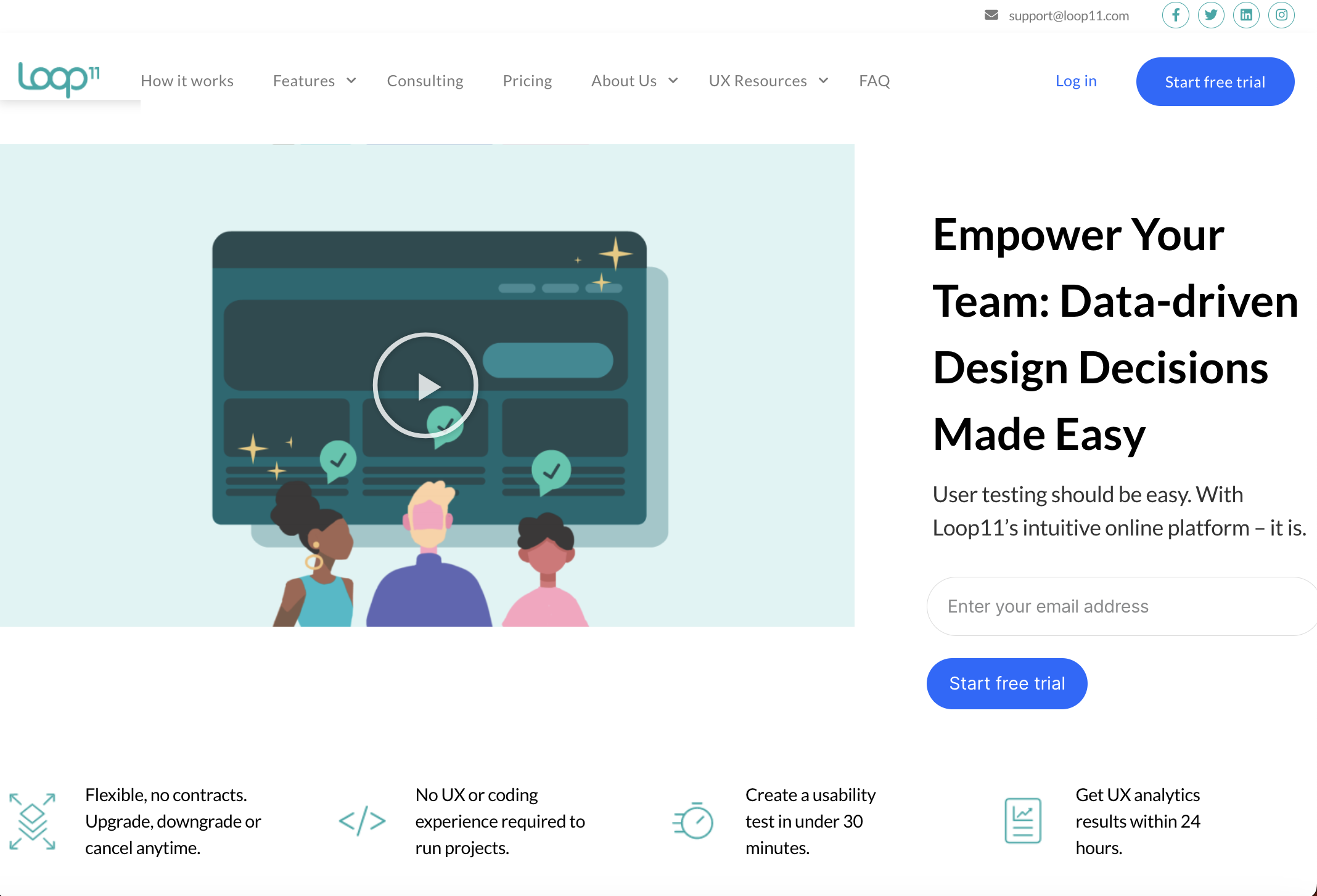
In today’s day and age, you can’t build a successful business without an effective website. But how can you know whether your website will resonate with your target consumer?
You can use Loop11 , a usability testing platform that helps facilitate user testing of your products.
Loop11 makes it simple to create a usability test and secure participants.
It enables you to view the user’s experience through video, audio, and screen recordings. Then, it presents you with in-depth insights and UX metrics to help you understand what’s working with your website, app, or product and what’s preventing people from converting.
- Free 14-day trial with full capabilities.
- Paid plans start at $179-199/month for Rapid Insights, $358-399/month for Pro, and $533-599/month for Enterprise (price depending on whether it’s billed monthly or annually).
Market research is key to any business plan, no matter what industry you’re in, what stage of growth your business is at, or what customers you’re serving.
From competitive analysis to keyword research, user feedback, and more, focusing on your market research efforts will pay dividends to your business in the long run.
And while there are plenty of different ways to approach market research, these represent some of the best tools available to you – and can be a great jumping-off point for you to get started.
More Resources:
- How To Calculate Your Total Addressable Market (TAM) For SEO
- Market Intelligence: What It Is & How To Use It
- Competitor Mapping: What Is It & How To Do It
Featured Image: LAONG/Shutterstock
Writer, digital marketer, and content strategist. Annabelle has 8+ years of experience in social marketing, copywriting, and storytelling for best-in-class ...
15 Top Market Research Tools & Software (2024)

In this guide, we’ll cover the 17 best free and paid market research software tools that you can use right now.
From data collection to conducting one-on-one interviews with key members of your audience, these tools can make the market research process more effective and efficient.
| Sourcing public data | A wide library of reports for purchase that allow you to dig deeper in any industry | Free | No | |
| Identifying market trends | Forecasts that show you how a trend’s popularity may change in the next year | Free | Yes; 14-day trials of paid plans for $1 | |
| Finding ideal regions for business expansion | A tool that analyzes your company’s URL to assess its expansion readiness | Free | N/A | |
| Identifying good spots for brick-and-mortar businesses | Search filters that let you drill down and see data by Zip code | Free | N/A | |
| Digging deep into data on a single market sector | Extremely comprehensive, licensable reports | Free | No | |
| Understanding competitor marketing strategies | A tool that lets you see what kind of paid ads your top competitors are investing in | Free | No | |
| Finding out who’s investing in growing startups | Tools to run searches by industry or company | Free | Yes; one week | |
| Monitoring competitor brand mentions online | The ability to track names of people, companies, products | $29 per month, billed annually | Yes, one week | |
| Reading reviews from real software users | Reviewer verification and of incentivized reviews | Free | N/A | |
| Tracking e-commerce product pricing trends | Dynamic pricing support that can automatically change your storefront’s prices | $99 per month | Yes; 14 days | |
| Assembling panels that mirror your target market | One-on-one interviews with business and consumer users | $24 per response | No | |
| Surveying your existing customer base | An audience panel service that distributes questions to lookalike groups | Free / $1 per audience panel response | No | |
| Surveying groups that resemble your target audience | Quality checks on survey responses to improve reliability | Upon request | No | |
| Automatically posing questions to website visitors | Customizable question types and timing | Free | No | |
| Sorting data and brainstorming survey questions | Custom GPTs that can execute specific tasks | Free | No | |
| Discovering audience thoughts on new products | Additional UX research tools for e-commerce companies | $191 per user, per month (billed annually) | Yes, one week | |
| Quickly researching audience pain points through questions | Tree-style charts that show how questions relate to each other | Free | No |
1. Statista
Statista is a statistics portal that also offers customized market research reports.
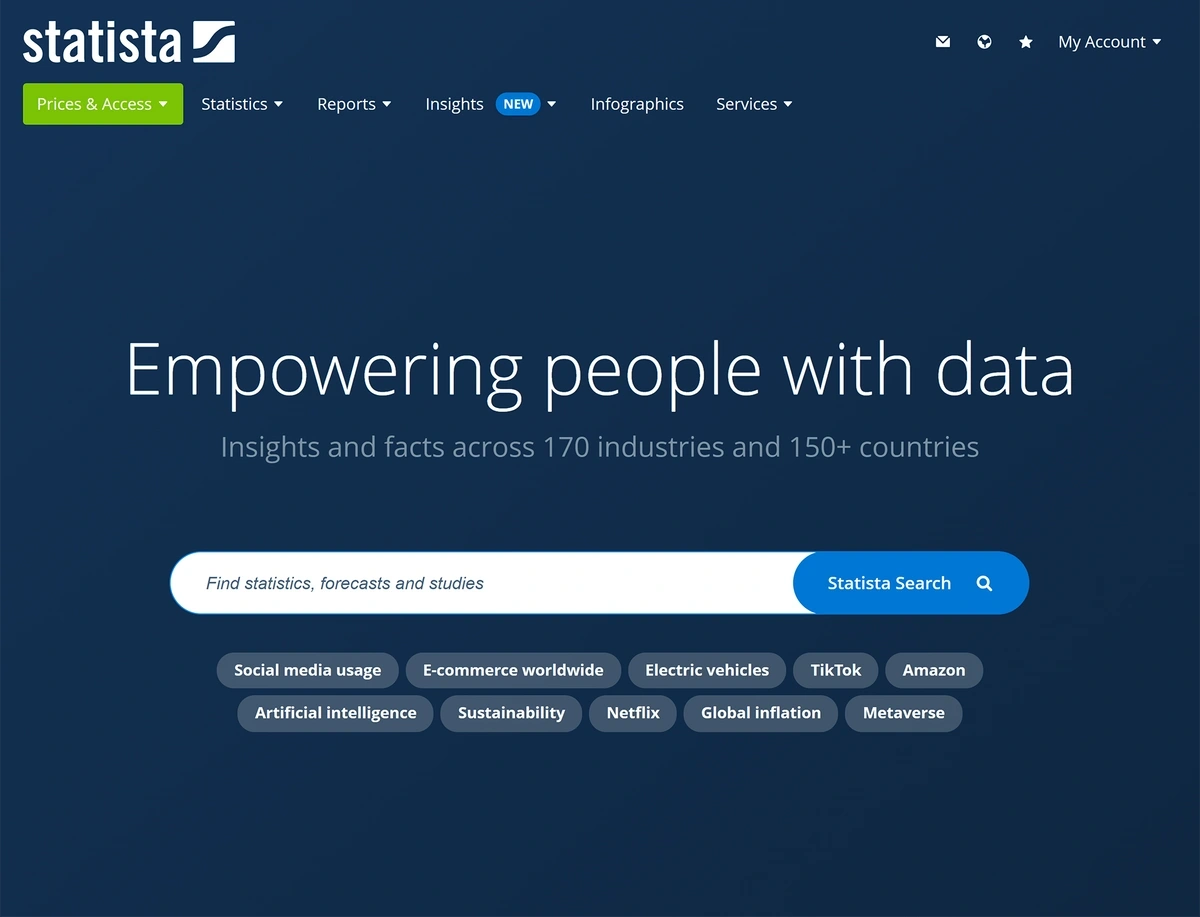
To quickly find relevant reports, type in a keyword (like “beverages”) and Statista will produce a list of results.
The information you can get from Statista makes it easy to gauge an industry’s:
- Trend direction
- Consumer behavior
These critical signals can help you decide whether or not to invest or expand into that market.
Statista data comes from three primary sources:
- 49% of the data comes from Statista’s original research (the company employs over 100 data analysts)
- 16% comes from publicly accessible data sources
- 35% is obtained through unique data partnerships, such as with market research institutions
You can even opt to talk to one of Statista’s professional researchers to get further help and insights during your market research process.
It is important to note, though, that the quality of data you find on Statista may vary. This is because a number of the reports—particularly the free ones—are based on public data.
Who Should Use Statista?
Statista is useful for investors seeking their next opportunity, as well as business leaders who want to better understand the competitive landscape.
How Much Does Statista Cost?
Much of Statista’s data is available for free. For advanced insights and reports, you can purchase a paid plan. Options start at $199 per month; you can also purchase single, comprehensive reports for $495.
2. Exploding Topics
Exploding Topics is a trend spotting tool.
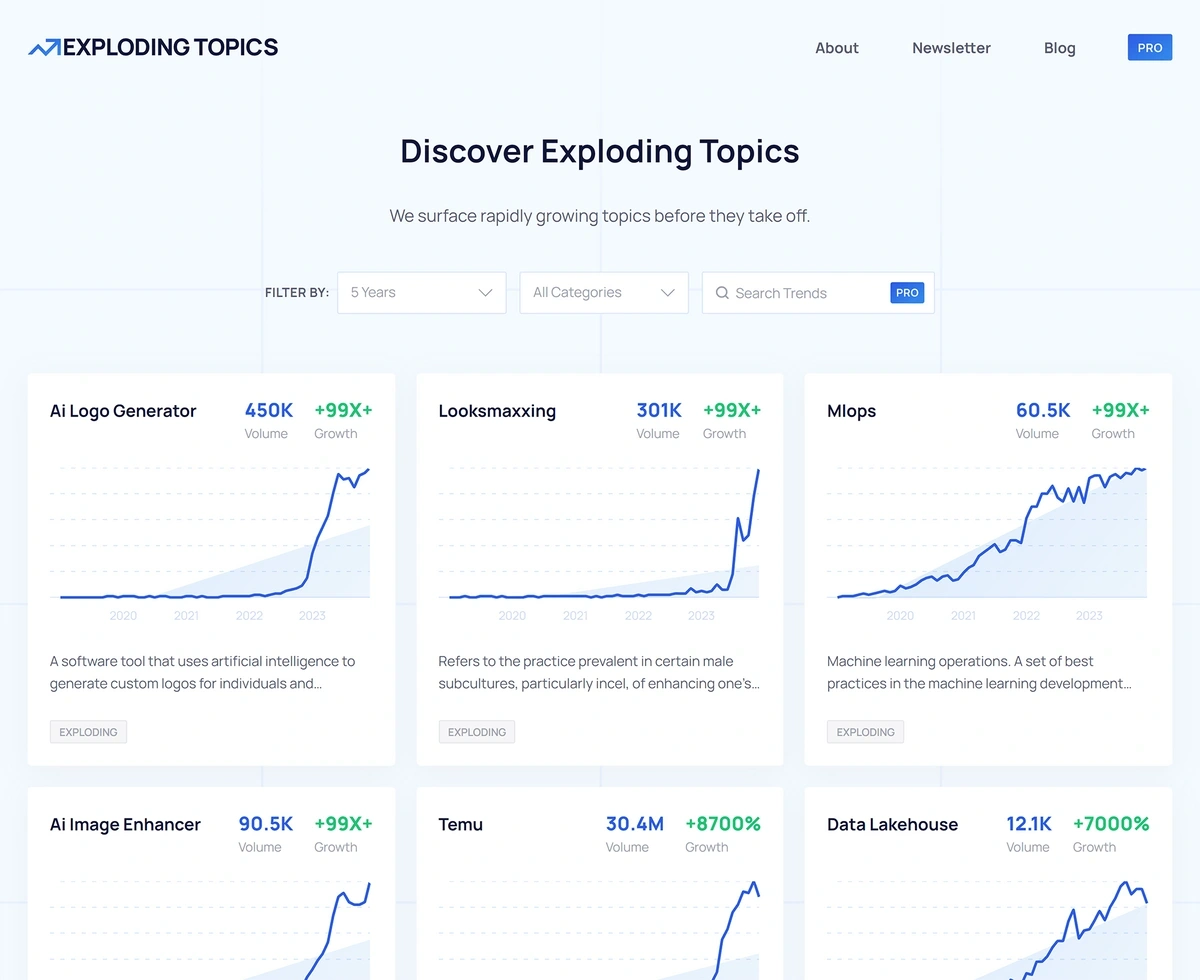
Knowing about a trend before it takes off is the holy grail of market research. The problem, though, is that most trend analysis is highly subjective and based on someone’s best guess about what may take off in the future.
We built Exploding Topics to solve this problem by identifying trends based on big data.
The flagship feature is our Trends Database, which contains over 750,000 trending topics across 30+ industries like fashion, finance, tech, marketing, pets, beauty, and more.
When you view a trend in our database, you’ll see a graph of the trend’s historical search volume. This can help you gauge a topic’s popularity and stability. Users on our Investor and Business plans can also see a forecast of the trend’s projected growth:
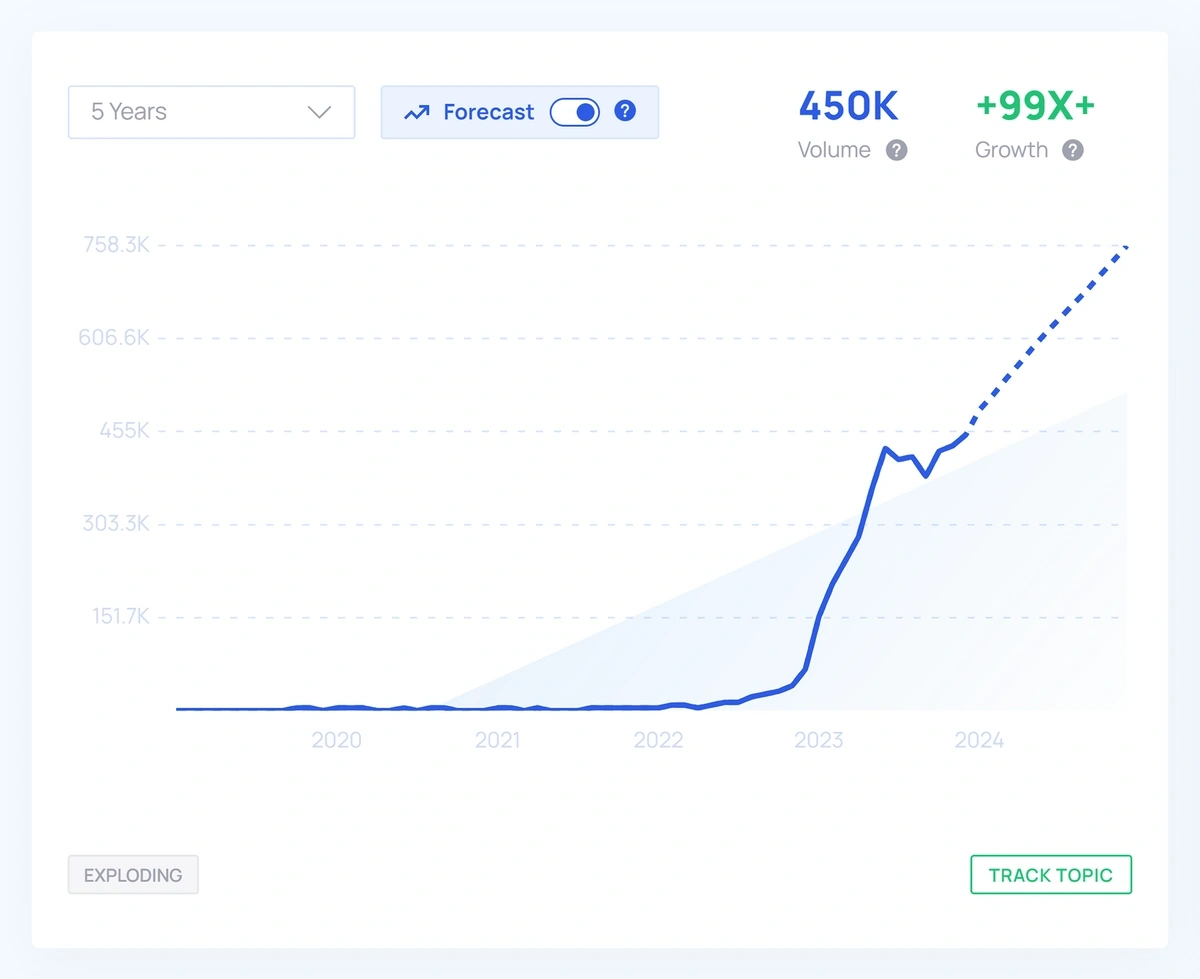
We source our data through social listening—tracking what’s being discussed on:
- Social media
- Business websites
- News media sites
By using a mix of artificial intelligence and human data analysis, we rapidly gather this trend data and qualify it to identify the most popular topics.

We update our database with this information every day, so you’re always getting the most up-to-date trend data.
Exploding Topics also offers a handful of other helpful tools that you can use for market research, too. These include our:
- Trend Search : While our core database is great for discovering new trends, the search feature is useful if you already know what you want to see data about. It’s a good alternative to Google Trends.
- Meta Trends : If you want to see the products and brands that are currently riding a trend wave, you can do so by using our Meta Trends feature.
- Trending Startups : Investors can use the Trending Startups list to identify new and rapidly growing companies in any category.
- Trending Products : When you’re interested in expanding your reach or offerings, the Trending Products feature helps you identify hot products that are currently seeing rapid growth.
Who Should Use Exploding Topics?
Exploding Topics is great for investors, entrepreneurs, marketers, and business leaders who need to understand what the competition looks like right now —and how it might change in the near future.
How Much Does Exploding Topics Cost?
You can view much of our basic trend data for free right now. To unlock all our data, as well as extra features like our lists of trending products and startups, you’ll need a paid plan.
Options start at $39 per month (billed annually), and you can get a two-week trial of any paid plan for just $1.
3. Market Finder
Market Finder is a free Google tool that makes it easy to discover international markets that are ripe for expansion.
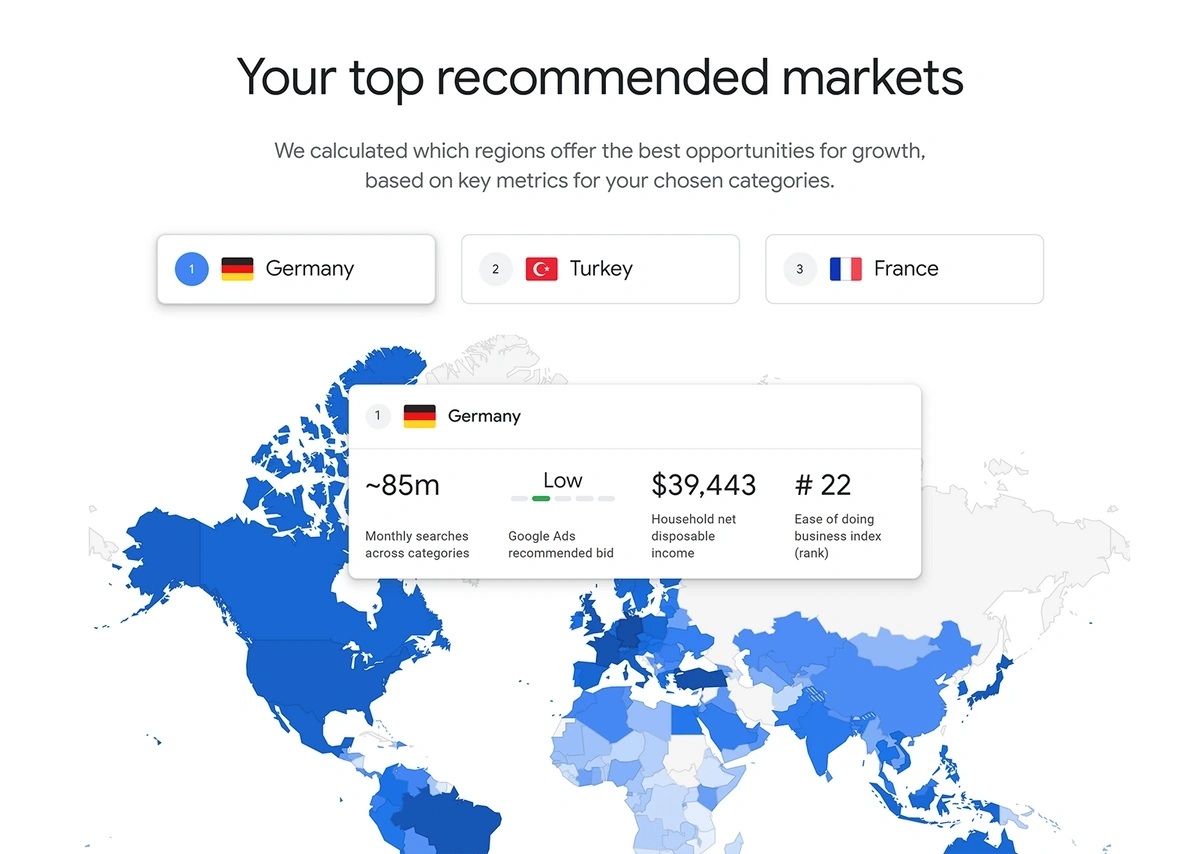
Rather than uncovering specific trends, Market Finder shows you new regions and demographics with strong potential for future growth.
It has two primary tools:
- Dive into new markets : This feature walks you through a quick quiz that identifies your industry and collects some specifications about your company. Then, it shows you which companies would be ideal for expansion based on data from Google Ads, search volume, and household income.
- Test export readiness : Enter your URL in this tool; it’ll analyze your readiness for expansion based on marketing performance (international traffic, e-commerce capabilities, etc.), operational abilities (payment fit, localization capabilities, etc.) and competitive position (category demand).
If you have Google Analytics set up, then Market Explorer can pull data directly from the Google Analytics dashboard for increased accuracy.
Who Should Use Market Explorer?
If you’d like to expand your business and find marketing opportunities in new regions, then Market Explorer is a useful tool. It’s also a good choice for investors who would like to identify new regions in which they can seek potential investment opportunities.
How Much Does Market Explorer Cost?
Market Explorer is free to use.
4. Census Business Builder
The Census Business Builder is a tool that allows brick-and-mortar business owners to explore new geographic markets.
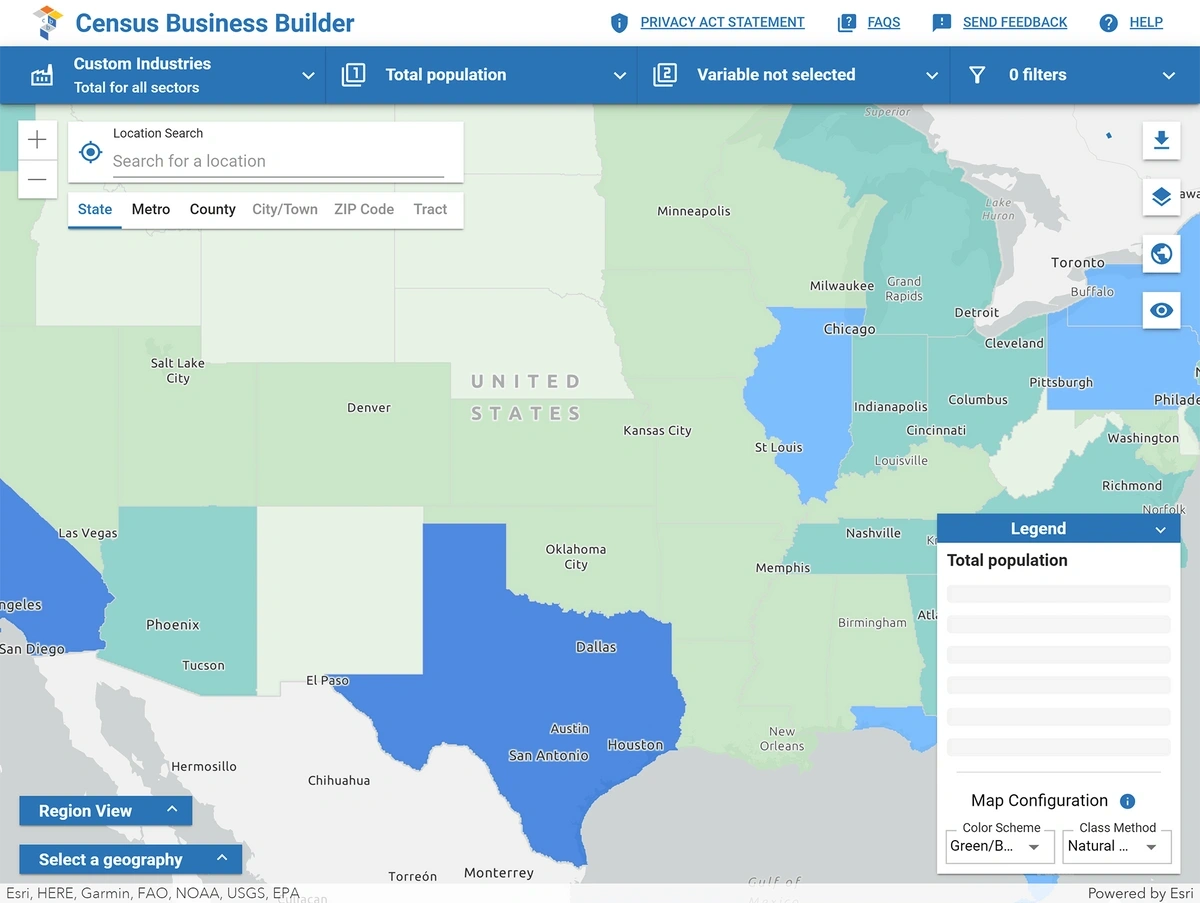
You can use the tool to search by zip code, town, or state and see metrics like:
- Average household income
- Typical education level
The Census Business Builder also has advanced filters that can provide valuable, detailed insights based on the type of business you’re launching.
For example, if you’re opening a fast casual restaurant, you can use the “Consumer Spending” filter and see how much people spend on alcoholic beverages and dining out in a selected region.
You’ll still need to turn Census Business Builder data into actionable insights, though. Once you do, it can be a valuable tool for deciding where to open a new retail establishment.

Who Should Use The Census Business Builder?
Retailers and restaurateurs interested in expanding to new markets can use this tool to find a hot spot. It’s also a useful tool for investors who would like to identify markets for potential investment opportunities.
How Much Does The Census Business Builder Cost?
It’s entirely free.
5. Grand View Research
Grand View Research is a research and consulting company that also offers market reports across a variety of industries.
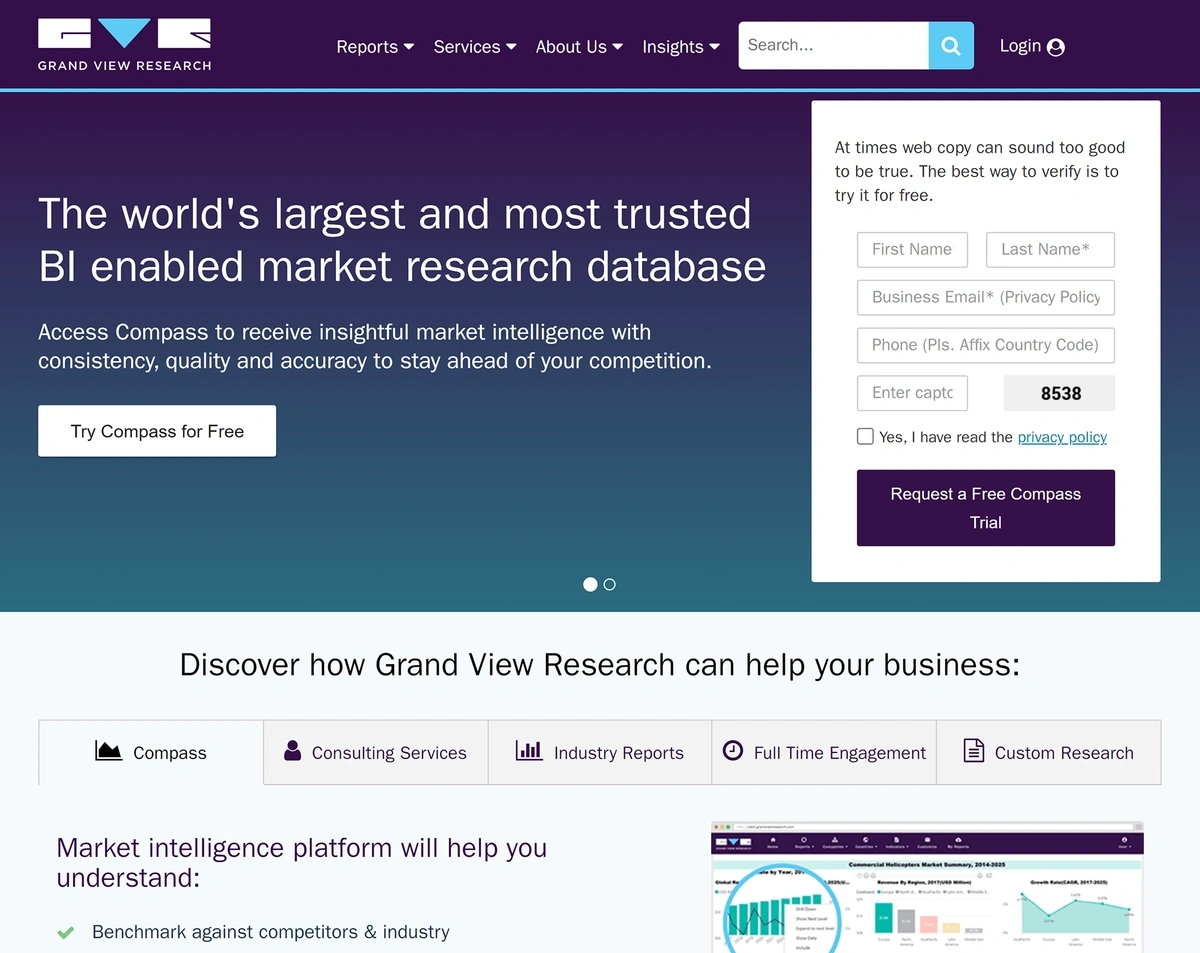
Most of their market research reports provide statistics like market size, compounding annual growth rate, market breakdown by sectors, and competitive analysis.
Grand View's paid offering allows you to segment the data to find more specific metrics (i.e., only data for the Japanese pet market).
In addition to the free reports, Grand View Research also offers custom research services, and you can talk to one of their analysts for personalized assistance.
Who Should Use Grand View Research?
The company’s reports and services are useful for entrepreneurs who want to launch a business, existing business leaders interested in finding new opportunities, and investors looking for high-growth markets.
How Much Does Grand View Research Cost?
You can access limited data about many of Grand View Research’s reports for free; licensing a full report can cost over $3,000. You can also opt to use the company’s self-service market research portal, Horizon Databook , and get additional data points for free.
SpyFu is a search engine optimization (SEO) tool for keyword research and competitive analysis.
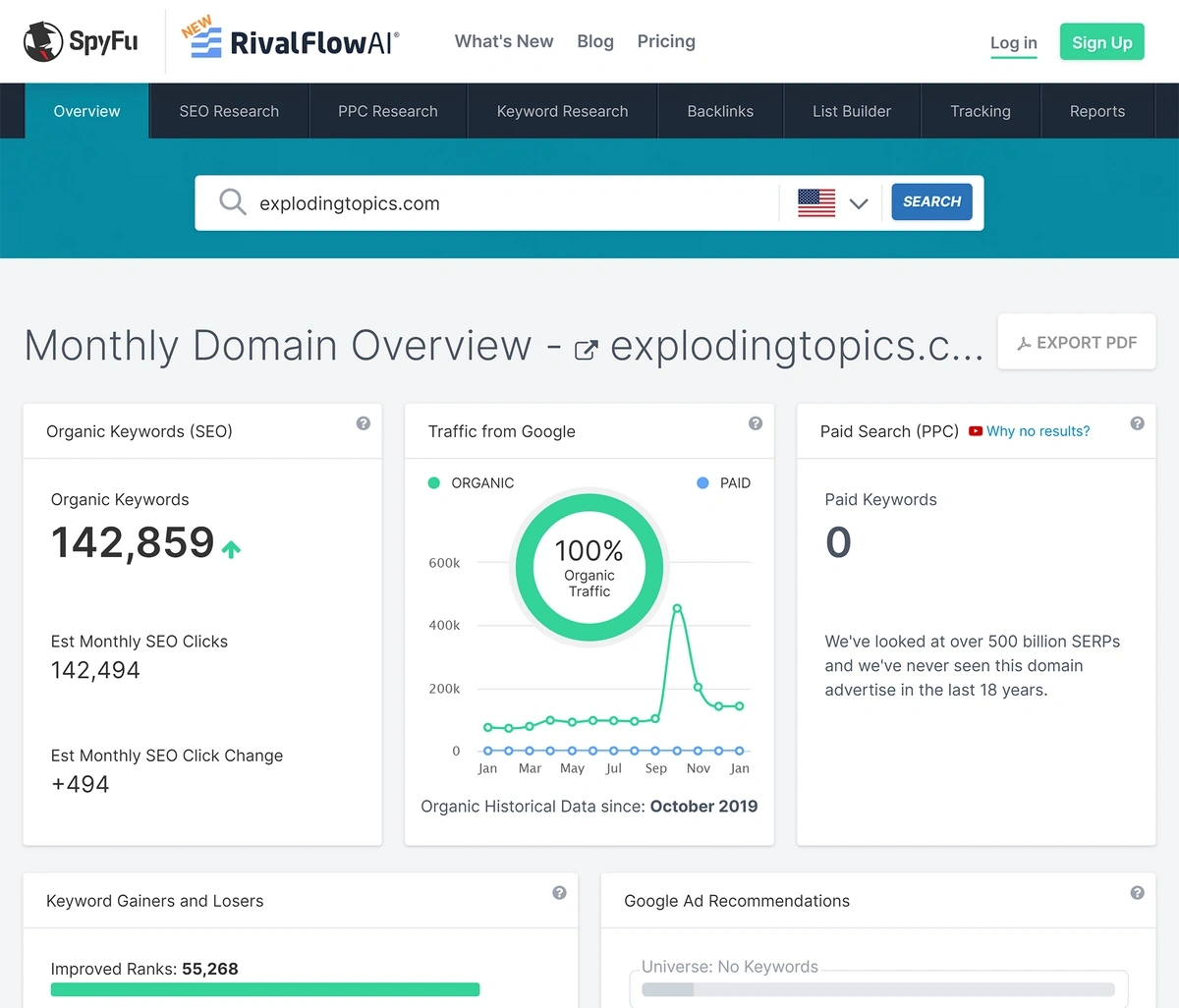
The platform’s various features make it easy to discover the marketing strategies used by top players in your market or industry. Type in any URL, and you’ll be able to find metrics like:
- Total search traffic
- Search rankings
- Current Google Ads
- Pay per click (PPC) ads history
- Paid keywords
You can then use this data to learn more about one of your top competitors or look at several companies in order to better understand a new market.
Who Should Use SpyFu?
Marketers and business leaders can use SpyFu to better understand who their competitors are—and how much they need to spend on marketing in order to be competitive.
Investors can also use SpyFu to research how potential investment targets are investing in marketing (and what kind of growth they’re seeing as a result.)
How Much Does SpyFu Cost?
You can see a limited amount of SpyFu data for free. Paid plans, which give you access to more features, start at $33 per month when billed annually.
7. Crunchbase
The platform makes it easy to find data like how much money a startup has raised to date, who’s investing in a growing business, or who founded a key industry player.
You can also see other data points through Crunchbase, including acquisition and employee headcount.
To use Crunchbase for market research, just type in an industry and filter results by the type of data you’re seeking. Crunchbase will show you a list of companies that meet the defined criteria.
You can also type in a specific company or competitor name and locate data that way, too.
Who Should Use Crunchbase?
Crunchbase is a valuable tool for nearly everyone involved in business management and funding.
- Entrepreneurs can use the tool to explore new markets and find potential investors.
- Business leaders can keep tabs on competitor growth and relevant industry acquisitions.
- VC firms and investors can monitor how others are investing in growing companies, or explore the investment potential in a new market.
How Much Does Crunchbase Cost?
You can see limited information for free; full Crunchbase access starts at $49 per month (billed annually).
Awario is a social media monitoring and brand tracking tool.
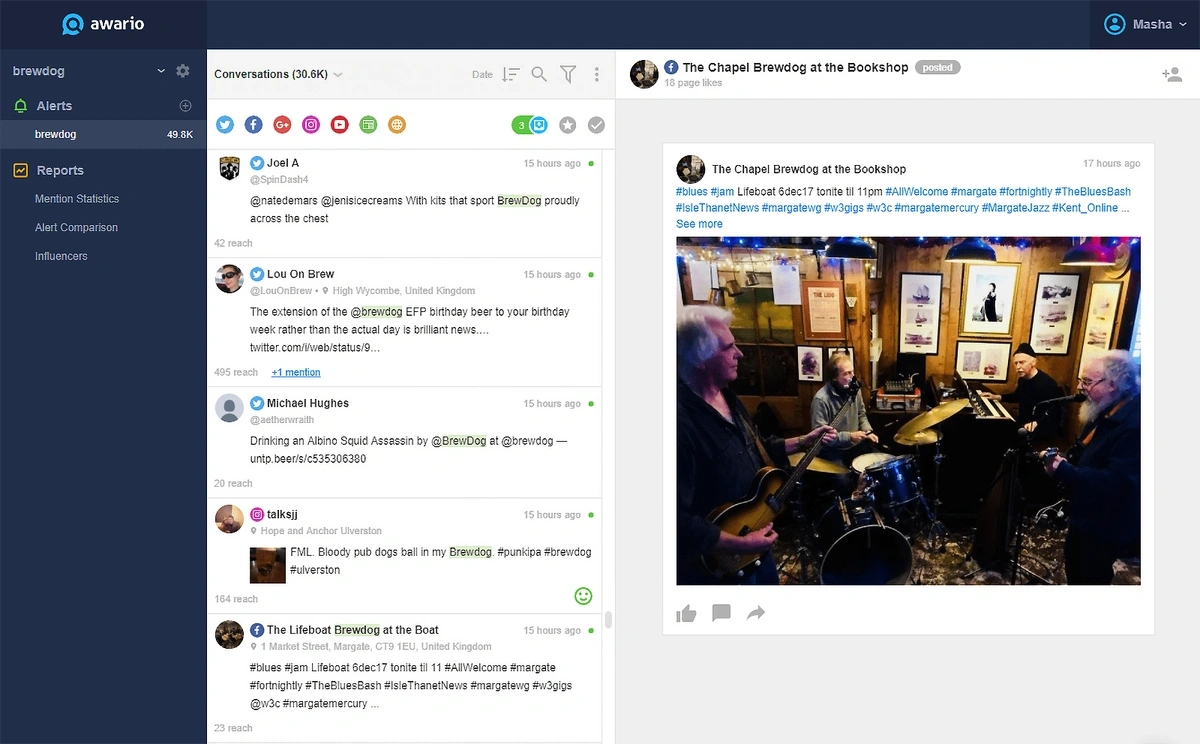
You can use Awario for market research by tracking specific terms on social media. These can include:
- Brand names
- Product keywords
- Industry influencers’ names
For example, if you’re considering building or investing in a mobile app for sleep tracking, you can easily monitor brand names like Oura or keywords like “sleep tracker”.
This makes it easy to see key industry conversations and glean valuable insights about your ideal buyer persona. You can also identify potential gaps in the market.
Awario even tracks sentiment analysis to see how people feel about various competitors in your target industry.
Who Should Use Awario?
Awario is useful for marketers who want to understand their audience’s frustrations or needs, as well as entrepreneurs and product developers interested in using customer data to improve business offerings.
How Much Does Awario cost?
Awario access starts at $29 per month, billed annually.
G2 is a popular software review website.

It’s a great resource for quickly finding quantitative and qualitative data about virtually any software market.
The G2 review structure is helpful as it consists of the following questions:
- What do you like best about (product)?
- What do you dislike about (product)?
- What problems is (product) solving and how is that benefiting you?
This customer experience data is a goldmine for investors and startup founders as it makes it easy to spot gaps in a market and understand key pain points that customers are trying to solve.
Plus, G2 provides a list of competitors for each product—useful for identifying related companies to research.
When browsing G2, you can see details about each reviewer including their:
- Business size
This is all useful for accurately identifying your market’s target demographic. You can also filter a product’s reviews by any of those categories.
The platform makes an effort to ensure that the customer feedback is legitimate by allowing users to verify themselves and even marking incentivized reviews.
Who Should Use G2?
G2 is useful for entrepreneurs and product marketers who want to identify and fill gaps in a market. It’s also a good tool for investors who want to learn more about how real users feel about a potential investment target.
The platform only contains software reviews, though. If you’re looking for reviews of other products and companies, you’ll need to find an alternate source (such as Amazon reviews for consumer goods).
How Much Does G2 Cost?
G2 is free for users to browse reviews, though it offers other paid plans for marketers and investors.
10. Prisync
Prisync is a competitor price tracking tool.
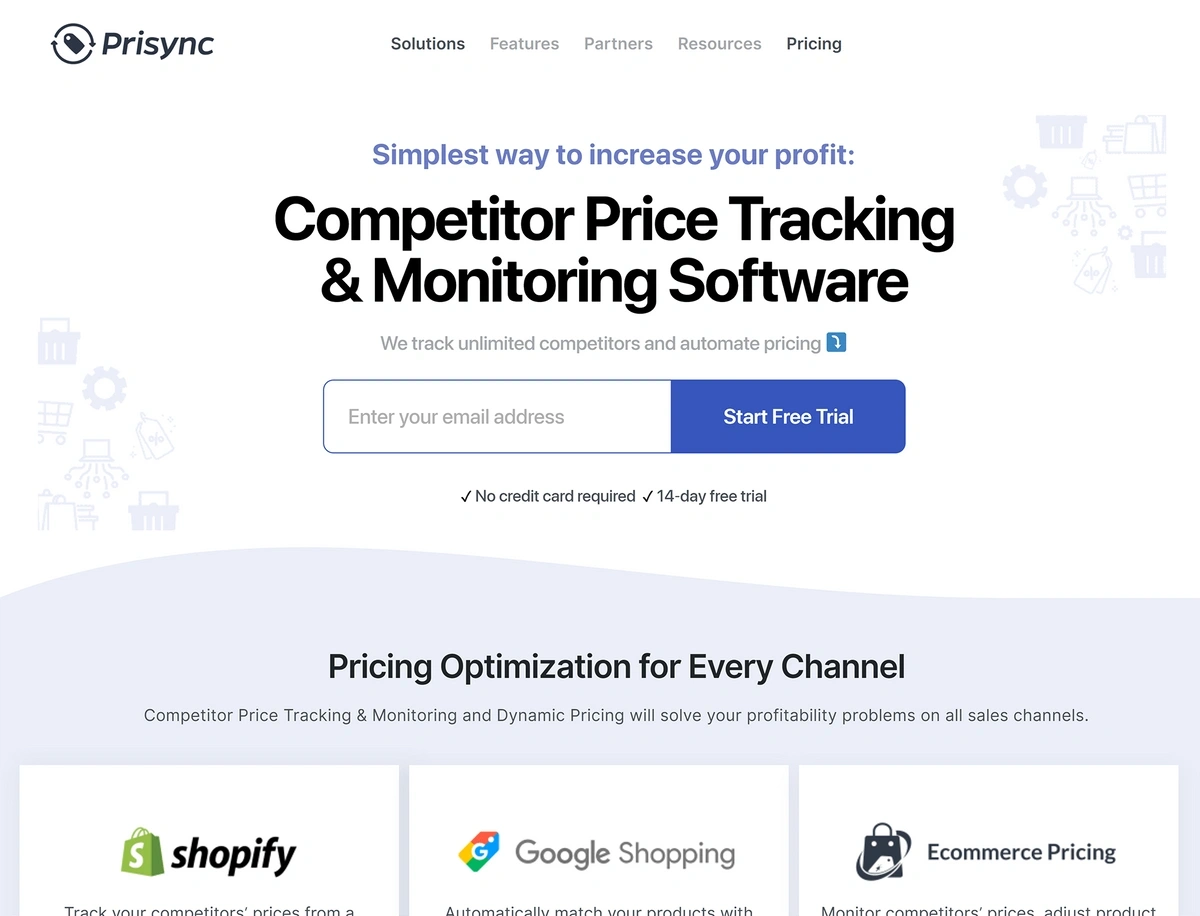
Its automated features make Prisync a great choice for e-commerce entrepreneurs. Use it to:
- Track competitor product pricing and fluctuations
- Estimate customer demand for certain products
- Get price change updates multiple times a day
- Automatically apply dynamic pricing to your own e-commerce storefront
While Prisync is usually best for e-commerce stores that have already launched, you can also use its competitive analysis features to track pricing trends for top players in any market.
For example, in addition to tracking real-time price fluctuations, Prisync also has a price history tracking feature that provides insight into how prices are trending over time, which helps you identify volatility in the market.
Who Should Use Pricsync?
Prisync is most useful for e-commerce startups that want to stay up-to-date with the latest pricing and product trends.
How Much Does Prisync Cost?
Prisync plans start at $99 per month, and pricing depends on the number of products you track. Some features are restricted to higher price tiers, including dynamic pricing, daily email notifications, and API access.
11. Respondent
Respondent is a market research platform for recruiting audience panels.
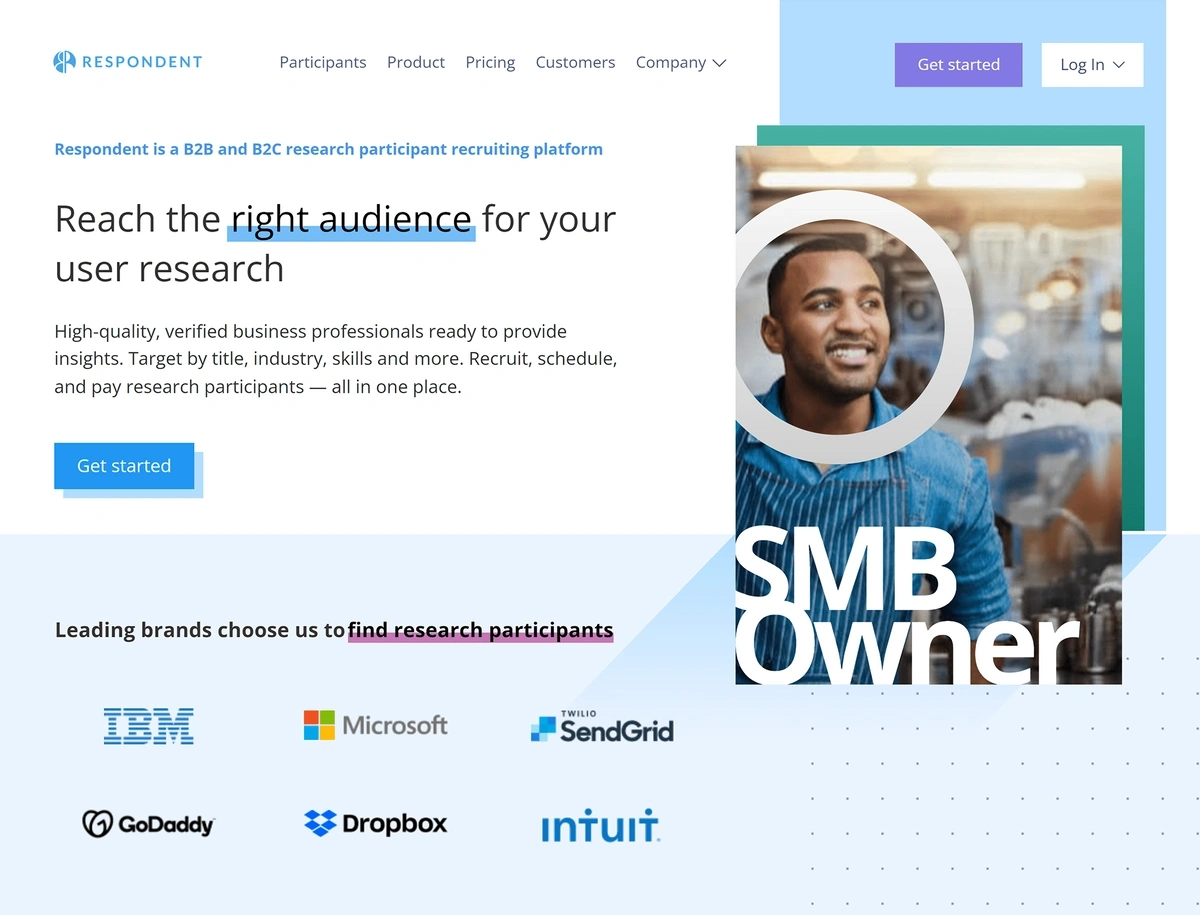
You can use the Respondent service to find vetted audience members that match your ideal target. Submit a request detailing who you want to talk to—such as CFOs and healthcare companies—and Respondent will find people for you.
You can opt to either talk to these people on one-to-one calls (ideal for getting real-time insights) or run group surveys through Respondent.
Who Should Use Respondent?
Respondent is useful for business leaders and entrepreneurs trying to find the right product-market fit for both B2B and B2C audiences. Investors can use Respondent too—it can be a way to research a particular target market before making an investment.
How Much Does Respondent Cost?
Respondent pricing is based on credits. One credit equals one participant in your interview or survey.
Pricing starts at $24 per B2C credit or $40 per B2B credit. These prices vary based on the total number of credits you purchase. However, you’ll also need to factor in separate incentive payments to respondents. Respondent’s incentive calculator can help you estimate this amount.
12. SurveyMonkey
SurveyMonkey is a user-friendly tool for building market research surveys
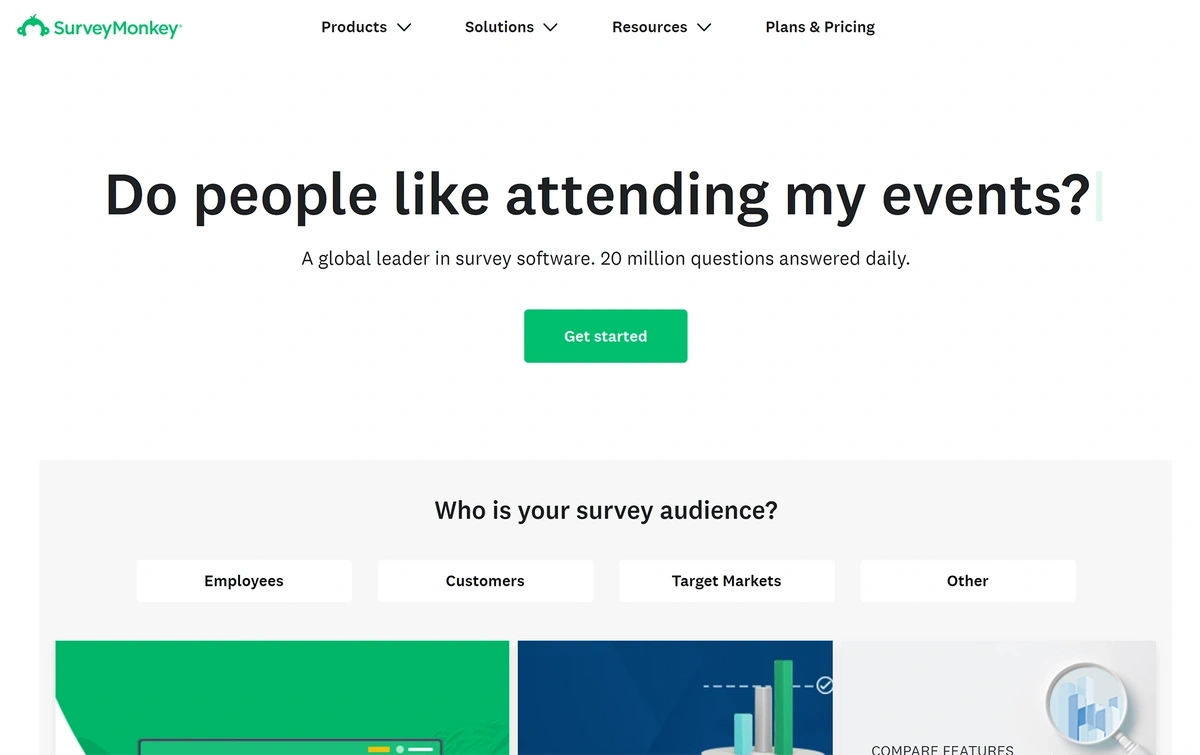
You can choose from multiple survey templates and question types, including:
- NPS surveys
- Product testing surveys
- Customer satisfaction surveys
- Matrix questions
- Open-ended questions
- Rating scales
- Multiple choice questions
If you don’t have an audience to survey, you can use SurveyMonkey’s audience panel service that distributes your survey to a specific demographic.
To use these audience panels, you’ll need to know a few details about your target market—such as “stay-at-home moms with a household income of at least $50,000.” SurveyMonkey will take care of the rest.
It’s important to note, though, that these audiences are fairly broad, such as “college graduates” or “smartphone owners” who meet a few other demographic criteria. If you need highly specific audience curation, you may want to work with a market research firm .
No matter what distribution method you choose, you’ll get to use SurveyMonkey’s drag-and-drop builder to put together questions in your preferred order.
Who Should Use SurveyMonkey?
SurveyMonkey is great for market researchers that want to learn more about a target audience group, as well as business owners and marketing professionals seeking feedback from their existing customers.
How Much Does SurveyMonkey Cost?
You can build limited surveys for free, though they’ll include SurveyMonkey branding. To unlock additional features, you’ll need a paid plan.
SurveyMonkey’s paid plans start at $39 per month, billed annually. You can also request audience responses for $1 each, with a minimum of 200 responses per survey.
Attest is another online survey software option.
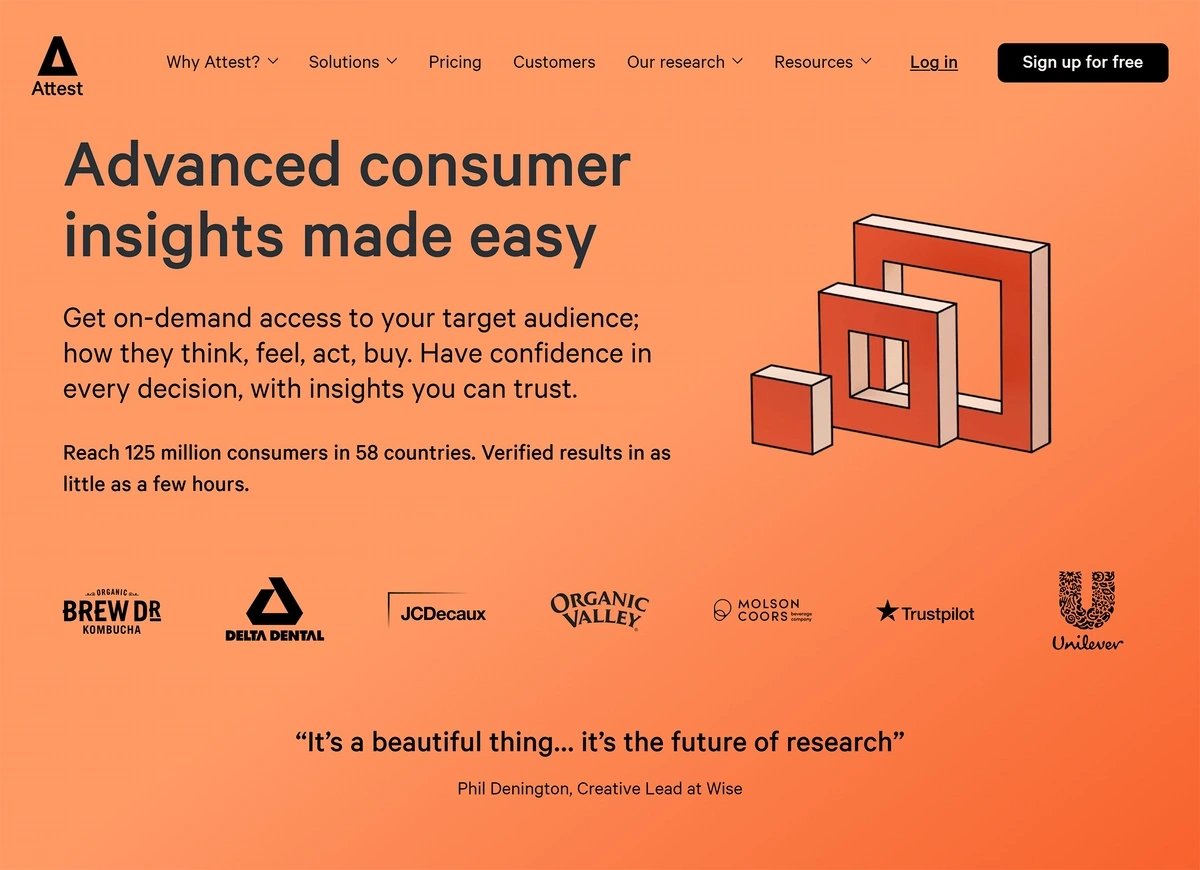
Like Respondent, Attest provides an audience for you to survey. All you need to do is provide demographic information about who you're targeting, and the questions you want to ask.
Attest can assemble audiences from a pool of over 125 million consumers around the world.
The company then uses a mix of AI scanning and human oversight to review the data collected by your attest survey. This is to improve the reliability and consistency of your data.
Attest won't turn your data into insights, though—once you get your results, you'll have to use other tools to help with the analysis.
Who Should Use Attest?
Attest is useful for business leaders or marketers who want to get audience insights or user feedback—without an existing customer base to survey.
Investors could also use Attest to learn more about consumer preferences and habits in a market.
How Much Does Attest Cost?
Attest offers three plans based on usage, but they don't publish their prices online. You'll need to get in touch with the company and request a quote.
14. Qualaroo
Qualaroo is an audience survey tool.
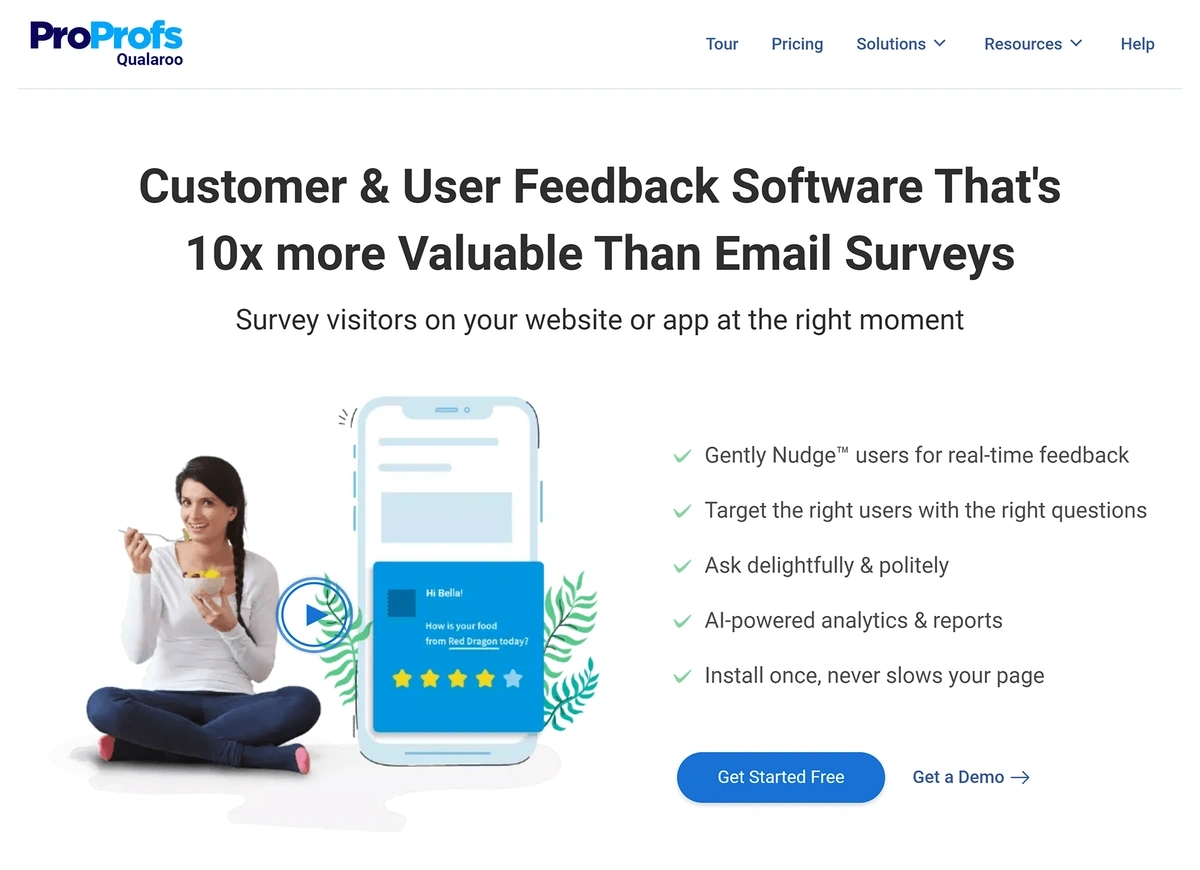
The platform makes it easy to set up questionnaires that appear on your website at different intervals during a visitor's journey.
Companies can use Qualaroo to gather more information about things like:
- Visitor needs and motivations
- App or website user decisions
- Purchase decisions
- Products for sale
You can target website visitors based on time of day, location, and more. This makes it possible to research specific groups of visitors—useful for building or verifying audience personas.
You can also use Qualaroo to collect focus group feedback about website and app prototypes before you launch them.
The company doesn’t provide audiences for you, though, so you’ll need to have a group that you can survey. If not, you’ll be better served by a tool like Attest or Respondent.
Who Should Use Qualaroo?
Any business leader or entrepreneur in need of audience data can use Qualaroo to get feedback from real customers and leads, build out audience surveys, plan marketing campaigns, and more.
How Much Does Qualaroo Cost?
Qualaroo's free plan allows users to collect up to 50 survey responses a month for free. If you want higher usage limits, you'll need to subscribe to a paid plan.
The company's business tier plan costs $39.99 per month (or $19.99 per month when billed annually) per 100 responses.
You'll be billed extra for any month in which you go over 100 responses; the total cost depends on volume.
15. ChatGPT
ChatGPT is an AI chat assistant that can help you plan for and analyze market research efforts.
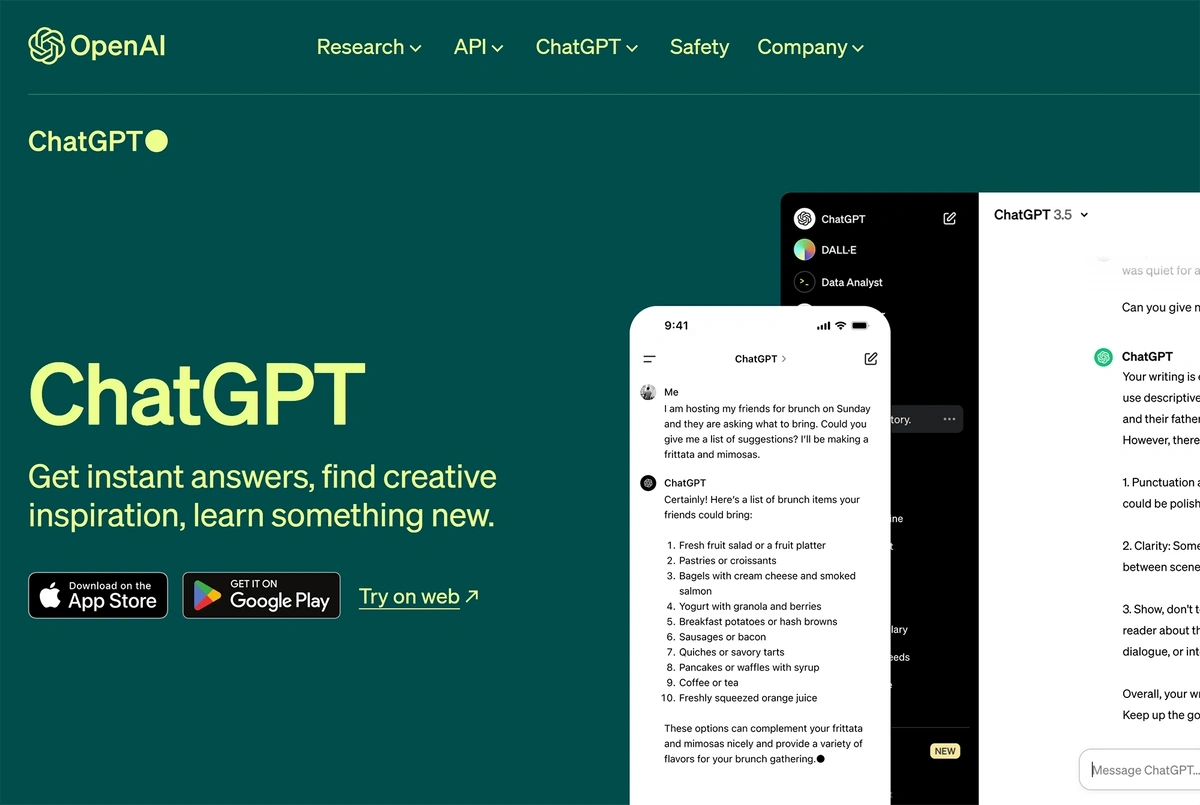
There are several ways that ChatGPT is useful during the market research process, including:
- Reviewing information about your target audience and creating survey questions
- Processing and analyzing data collected from tools like Attest or SurveyMonkey
- Analyzing, summarizing, and answering questions about data-heavy PDF reports
- Creating customer persona documents
If you have a ChatGPT Plus plan, you can even train your own GPT to produce the analysis or content that you need. It's possible to save and reuse these GPTs so they can speed up your workflow, too.
All generative AI tools do carry a risk of inaccuracies, though, so you’ll want to make sure to double-check ChatGPT’s outputs before using them or feeding information back into another market research tool.
Who Should Use ChatGPT?
ChatGPT can be a useful tool for anyone conducting market research manually, whether that involves sorting through data, writing questions, or segmenting audiences to survey.
How Much Does ChatGPT Cost?
It's free to use ChatGPT, though you may run into some feature limitations. You'll also have to use a slightly older version of the GPT AI, which can lead to more errors.
To customize your experience and get more tools for document analysis, you'll need a ChatGPT Plus plan starting at $20 per month.
16. Optimal Workshop
Optimal Workshop is a user experience (UX) research tool.
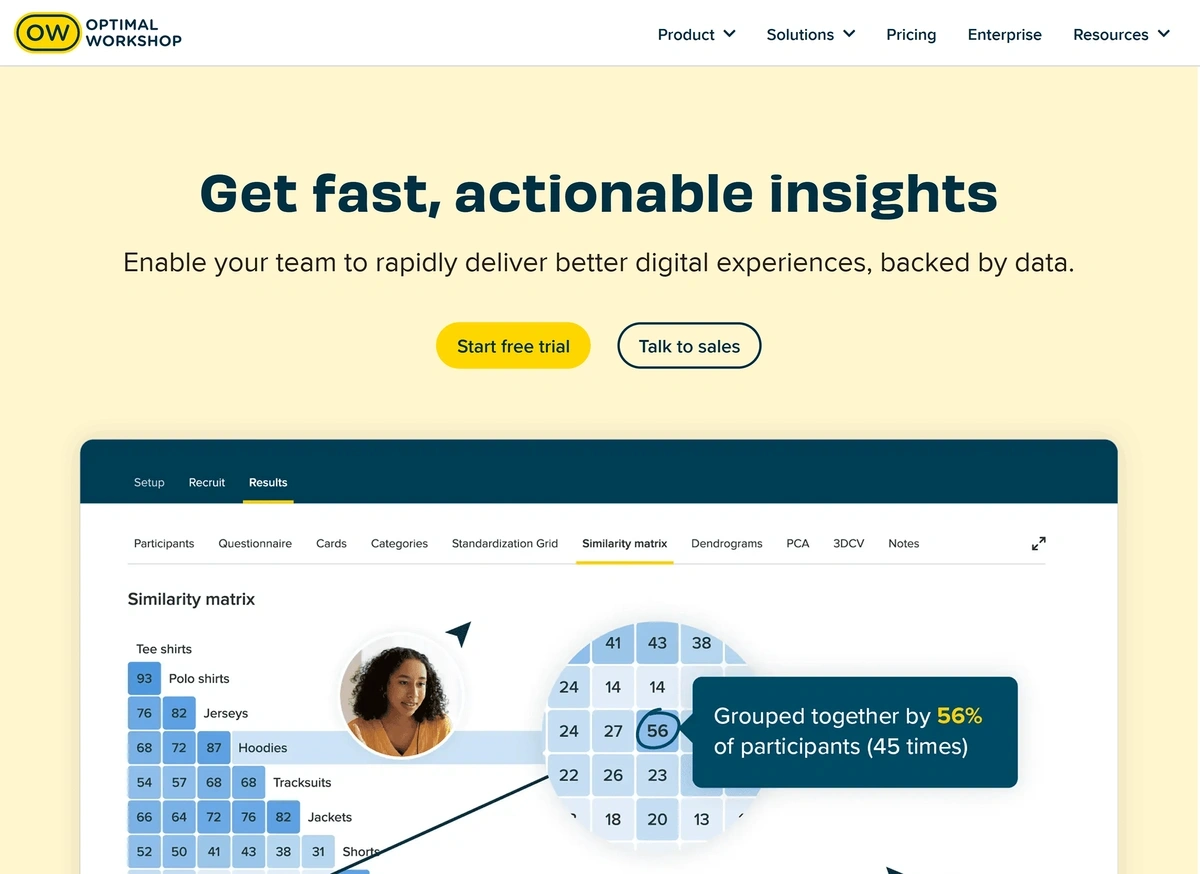
The platform facilitates research, data collection, and data visualization through:
- Card sort tests
- First click tests
Card sort tests are the most useful for teams interested in gathering market research data. By presenting a sample audience with examples of products and categories—and then asking them to group and rank each item—you can get a sense of:
- What your target audience is and is not interested in
- How your potential customers think about products and categories of items
- Whether certain colors, terms, and images are more appealing than others
You could run these card sort tests with actual products that you sell or with ones you’re considering creating or adding to your inventory.
Who Should Use Optimal Workshop?
Marketers and business leaders can use Optimal Workshop’s card sort tests to evaluate how members of a new market or audience think about products—and what their preferences are.
How Much Does Optimal Workshop Cost?
Optimal Workshop plans start at $191 per user, per month (billed annually), with a minimum of three users. Because of this, it’s best suited for organizations that plan to conduct UX research after moving through market research and card testing.
17. AlsoAsked
AlsoAsked is a tool that produces frequently asked questions on any topic.
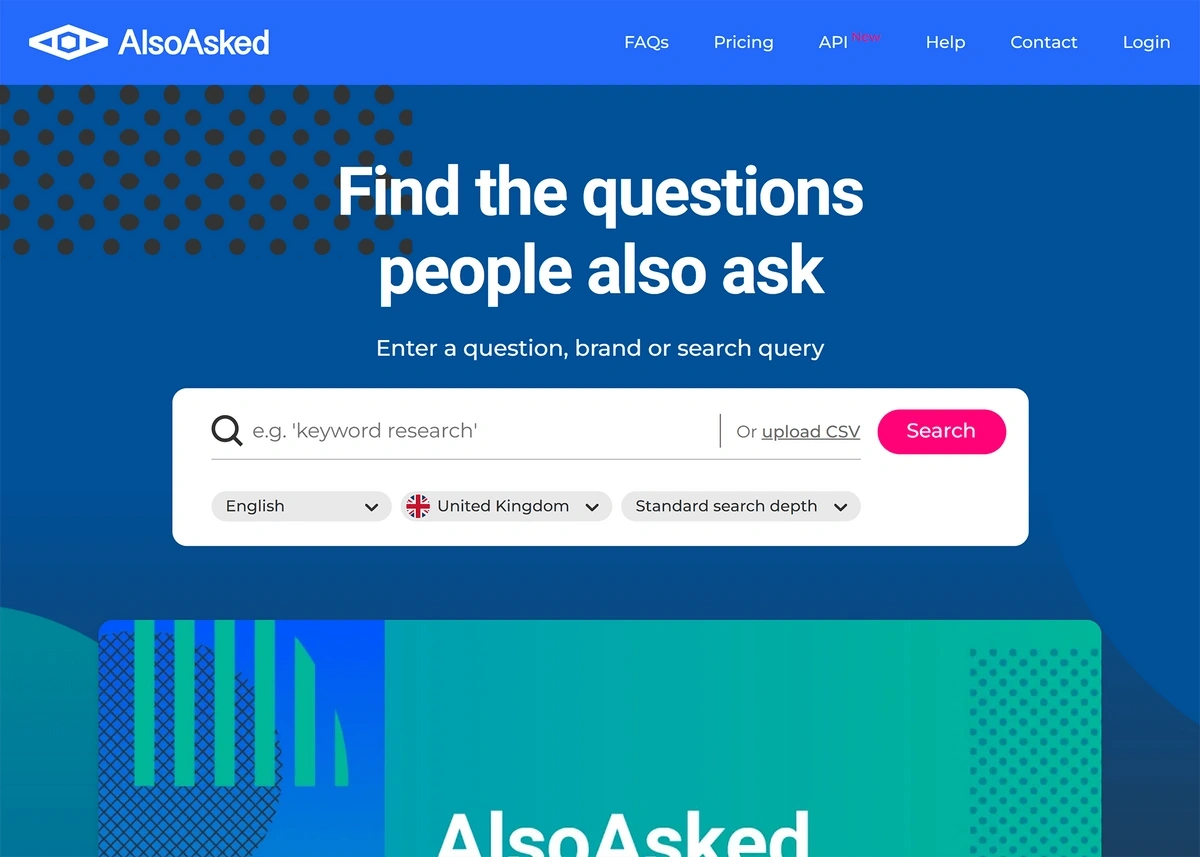
The way it works is simple—type in a phrase, set your language and location, and see related questions that people are typing into search engines.
Questions display in tree format, so you can see how different queries relate to each other. One click on any group of questions opens up a new tree, so you can dig down even further into related subtopics.
Who Should Use AlsoAsked?
AlsoAsked is useful for anyone who’s conducting preliminary market research. Because you can adjust results by location and language, you can use AlsoAsked to get a feel for:
- What people want to know about a topic, product, or service
- Whether their questions increase, decrease, or change based on location
- How a market’s concerns, interests, and queries change along with language
You won’t be able to do all of your market research in AlsoAsked, but it can give you ideas for survey questions to ask, industry trends to track, and more.
How Much Does AlsoAsked Cost?
AlsoAsked is free to use, though you’re limited to three searches per day. To raise usage limits, bring up increasingly detailed results, and unlock multiple export formats, you’ll need a paid plan. Options start at $12 per month when billed annually.
If you’re new to the market research process, then these tools will help you set benchmarks, get key consumer insights, and collect data for decision making. But even the best market research tool can only go so far—you also need to have a solid understanding of the research process and key industry shifts.
To make sure that you’re getting the most out of your preferred research solution, check out our guide to conducting research for new product development —and look at the biggest trends in market research happening right now.
Find Thousands of Trending Topics With Our Platform

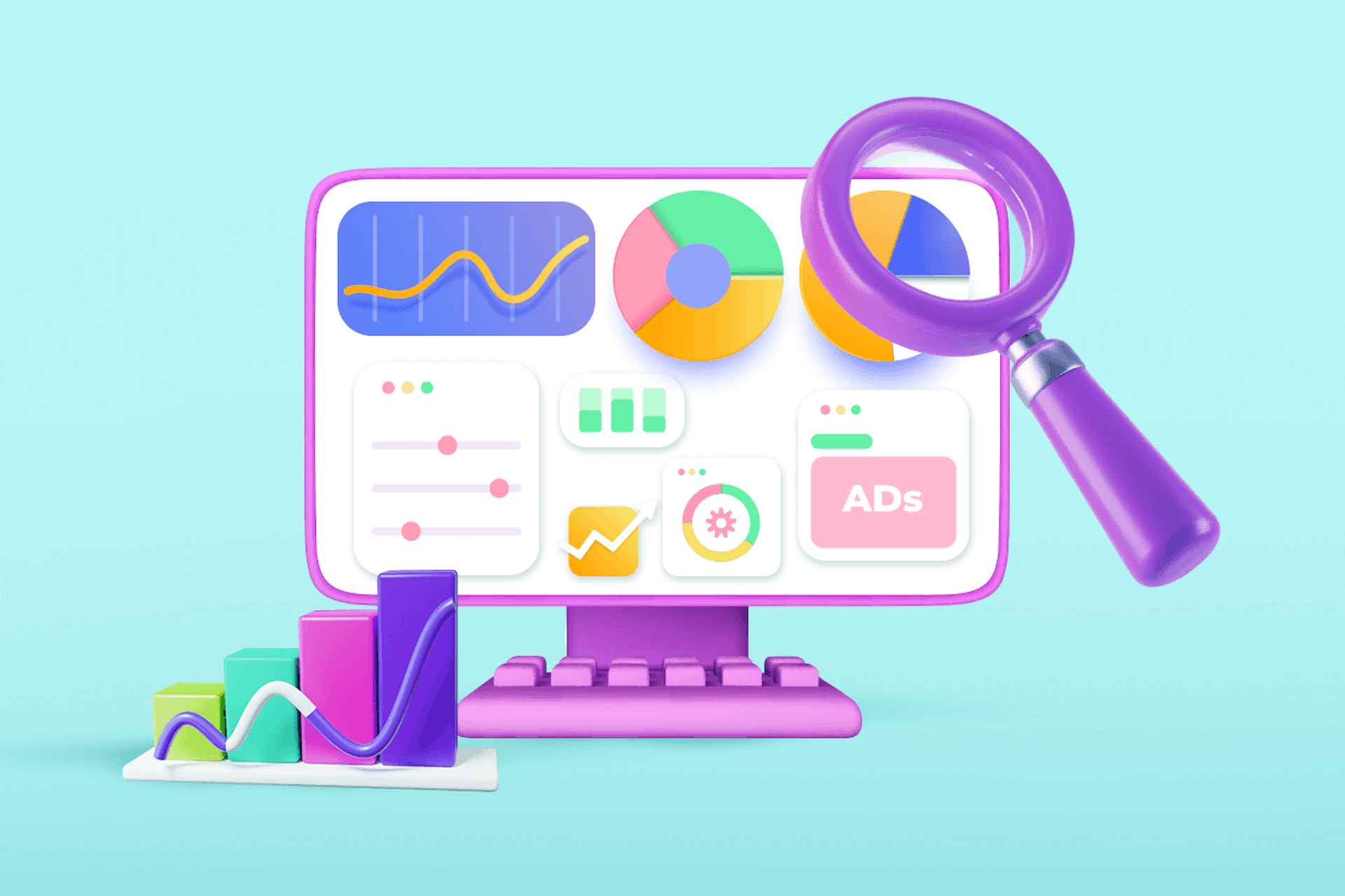
The 13 Best Market Research Tools in 2024
Jul 26, 2024
10 min. read
The 328 million terabytes of data we create each day can be very telling about your target audience’s preferences and buying habits. This same data can also be inaccurate and low quality, depending on the source. That’s why the market research tools you choose matter — you need to be able to get the most up-to-date insights and trust what the data is telling you.
While traditional manual methods of market research and secondary research (aka desk research or complementary research ) still have a time and place in the digital world, marketers are supplementing them with market research platforms and software that do most of the heavy lifting.
Astronomical amounts of market-related data are created at lightning speed, far outpacing our ability to consume it all. To help find, filter, sort, and make sense of all this information, we’ve chosen 13 of the best market research tools to streamline and improve the process :
Meltwater Radarly
Think with google, ubersuggest, surveymonkey, answer the public, brandmentions, heartbeat ai, u.s. census bureau.
Tip: Also take a look at the top secondary research companies out there.
A leader in AI market research tools, Radarly is Meltwater’s AI-powered market research platform that provides real-time insights into consumer preferences . This always-on consumer intelligence suite uses a combination of data science, AI, and human market research expertise to surface insights about customers based on online conversations and activities.

Most of the world’s data is unstructured ( about 90% , by some estimates), making it harder to act on and understand its significance. Radarly brings structure to the unknown by detecting patterns and understanding audience sentiments.
Also, Meltwater for market research continuously sources new information and works in real-time. This gives marketers an advantage by working with the latest data so they can make informed decisions when it matters most.
See Meltwater Radarly live in action by requesting a free tour of our platform. Simply fill out the form at the bottom of this post and we'll be in touch.
Statista offers data trends and reports on a wide range of topics and interests, from Facebook’s monthly active users to leading beer brands based on sales. In total, the market research platform spans more than 170 industries and 150 countries .
What sets this resource apart is its visualizations — all of Statista’s stats have been compiled into neat and tidy graphs that are ready to publish or share in your own reports. This makes it easy to see trends over time or gain quick insights about consumer preferences.

There’s a chart for just about anything, and they’re updated on a regular basis. In many cases, Statista will include a brief explanation of the chart’s findings and recommend related charts for further research.
Google’s status as the world’s most popular search engine makes it a great resource for market research. Google has access to billions of first-party data points based on what people are searching for online.
For market research purposes, users can tap into Google Trends to see the popularity of searches over time. See the terms that are trending on a daily or weekly basis, or check out shopping-related trends to predict the hot new products of the season ( trend prediction ).
Google’s Market Finder can also pinpoint new markets that might be a great fit for your product or service. Learn how various markets compare to each other and how your business might fit in.

And if you’re selling physical products, you can see how sales trends might impact your business using Google’s Rising Retail Categories . Retailers use this tool often to predict hot-selling holiday items and right-size their inventory.
Attest brings old-school focus groups and surveys into the digital era with its rapid-response approach. In the past, organizing interviews and focus groups took weeks or even months. Once the research activities were finished, analysts required additional time to compile the results. No more.

With Attest, you can hear directly from consumers who fit your audience profiles, with ready-made questions and respondents at your fingertips. All responses are recorded in the Attest platform, and the market research software analyzes results and collects consumer insights on your behalf.
Users pay per response, so you can scale your market research as needed.
A popular survey tool, Typeform offers a mobile-friendly way to collect market research insights . It’s unique in that it only shows users one field at a time to limit distractions. The look and feel lend to a more casual, conversational approach, which may encourage survey takers to be more candid in their responses. (We can’t prove it, though.)

Users can create various question types, including multiple-choice questions, open-ended questions, and scale ratings. It’s intuitive and makes basic market research a breeze.
Ubersuggest, a popular k eyword research tool , also has market research capabilities packed into its user-friendly interface . That’s because keyword research is a form of market research , giving you a glimpse of what people are actively searching for online.

Let’s say you’re launching a new facial cleaning device for your beauty brand . By using Ubersuggest for keyword research, you can also uncover:
- Other brands selling facial cleaning devices
- Publications talking about facial cleaning devices
- The popularity of online searches for facial cleaning devices
- Competition for related keywords
- Questions related to the keyword “facial cleaning device”
- Cost per click to rank for the keyword via paid ads
- Search volume (and interest) over time
This is a great tool to help you see who your top competitors are online, what type of content ranks well for a keyword, and how crowded a market is for a particular product or service.
Market Research doesn’t always have to be a costly, complex beast, and SurveyMonkey is a great example. This easy-to-use survey tool can create simple or in-depth surveys sent to targeted audiences for feedback.

For example, you might have one-off questions to ask customers who made a purchase to learn more about their buying habits. Or, you might want to send longer surveys to customers to help develop a new product. No matter your use case, you can customize surveys to reach highly specific audiences and compile their answers instantly.
SurveyMonkey also offers turnkey market research solutions, including a global panel survey, translation services, and a reporting dashboard. These services can help you reach more people and get more use from your data.
Answer the Public is a free search listening tool that compiles the questions people are asking online. These questions can serve as a starting point for new product development, product improvements, and content marketing .

This market research software uses autocomplete data from Google . When you start typing a search, Google will try to guess what you’re looking for based on what other people have searched for. You can do this manually, but it’s time-consuming and relies only on your ideas.
Answer the Public makes life easier by compiling related questions in an easy-to-understand graphic. And since the data comes from Google, market researchers can trust its reliability and quality.
Ever wonder what it is about a brand (including yours) that people love? The things that get people talking? BrandMentions can help provide some context.

Specializing in social media monitoring , BrandMentions takes the next step into showing why a particular keyword is buzzing. Type in a keyword and you’ll see recent social media posts that also contain that keyword.
You can also see the keyword’s Reach, Performance, and Number of Mentions — all of which can come in handy when you’re planning a new product launch. You can use these insights to plan your launch-related posts to generate the most buzz.
Tip: Learn more about brand monitoring , brand tracking , brand reputation measurement , about the best brand tracking software , and understand why your brand mentions are spiking .
AI market research tools like Heartbeat AI allow you to put market research on autopilot , or at least close to it. Using sentiment analysis , this market research tool recognizes themes and trends in qualitative text data.

No more poring through pages and pages of text — Heartbeat AI can quickly surface insights about how your audience feels regarding your brand or products (or your competitors). What’s more, it can turn these insights into attractive visuals for simpler understanding or sharing with other stakeholders.
Qualitative research can be more difficult to sort and analyze because it contains more variables. Unlike quantitative research, which deals with specific, measurable data, qualitative research involves the complexities of human behavior and perception. The results are subjective in nature, and it involves more work to extract their value.

Discuss aims to change the narrative with AI-powered insights . Offering video capabilities, built-in note-taking, and auto-generated highlight reels, marketers can capture the “Aha!” moments without losing efficiency.
The market research platform makes it easy to refer back to conversations and keep their audience engaged throughout the process, leading to more complete data.
One of the oldest but most trusted market research sources , the U.S. Census Bureau offers basic demographic information about U.S. citizens. This platform gives you instant insight into America’s people , including things like family sizes, income levels, and populations.

Beyond demographics, the market research platform has thousands of tables and maps to bring your research to life. You can customize your own maps and tables using any of the data available.
Another option is to find your business’s North American Industry Classification System (NAICS) code , and then filter the Tables tool to focus on your industry. This allows you to see where your industry is most popular and where it might be over- or under-saturated.
Tableau from Salesforce is a business intelligence platform that connects to all of your data sources, making it easier to connect the dots between disparate systems. It excels at transforming unstructured data into visualizations to streamline decisions.

Their goal is to democratize data and make it more accessible and user-friendly. It accomplishes its mission with a user-friendly interface, visual data transcriptions, and a community of more than a million members who share how-tos and best practices.
Make Your Market Research Tools Work for You
Online market research tools aren’t replacing the traditional survey or focus group — they’re enhancing them by providing an always-on approach to speed up results. By tapping into the wealth of data people are openly sharing online, businesses can gain more insights than ever before, on demand.
Meltwater offers some of the best tools for market research that are accurate, reliable, and easy to use. By tapping into billions of data points and analyzing them in the context of your business, you can make valuable data-driven decisions to move your company forward.
Learn more when you request a demo by filling out the form below:
Continue Reading

How To Do Market Research: Definition, Types, Methods

What Are Consumer Insights? Meaning, Examples, Strategy

Market Intelligence 101: What It Is & How To Use It
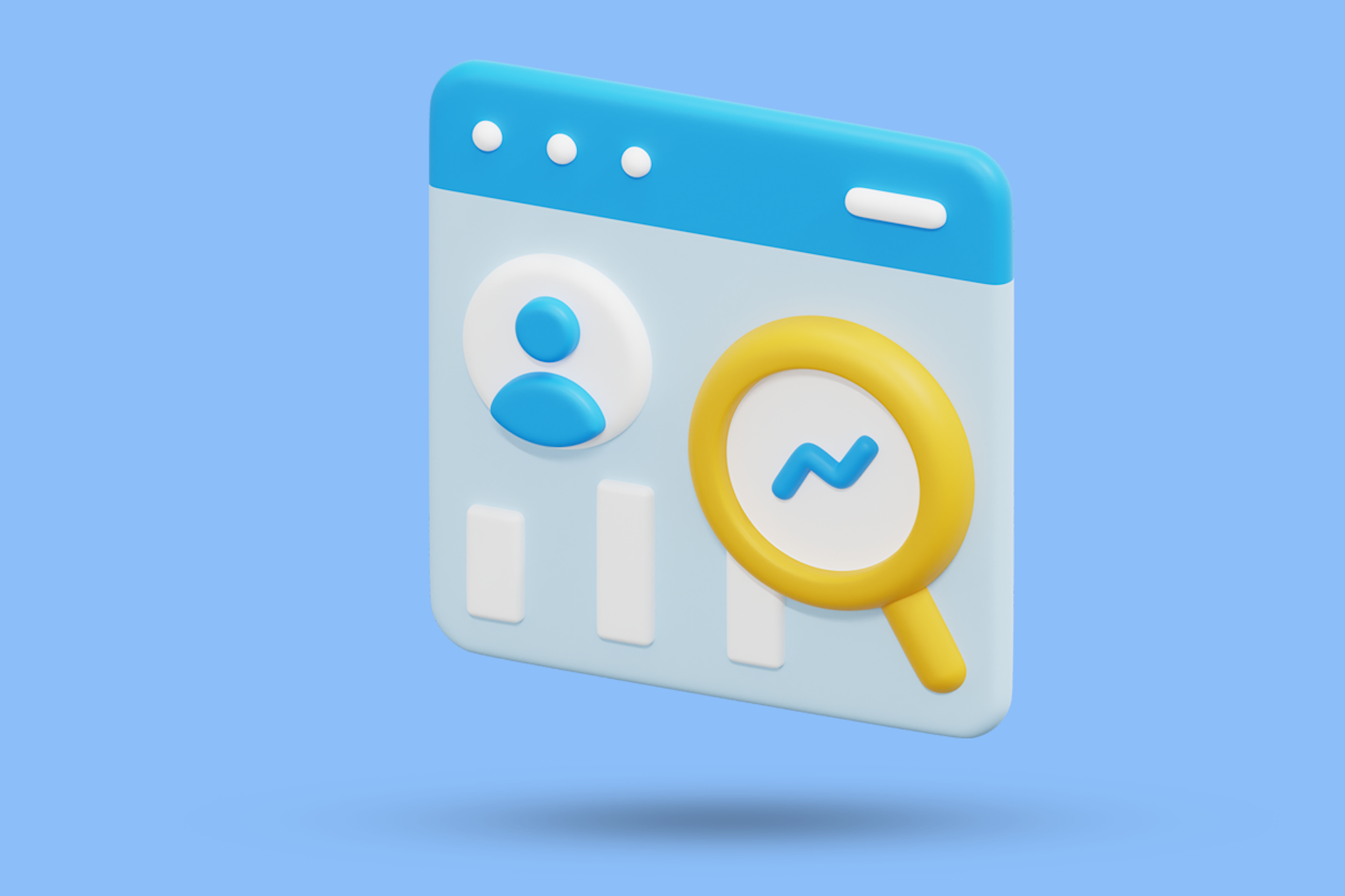
Consumer Intelligence: Definition & Examples

Secondary Research Guide: Definition, Methods, Examples

What Is Desk Research? Meaning, Methodology, Examples

Top Secondary Market Research Companies | Desk Research Companies
- Integrations
- Case Studies
- State of Competitive Intelligence
- Partner Directory
- In the News
- Crayon Academy
Crayon Competitive Intelligence blog
The 8 free market research tools and resources you need to know.

With over 400,000 new businesses opening in the United States each month, the need for individual companies to conduct their own market research has never been more urgent. However, conducting market research isn’t an easy task — it presents challenges to businesses of all shapes and sizes.
With that being said, those with large budgets do enjoy certain advantages. When you have access to an endless array of top-tier tools and resources, you can uncover strategy-changing insights with relative ease.
Does that mean businesses with small (or non-existent) budgets are out of luck? Absolutely not.
Nowadays, free market research tools and resources are abundant — and you’ll be familiar with eight of our favorites by the time you’re done reading this blog post.

But first, some housekeeping:
What is market research?
Market research is the process of gathering and analyzing information about your customers — both current and prospective — with the intent of optimizing your business strategy.
Customer-related information that you may want to gather includes (but is not limited to):
- The goals they want to achieve
- The pain points they want to alleviate
- The income or budget that constrains them
- The products and/or services they use (a.k.a. your competitors)
- The strengths and weaknesses of the products and/or services they use
Why is market research important?
Market research is important because — if you’re thorough and open-minded — it dramatically improves your chances of long-term success. Only through market research can you uncover the insights you need to develop a product or service that (1) satisfies the demands of your prospects and (2) stands out from the competition.
For a complete overview of how conducting market research can benefit your business, here’s Market Research Defined and How to Get Started .
Cool? Cool. Let’s dive into the good stuff.
Top 4 Free Market Research Tools
For clarity, we will define a free market research tool as any tool that:
- Costs nothing, and
- Helps with the collection and/or analysis of customer-related information
Keep in mind that “customer-related information” encompasses everything from a pain point to a weakness of one of your competitors’ products.
1. Google Trends
If you want to get a sense of the level of interest in a particular product or service — as well as how that interest fluctuates over time and across regions — Google Trends is an excellent tool.
All you need to do is enter a search query and toggle with the filters. As an example, take a look at the level of interest in “office supplies'' in the U.S. over the past five years. Perhaps unsurprisingly, interest peaked in February 2020 — at the onset of the COVID-19 pandemic:
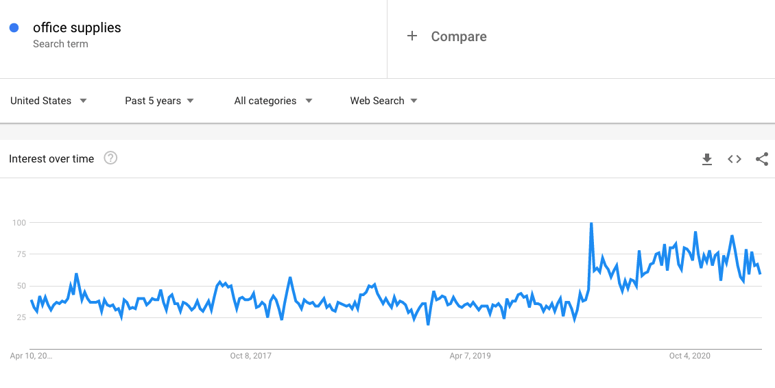
Plus, you can explore variations in interest across the 50 states, as well as related topics and queries that are surging in popularity:
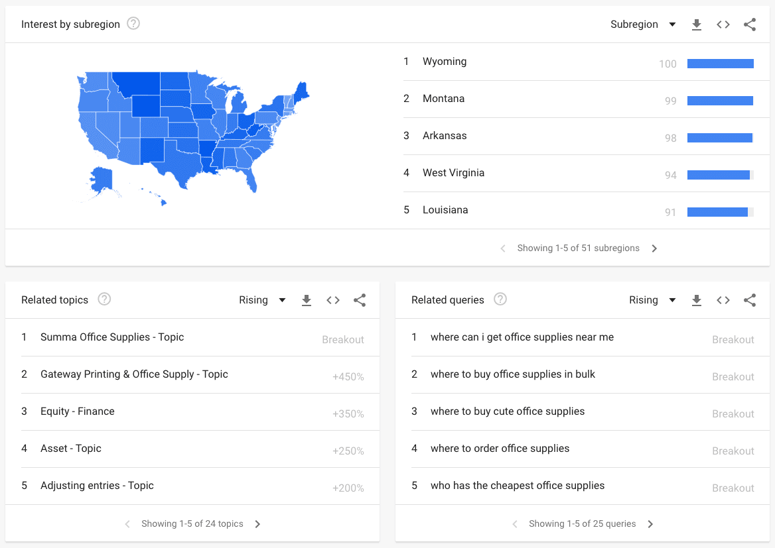
The “interest by subregion” data is powerful. In Wyoming, searches for “office supplies” account for a greater percentage of all search queries than in any other state. Your average resident of Wyoming, in other words, is more interested in searching for office supplies than is your average resident of, say, Louisiana — a valuable insight for anyone who sells office supplies online.
Equally valuable is the insight that searches for “where to buy office supplies in bulk” are on the rise — potentially indicative of an emerging pain point.
2. SurveyMonkey
As some of you already know, one of the best ways to conduct market research is to ask your customers a handful of open-ended questions. You can do this for free with SurveyMonkey .
Specifically, with a free SurveyMonkey account, you can ask up to 10 questions and field up to 40 responses with each of your surveys.
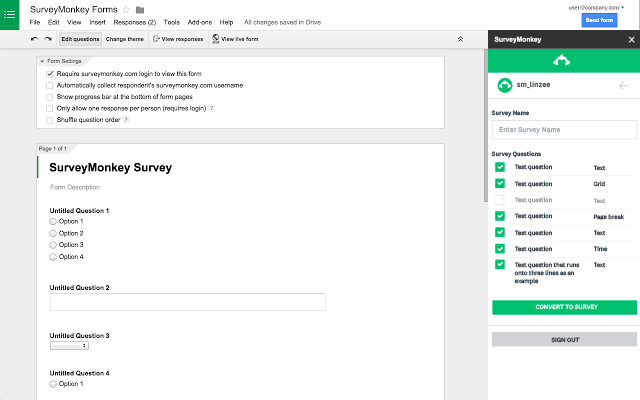
Open-ended questions you may ask your customers include (but are not limited to):
- Why did you buy our product?
- What has our product helped you accomplish?
- How does our product compare to others that you’ve used in the past?
With just three questions — well under the limit of a free survey — you can learn quite a bit about your target market. If, for example, the majority of respondents say they bought your product because they were struggling to do their jobs in a cost-effective manner, that gives you a clearer picture of your prospects’ pain points and your competitors’ weaknesses .
3. Make My Persona
As you collect and analyze customer-related information, it’s a good idea to create or tweak your buyer personas : detailed profiles of the semi-fictional people for whom your product or service is designed. In the context of market research, personas are useful because they help you synthesize and comprehend the information you’re gathering.
Thanks to our friends at HubSpot, you can use a wonderful free tool called Make My Persona .
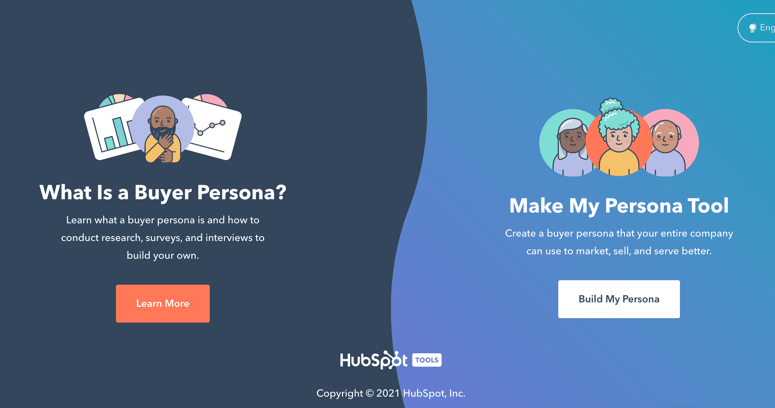
Intuitive and fun, Make My Persona is a seven-step process that walks you through the essential components of your target customer: demographic information, firmographic information, job title, pain points, and so on. And if you want to go beyond the bare essentials, you can add as many extra sections of information as you like.
Important note: Your personas should be dynamic. As you conduct further market research and learn more about your target customers, your personas should evolve accordingly.
4. WordSift
Make My Persona is appealing, in part, because it enables you to make sense of raw data — to separate the signal from the noise. The same can be said about WordSift , the final free tool we’ll be discussing today.
Built to help teachers with the instruction of vocabulary and reading comprehension, WordSift allows you to generate word clouds: images that represent the frequency with which certain words are used in a given body of text. Look what happens when I copy the introduction to this blog post and paste it into WordSift:
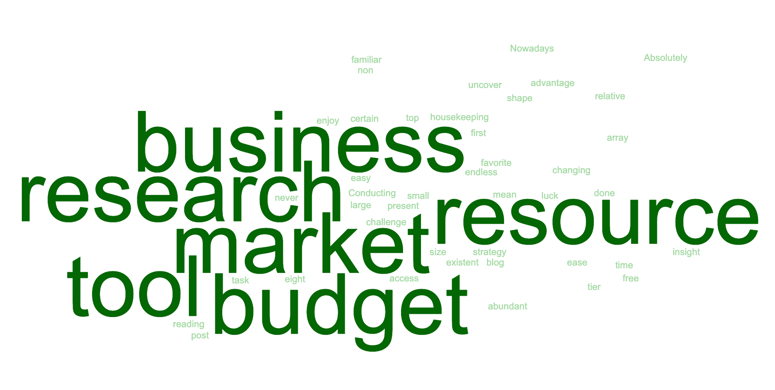
Instantaneously — and unsurprisingly — I can conclude that “business,” “market,” and “research” are among the most frequently used words in the introduction to this post.
What does this have to do with market research? Well, let’s say you’ve been using SurveyMonkey to ask your customers about their reasons for buying your product. One by one, if you were to copy their responses and paste them into WordSift, you’d be able to see which words your customers use most often. That’s a market research gold mine!
Top 4 Free Market Research Resources
Again, for clarity, we will define a free market research resource as any resource that:
- Helps with the collection of customer-related information
The scope of “customer-related information" remains the same — encompassing everything from a pain point to a weakness of one of your competitors’ products.
5. Bureau of Labor Statistics
A government organization that “measures labor market activity, working conditions, price changes, and productivity in the U.S. economy to support public and private decision-making,” the Bureau of Labor Statistics (BLS) is a wealth of information.
Because this is a blog post about market research — not an economics class — we’ll focus on BLS’ industry- and region-specific information. If you’re on the homepage and you hover over the Data Tools drop-down menu, you’ll see a hyperlink to something titled “Industry at a Glance.” Click on that, find your industry of interest, and explore the dozens of statistics that BLS has aggregated.
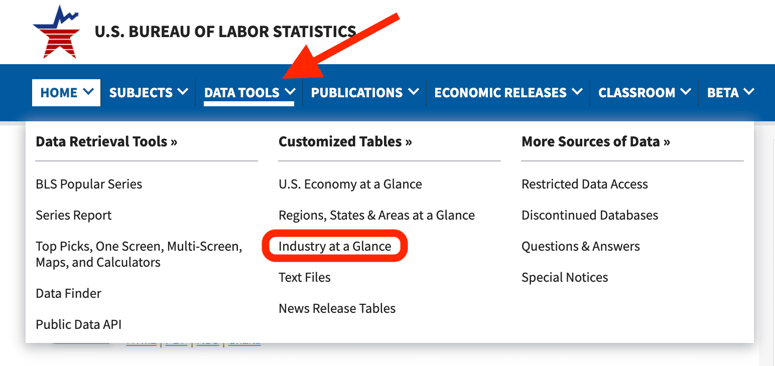
If, for example, you’re interested in the apparel manufacturing industry — either because you’re in the industry or you sell into it — you can see how earnings, prices, and productivity figures are changing over time.
Head back to the homepage, hover over the Subjects drop-down menu, and you’ll see a section labeled Geographic Information:
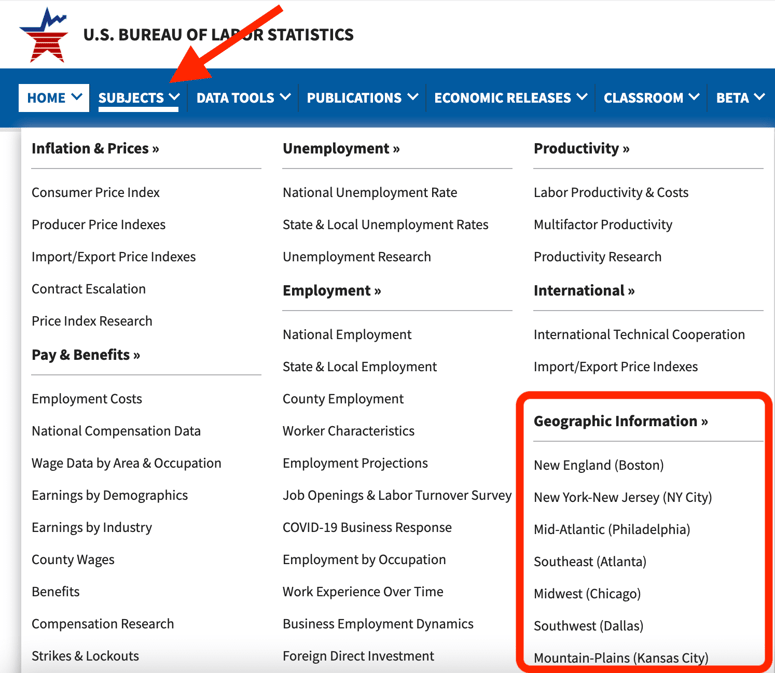
Select your region of interest, filter by state or metropolitan area (if necessary), and take a tour of BLS’ enormous library of area-specific data.
6. U.S. Census Bureau
On a mission to “serve as the [United States’] leading provider of quality data about its people and economy,” the U.S. Census Bureau is another terrific resource that costs nothing to use.
Just as we did with the BLS, we’ll focus on industry- and region-specific information. Admittedly, using the Census website to find industry-specific information is slightly more complicated than it is when using the BLS website. If you’re on the homepage and you hover over the Explore Data drop-down menu, you’ll see a hyperlink titled “Explore Data Main.”
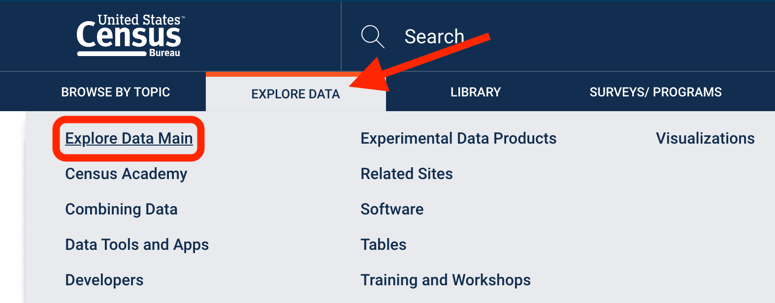
Click on that, and you’ll be brought to the Census’ search engine. Then, click inside the search bar and select “Advanced Search.”

Underneath “Find A Filter,” type in the name of the industry you’re interested in researching. Once the search suggestions load, simply check the appropriate box and click “Search.”
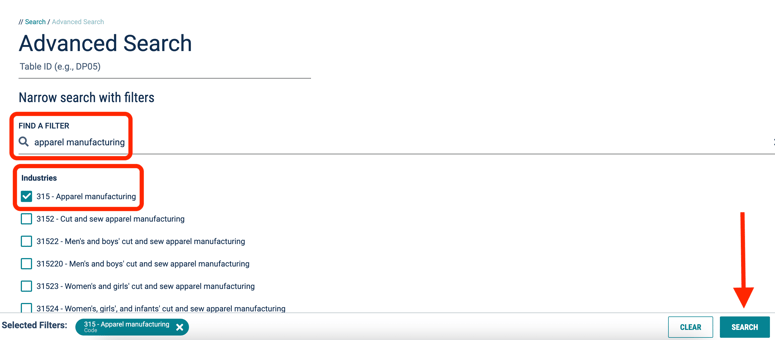
From there, you’ll be able to explore thousands of data tables, maps, and whitepapers — many of them chock-full of industry-specific information that you can use to your advantage.
Finding region-specific information is a bit more straightforward. Head back to the Advanced Search engine, select “Geography” from underneath Browse Filters, and go from there:
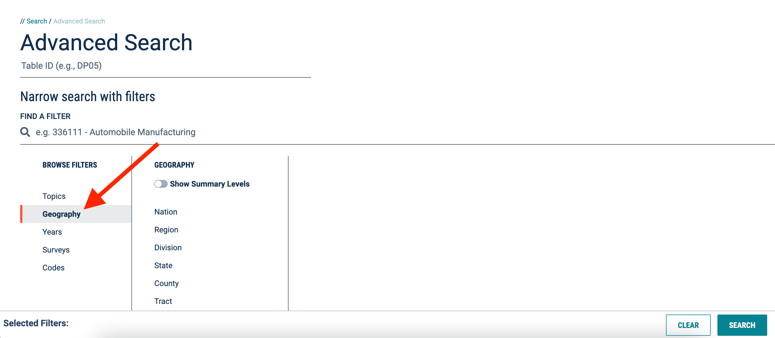
7. Pew Research Center
A nonprofit dedicated to “inform[ing] the public about the issues, attitudes, and trends shaping the world,” the Pew Research Center is one of the most authoritative sources of information for anyone striving to make better business decisions.
Whereas the BLS and the Census are (among other things) aggregators of economic data, the Pew Research Center is a “fact tank” — an organization focused on public opinion polling, demographic research, media content analysis, and other forms of social science inquiry.
So, although you can’t necessarily use Pew to uncover hyper-specific insights related to your industry or region, you can use it to learn more about your target audience. The best way to do this is through the Topics section of the Pew website.
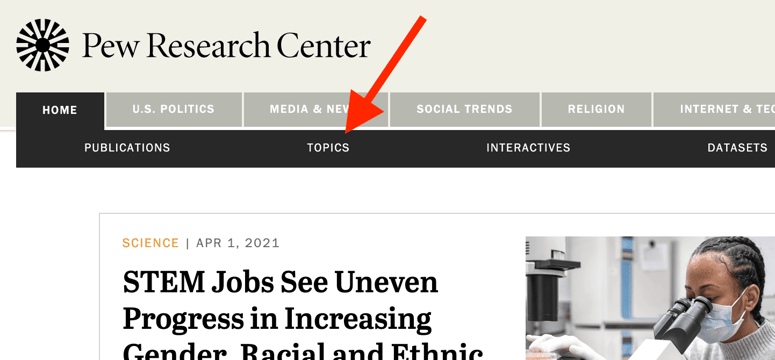
Clicking that hyperlink brings you to an index of dozens of topics, ranging from Online Video to Homeownership to Democracy. Selecting any of these topics will bring you to a list of relevant content — reports, fact tanks, transcripts, and other forms of media that can date back as far as the early 1980s.
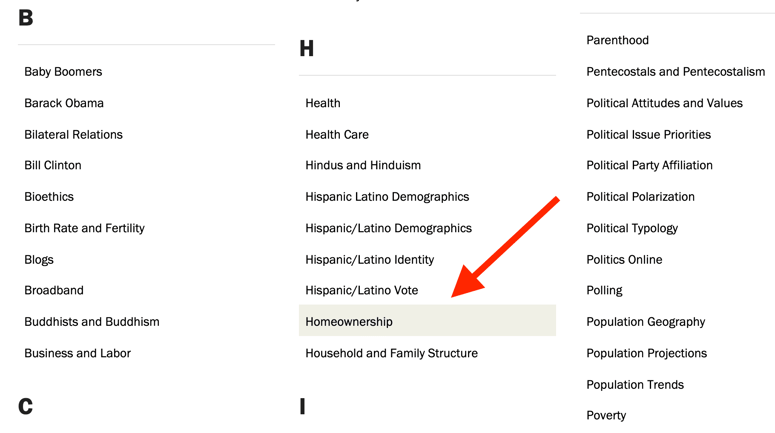
As an example, let’s say you’re developing a product or service that targets new homeowners. If you were to click on the Homeownership topic, you’d land on a list of reports like this one:

If I were you, that’s not a report I’d want to overlook!
We’ll wrap up today’s guide with a free resource specifically for those of you in the software world. Designed to help buyers determine which products are best suited to their needs, G2 is the leading source of validated, unbiased software reviews.
G2 is, in other words, an excellent way to find out what your target customers are saying about your competitors’ products. Do a quick search for the type of software you’re developing and you’re in business.
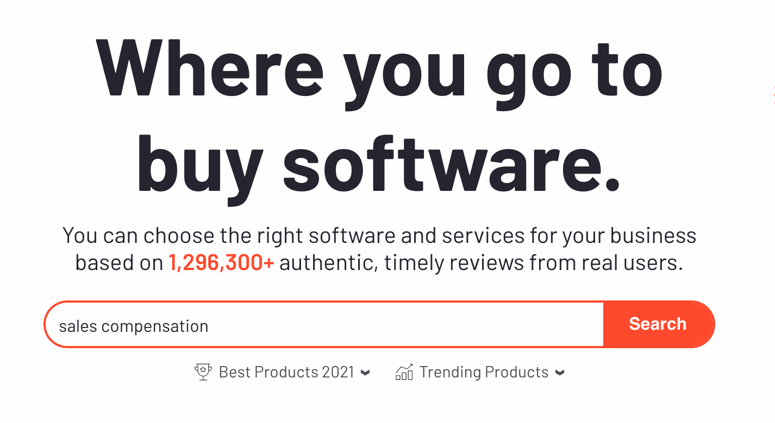
If you were developing a sales compensation software product and you searched this keyword, you’d be brought to the page you see below. To learn more about Spiff — one of your top-rated industry competitors — all you’d need to do is click “Read Spiff Reviews.”
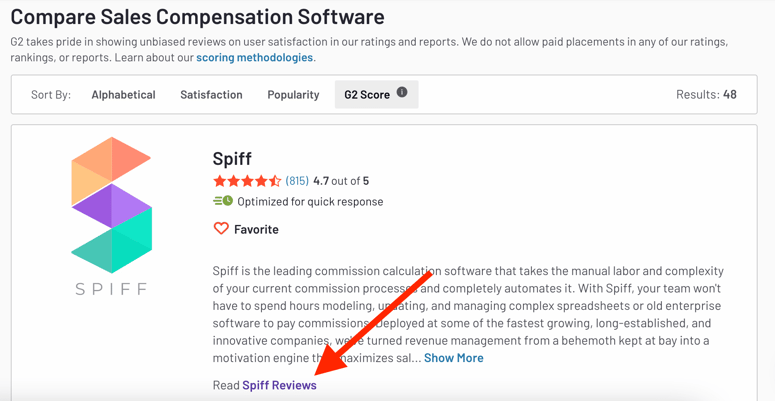
If you want to get granular, you can filter reviews in a number of different ways. As an example, let’s say you’re developing a sales compensation software product specifically for small businesses. G2 has the filter you’re looking for:
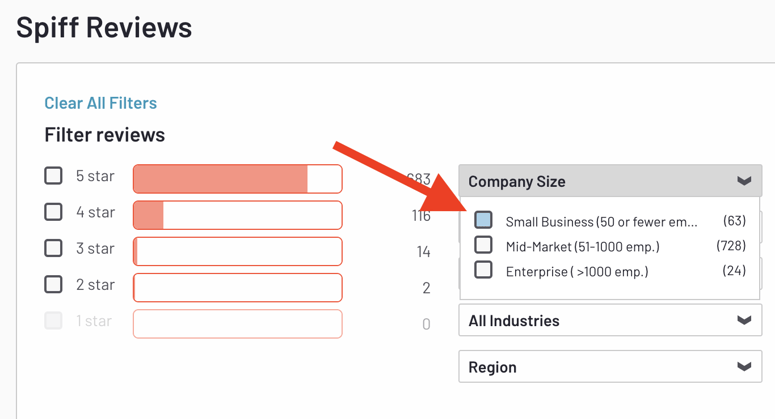
And just like that, you’ve got access to dozens of valuable insights like this one:
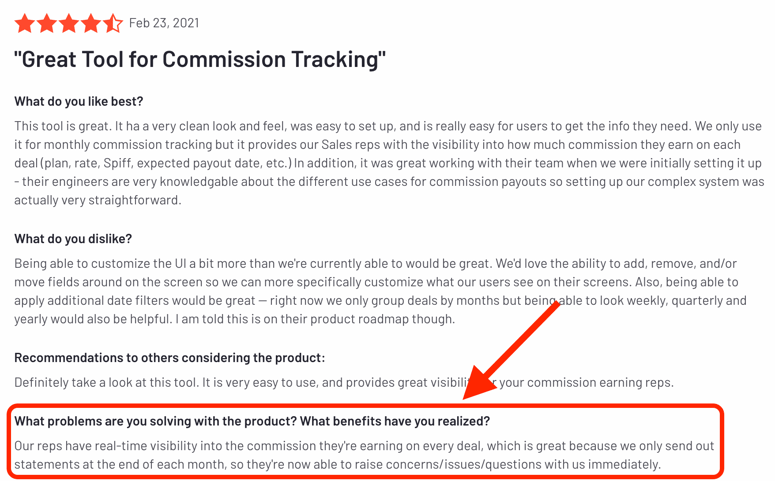
Start using market research tools today!
If you try to bring a product or service to market without an understanding of your target customers, your chances of success are slim. According to the most recent State of Competitive Intelligence Report , 84% of businesses say their industry has gotten more competitive in the last three years. With the range of choices at your prospects’ fingertips growing by the day, the need for a thorough market research strategy only intensifies.
We hope you find these free market research tools and resources useful. And if you decide to make the leap to a paid solution, make sure to request a demo of Crayon — the competitive intelligence platform that enables you to track, analyze, and act on everything happening outside your businesses’ four walls.

Seeing is believing! Check out Crayon for yourself.

Related Blog Posts
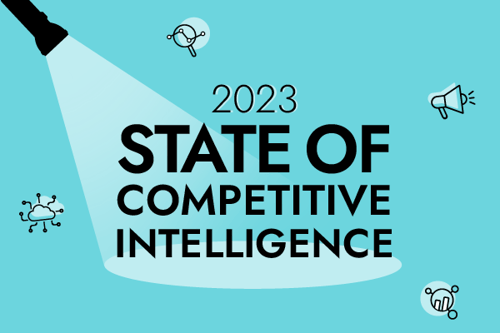
Popular Posts
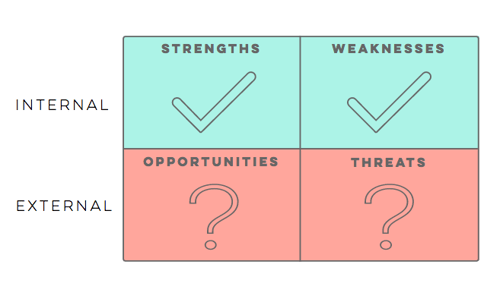

IMAGES